

Catherine Haughney, editor of Reader’s Digest, welcomes you to the January 2014 issue. Happy New Year!
Tell us what you think of this issue: theeditor@readersdigest.co.uk


Like us on Facebook: facebook.com/readersdigestuk
Follow us on twitter: twitter.com/rdigest
January 2014 Features

“I write about inspiring people all the time,” points out freelance writer Mike Peake. “But it still amazes me just how resilient we can be when the odds are stacked against us.” p42

“The long shadow with the fin moving through the water wasn’t supposed to be there,” says journalist Lisa Fitterman of her drama story. “Florida, maybe, or South Africa. But Russia?” p60

“This is something I’ve been wanting to get off my chest for a while,” says James Walton of his Maverick column. “And now that I have, I really do feel better.” p80
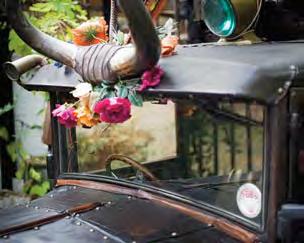
1 january 2014 readersdigest.co.uk 30 Reasons to Be Cheerful, Part 38 James Brown on the joys of mouthing off 34 Idris Elba The Luther actor talks about his most challenging role yet—Nelson Mandela Positively 2014 42 Smash Your Limits You’ll be amazed at what you can achieve if you put your mind to it 48 The Spirit of Goodwill How can we make this a year of optimism? 54 Secrets of the Super-Rich Multimillionaires reveal all 60 Shark Attack! It was just an ordinary holiday swim— and then they saw a fin... 66 Best of British: Classic Dishes When it comes to tasty morsels, our country has come a long way 74 Roger Taylor: “I Remember” Queen’s drummer on Freddie Mercury, dressing up and becoming a dad 80 The Maverick: “Your Opinion May Not Be Important to Us” argues writer and broadcaster James Walton 84 A Life Less Ordinary: The Man Who’s Got Everything Covered Step into the leather-clad world of Gavin Rookledge 92 Keeping the Faith The biggest religious festivals in the world 100 What’s Gone Wrong With Our Food? Why has trying to eat well become so complicated? 108 The Life Savers Both parents wanted to sacrifice all they could for their children, but would it be enough? 117 100-Word Story It’s your last chance to enter our short-story competition—you could win £1,000!
in
pal hansen (car) Stories featured on the cover are shown
red Meet Miss Hepburnella, a car with a difference p84
...at the front

Welcome to 2014! I love this time of year, when we say goodbye to the old and ring in the new. I have to confess, though, that I’m not very good at keeping resolutions, but our item on p118 has given me a several ideas about where I’ve been going wrong.
Mike Peake’s article “Smash Your Limits”, which kicks off our Positively 2014 section on p42, is equally thought-provoking. It’s definitely true that life seems easier if you focus on what you can do rather than on what you can’t.
But mostly a new year gives us the chance to look forward to the year ahead—and what a year this one promises to be: for football fans there’s the World Cup in Brazil, and then there are the Commonwealth Games in Glasgow, and that’s just on the sporting front. I for one can’t wait to see what 2014 will bring! A very happy new year to you all.


2 readersdigest.co.uk january 2014
Reader’s Digest is published in 17 languages around the world On our cover: Idris Elba by James Dimmock/August Catherine Haughney theeditor@readersdigest.co.uk facebook.com/readersdigestuk twitter.com/rdigest pinterest.com/readersdigestuk
9 Over to You… 13 Radar: Your Guide to January Film: Natalie Haynes Music: Stuart Maconie Gadgets: Olly Mann Sport: Andy Zaltzman 18 You Couldn’t Make It Up… 21 Word Power 24 Instant Expert: Champagne 28 If I Ruled the World: Giles Andreae ...at the back 118 1,001 Things Everyone Should Know 124 Medicine: Max Pemberton 126 Health: Susannah Hickling 130 Consumer: Donal MacIntyre 132 Money: Jasmine Birtles 136 Fast Food 138 Gardening 140 Motoring: Conor McNicholas 142 Travel: Kate Pettifer 144 The Reader’s Digest—our recommended reads of the month 149 Books That Changed My Life: Wendy Holden 152 Laugh! 156 RD Brain Teasers 160 Beat the Cartoonist! Regulars Welcome © 2013 Vivat Direct Ltd (t/a Reader’s Digest). British Reader’s Digest is published by Vivat Direct Ltd, 57 Broadwick Street, London W1F 9QS. All rights reserved throughout the world. Reproduction in any manner, in whole or part, in English or other languages, is prohibited. Reader’s Digest is a trademark owned and under license from The Reader’s Digest Association, Inc, and is registered with the United States Patent and Trademark Office. All rights reserved. Classified advertising by Madison Bell. Printed by Polestar Chantry, Polestar UK Print Ltd. Newstrade distribution by Mail Publishing Solutions. PUBLISHED BY VIVAT DIRECT LTD (T/A READER’S DIGEST), 57 BROADWICK STREET, LONDON W1F 9QS PAPER FROM SUSTAINABLE FORESTS PLEASE RECYCLE

Write On…
Send us your stories, jokes and letters—if we publish, we pay!
WE PAY
£50 for the star letter and £30 for regular letters.
Email readersletters@readersdigest.co.uk or go to readersdigest.co.uk/contact-us
EARN £50!






SUBSCRIBE!
£50 for the true stories, anecdotes, jokes in Laugh! and You Couldn’t Make It
Up…, and contributions to end-ofarticle fillers, Travel and Gardening
Email excerpts@readersdigest.co.uk or go to readersdigest.co.uk/contact-us
SMALL PRINT
Visit readersdigest.co.uk or write to Reader’s Digest, PO Box 444, Douglas, Isle of Man IM99 3ZF.
UK: £45.48 a year. Republic of Ireland: €61.20 a year. Europe: £50 a year. Rest of the world: £60 a year. Prices include delivery. For Gift Subscriptions contact Customer Services below
CUSTOMER SERVICES
Contact Customer Services for renewals, gifts, address changes, payments, account information and all other enquiries. Phone: 0871 351 1000 (Calls from a BT landline will cost 10p a minute. Call costs from other providers may vary.) Email: customer_ service@readersdigest.co.uk Minicom: 0870 600 1153.

twitter.com/rdigest

TALKING MAGAZINES
Reader’s Digest is available in a talking edition for blind and partially sighted people for £16. For details, phone: 01435 866 102; email: info@ tnauk.org.uk, website: tnauk.org.uk.
facebook.com/readersdigestuk

WE ALSO PAY SORRY!
Ensure submissions are not previously published. Include your name, email, address and daytime phone number with all correspondence. We may edit letters and use them in all print and electronic media. Contributions used become world copyright of Vivat Direct Ltd (t/a Reader’s Digest), 57 Broadwick Street, London W1F 9QS
We cannot acknowledge or return unpublished items or unsolicited article-length manuscripts. Do not send SAEs. Article-length stories, poetry and cartoons are not requested.
pinterest.com/readersdigestuk
4 READERSDIGEST.CO.UK JANUARY 2014
Have you seen our invisible hearing aid yet?
Our fantastic invisible hearing aid is small. Really small. And, because it fits slightly deeper in the ear canal than your average hearing aid, it’s virtually invisible when worn. That means you get all the benefits of hearing better without anyone understanding how you do it.
Whilst it can’t be seen the difference can be heard.
Just because this hearing aid is small doesn’t mean it’s less effective. We’ve made sure this tiny device has the high speed processors and clarity enhancing features of the very latest hearing aids. These are the things that make sure you get to enjoy all the great things life has to offer like conversations with friends and family, an evening out in your favourite restaurant or a cosy night in front of the TV. And you can enjoy all this with the confidence that whilst people might notice the difference in your hearing they definitely won’t notice your hearing aid.
If you like what you (don’t) see, call 0845 203 7662 and book a free appointment in store to find out more about this amazing little hearing aid.
“I hear normally, it’s as if I don’t have a loss and, because you can’t see them, no one else knows I do!”

Free hearing check
To book your hearing check simply call 0845 203 7662
Terms: Valid until 31 January 2014. Free hearing check for over 18s only. Only one free hearing check per year.


For more information please visit Bootshearingcare.com
No? Not at all? Exactly.
Take a look at our brand-new
At readersdigest.co.uk you’ll find…
+ Expert health advice

+ Great money-saving tips
Hundreds of healthycooking ideas and recipes
Easy-to-follow DIY tips
Gardening know-how
Fun and games, including Beat the Cartoonist and our famous online Word wer Challenge

Celebrity interviews
Offers and prizes galore— try our “Win an iPad Mini” competition for starters
Register for our special prize draw, sign up to our regular newsletters, and much, much more!








website! What are you waiting for? Come and join us online at readersdigest. co.uk!


Over to You...
emails, letters, tweets and facebOOk
£30 for eACH puBliSHed leTTer,
£50 for THe leTTer of THe monTH!
See p4 for more deTAilS

Letter of t h e Month

I agree with Vic Marks’s Maverick article arguing that the media fans hostility towards sports officials. At the end of the day, we couldn’t play the sport we love without officials. At a grass-roots level, some sports don’t even have the money to pay for them—they referee for the love of the game.
I’d like to see these commentators go through refereeing courses and officiate at some games, so they appreciate how hard it is. Professional officials do a lot of training; this must be standardised, so there’s no cause to question decisions. We also have the ability, with technology, to help officials as much as possible and prevent many errors.
Perhaps the media could channel its energies into supporting ways to bring in new technologies and ways of helping officials, so everyone is happy.
Sandra Turner, Hertfordshire
Vic Marks makes some good points about the lack of respect for officials in modern sport, but it’s the administrators who should shoulder the most blame.
The difference between rugby union, which has few problems, and football is that, in the former there’s zero-tolerance towards swearing and dissent—something football administrators have shied away from. Other ideas, such as stopping the clock when the ball isn’t in play and the operation of a sin bin, would also have a major impact on the enforcement of a respectful attitude.
Tim Coles, Bedfordshire
health scares
“What Happened to Swine Flu?” was a very informative and reassuring article—explaining what became of health scares after they slipped away from the headlines. I remember being rather concerned about swine flu, salmonella and CJD, but it seems the press regularly blows these worldwide health scares out of all proportion. Obviously there are concerns, but they shouldn’t be overdramatised.
Kira Aitkins, The Wirral
9 january 2014 readersdigest.co.uk
►
Over to You…

salim sayyid @salimsayyid

reader ’s digest is a great publication. It always has articles that are mentally stimulating.
looking for calm
I’ve been reading Susannah Hickling’s health article “Simple Stress Relievers” at bedtime. One night, after being woken by a banging outside and unable to get back to sleep, my mind turned to Susannah’s advice: “Do nothing. Take ten minutes… be content doing nothing.”
Sadly, instead of easing my stress, it increased it. While lying there doing nothing, all the things I hadn’t done rushed through my mind, leaving me more wound up than ever. Susannah did say that doing nothing is “harder than it sounds”, so maybe I need more practice. But I’m not sure when to fit it into my day…
Kevin Briggs, Shetland who for pm
Doctor Who’s suggestions in “If I Ruled the World” cheered me up, particularly his idea of giving out free money. I’d definitely vote for him. Now if only it were possible to make folding laundry more interesting, finding misplaced car keys more fun, taxes more engaging and study more impactful—we’d all walk round with smiles on our faces!
Abby Hardin, Carlisle
“doing nothing is harder than it sounds. Maybe i need Mor e practice”
unclear role
Thank you for your item “What Your Local Councillor Won’t Tell You” in “1,001 Things”. I should have read it before I complained about a fly-tipping neighbour— apparently it’s nothing to do with my councillor. And the lack of dog-waste bins in the park is nothing to do with him either. Nor are all the potholes in the road.
In fact, I’m not sure what my local councillor does at all.
deena Colworth, Cambridgeshire
dial a disease
Your Online column recently suggested using health apps to monitor our health. A good idea, you may think—but I’m not so sure.
By the time I left nursing, I had a new name for the NHS: the National Disease Industry. These apps will exacerbate the problem. For every disease diagnosed early, two will be created through worry and sleepless nights, checking our phones to see if our hearts are behaving and our blood-sugar levels are OK.
Stop fussing about your health—you’ll most likely live a longer and more satisfying life. neil Spence, forfar, Angus
lacking the will
“Five Reasons Why You Must Make a Will Right Now” in your Money section prompted me to ring my solicitor. I’ve kept putting
january 2014 10 readersdigest.co.uk 10

“We believe this woman to be a witch as she’s known to have expressed an opinion online”
it off, but discovering that the excess will be taxed at 40 per cent if my estate is worth more than £325,000 sent shivers down my spine.
I hadn’t realised how important it was to have a will in place—no one wants to hand money straight over to the taxman.
Adam Barnes, denbighshire
travel in peace
I read with great interest your article about travel insurance in a previous issue, especially your advice to check out the British Insurance Brokers’ Association (BIBA) website.
I’m 64 years old and have been in remission from cancer for over two years. I’d already applied to two travel-insurance companies specialising in insurance for preexisting medical conditions and had been turned down. BIBA
“stop fussing about your heaLth. you’LL Most LikeLy Li ve a Longer Life”
passed me to specialist cover company allcleartravel.co.uk, who asked for my details and the type of cancer I had. I said it was cancer of unknown primary, and although this wasn’t on their list, they eventually gave me a quote of £973 for 14 days in Portugal.
Buoyed by this, I contacted a travel agent called Waltham Travel and got a price of £39 for a single trip. This doesn’t cover any pre-existing conditions, but as I’ve been given a clean bill of health for the moment, I’m one very happy lady!
Cheryl Anderson, Hampshire
clarification:
Thanks again to Efat Mahbaz for sharing her extraordinary story with us (“Live Through This”, November). We’re sorry for misinterpreting her story in some places.
11 january 2014 readersdigest.co.uk
ANTON DU BEKE
The elegance of Ballroom at its best and the unmissable razzle dazzle of Broadway. Featuring classic hits
JANUARY

FEBRUARY
MARCH
THUR 16 JAN 7.30pm NORTHAMPTON ROYAL & DERNGATE 01604 624 811 FRI 17 JAN 7.30pm NORTHAMPTON ROYAL & DERNGATE 01604 624 811 SAT 18 JAN 3.00pm& 7.30pm GUILDFORD G LIVE 0844 7701 797 WED 22 JAN 7.30pm AYLESBURY WATERSIDE THEATRE 0844 871 7607 FRI 24 JAN 7.30pm BRIGHTON DOME 01273 709 709 SAT25JAN 7.30pm LONDON BARBICAN HALL 020 7638 8891 SUN 26 JAN 3.00pm SOUTHAMPTON MAYFLOWER THEATRE 02380 711811 TUES 28 JAN 7.30pm LIVERPOOL PHILHARMONIC HALL 0151 709 3789 WED 29 JAN 7.30pm STOKE VICTORIA HALL 0844 871 7649 FRI 31 JAN 7.30pm BELFAST WATERFRONT 028 9033 4455 SAT 1 FEB 3.15pm DUBLIN NATIONAL CONCERT HALL 01 417 0000 WED 5 FEB 3.00pm & 7.30pm CANTERBURY MARLOWE THEATRE 01227 787 787 SAT 8 FEB 7.30pm BIRMINGHAM SYMPHONY HALL 0121 345 0603 TUES 11 FEB 7.30pm BRISTOL HIPPODROME 0844 871 3012 WED 12 FEB 7.30pm CARDIFF ST. DAVID’S HALL 029 2087 8444 FRI 14 FEB 7.30pm DUNDEE CAIRD HALL 01382 434 940 SAT15FEB 7.30pm EDINBURGH USHER HALL 0131 228 1155 SUN16 FEB 3.00pm GLASGOW ROYAL CONCERT HALL 0141 353 8000 FRI 21 FEB 7.30pm LEICESTER DE MONTFORT HALL 0116 233 3111 SAT 22 FEB 3.00pm& 7.45pm BASINGSTOKE THE ANVIL 01256 844 244 SUN 23 FEB 3.00pm& 7.30pm BOURNEMOUTH PAVILION THEATRE 0844 576 3000 THUR 27 FEB 7.30pm SHEFFIELD CITY HALL 0114 2 789 789 SAT 1 MARCH 3.00pm& 7.30pm MANCHESTER THE BRIDGEWATER HALL 0844 907 9000 SUN 2 MARCH 3.00pm & 7.30pm GATESHEAD THE SAGE 0191 443 4661 THUR6 MARCH 2.30pm EASTBOURNE CONGRESS THEATRE 01323 412 000 SAT 8 MARCH 7.30pm READING THE HEXAGON 0118 960 6060 SUN 9 MARCH 3.00pm BIRMINGHAM SYMPHONY HALL 0121 345 0603 WED 12 MARCH 7.30pm WATFORD COLOSSEUM 0845 075 3993 FRI 14 MARCH 7.30pm DERBY ASSEMBLY ROOMS 01332 255 800 SAT 15 MARCH 3.00pm& 7.30pm YORK BARBICAN 0844 854 2757 FRI 28 MARCH 7.30pm CROYDON FAIRFIELD HALLS 020 8688 9291 SAT 29 MARCH 7.30pm PORTSMOUTH GUILD HALL 0844 847 2362 SUN 30 MARCH 3.00pm MILTON KEYNES THEATRE 0844 871 7652 BEST SEATS AVAILABLE raymondgubbay.co.uk (subjectj to bkg fee)
BALLROOM TO
WITH SPECIAL GUEST
BROADWAY
SUMMER STRALLEN
YOU’RE THE TOP ANYTHING GOES BEGIN THE BEGUINE RHYTHM OF LIFE HUSHABYE MOUNTAIN IMPOSSIBLE DREAM LANCE ELLINGTON lead vocalist RICHARD BALCOMBE conductor FAYE HUDDLESTON ballroom partner with world class ENSEMBLE DANCERS and the RAYMOND GUBBAY BIG BAND ORCHESTRA RAYMOND GUBBAY presents
r a d ar
your short, sharp guide to january

Film
 Author and BBC4 Review Show critic Natalie Haynes on the new
Author and BBC4 Review Show critic Natalie Haynes on the new
in cinemas
Inside Llewyn Davis January is always a good month for grown-up movies as the studios make their big push towards the Oscars. This film is, for me, already one of this year’s high points. Written and directed by the Coen brothers, who can’t make a boring film, it continues the idiosyncratic, quirky form that’s seen them scoop up Oscar nods with a thriller (No Country for Old Men), a Western (True Grit) and a bleakly comic

Jewish folk tale (A Serious Man) in recent years.
Llewyn (Oscar Isaac) is a folk singer and guitarist trying to carve out a career in Greenwich Village, New York, in 1961. But it’s not an easy life, even with Justin Timberlake and Carey Mulligan (below) as friends and fellow musicians.
The Coens have often made music the heart of a film— most notably with O Brother, Where Art Thou?, which married George Clooney and bluegrass to glorious effect. T Bone Burnett produced the music here, which is always a treat.
january 2014 readersdigest.co.uk 13
Folk tales: Oscar Isaac (left) and Justin Timberlake trade guitar licks
►
Her I’ve often lost patience with rom-coms over the last few years—too many man-children, too many shrewish women and not enough com for the rom. But Spike Jonze (director of Being John Malkovich and Adaptation) has entered the fray and brought something rare to the genre: a genuinely sweet, oddball film.
Joaquin Phoenix is Theodore, a man who writes intensely personal love letters for a living but whose own private life has taken a sad turn after his wife Catherine (Rooney Mara) left him. He lives an almost completely isolated existence— only his friends Amy and Charles down the hall provide him with company. He spends his evenings playing video games and talking to his computer.

and natalie’s pick of the dvds


Then, one day, he gets a new operating system that has a thoroughly human outlook on life, and the voice of Scarlett Johansson. It becomes the ultimate marriage between man and machine.

reader radar
Laura Payne, 45, company director
Listening: Tape Deck Heart by Frank Turner It’s very easy listening, but a great diversion when you’re in the car.
Reading: The Hunger Games
trilogy by Suzanne Collins
These stories about televised fights to the death between poor teenagers make you think.
Rush Chris Hemsworth and Daniel Brühl thrill as rivals James Hunt and Niki Lauda, as both men try to win the 1976 Formula 1 championship. Sunshine on Leith Dexter Fletcher directs this big-hearted love story, based on the hit musical inspired by The Proclaimers.
Is that the way The X Factor will go eventually?
Online: groupon.co.uk Gets you savings on everything from cookery classes to massages.
Watching: Never Mind the Buzzcocks (BBC2) A consistently funny way to spend the evening during the working week.
14 readersdigest.co.uk january 2014
r a d ar
Lonely soul: Joaquin Phoenix in Her


Music

BBC 6
Music’s Stuart Maconie’s pick of the recent releases
Tuck Box by Nick Drake Think the A E Housman of British folk/pop
Firstly, ignore the awful title (the cover depicts Drake’s own tuck box from his Marlborough College schooldays), which plays into the hands of every “Is there honey still for tea?” cliché about British pastoral pop. And try to overlook the fact that Nick Drake has gone from being lamentably ignored to wilfully over-anthologised. This collection of the great lost singer’s work—he died in 1974— contains everything you could want: his three beautiful albums and lots of extras give you a flavour of why he embodies the doomed minstrel and has come to be so revered.

Join the Dots by Toy Think The Cure meets Kasabian After a false start as the underachieving, lousily
monikered and much-hyped Joe Lean & the Jing Jang Jong, most of that act went on to form Toy, a much darker proposition riding a wave of all things psychedelic and gothy. Their second album takes up where their first left off, but a solid couple of years on the road have refined this to very saleable modern rock noise that could fill a stadium or two.

Man on the Rocks by Mike Oldfield Think a rocking midlife crisis The elation of performing centre stage at the Olympics opening ceremony—where Tubular Bells was used to pay tribute to another national treasure, the NHS —seems to have galvanised Oldfield. Having said he’d never release any new music, his 25th album and first new material for five years finds him bullish and driven. The lyrics, though, tell a story of personal trauma, introspection and the natural disasters that have befallen his Bahamian home, where he recorded some of this album. A spirited if slick return to the fray.
15 january 2014 readersdigest.co.uk
►
Gadgets

Technology expert, BBC 5 Live presenter and Answer Me This! podcaster
Olly Mann reveals the latest must-haves
Parrot Flower Power, £49.99
When you’ve inadvertently murdered as many pot plants as I have, you need all the help you can get. Slip this sensor into your soil to send your smartphone a wealth of data, allowing you to monitor your plant’s moisture and sunlight levels, temperature and humidity. Parrot probably developed this to boost brand awareness—they’re best known for making bluetooth headsets, which hardly attract as many column inches as this sort of caper. But it’s worth trying out if you fancy a glimpse into the connected home of the future. also on our radar…
January 1–31
National Detox Month
January 10
Tintin turns 85
January 10–12
London Ice
Sculpting Festival, Canary Wharf
January 17–19
TopGear Live, SECC, Glasgow
January 27
Holocaust Memorial Day
January 28
Costa Book of the Year Award


Motorola Moto G, £149.99
At first glance, this appears to contain nothing terribly special for a top-end smartphone: a quadcore processor, a bright edge-toedge display, a guaranteed upgrade to the latest Android operating system, a curved and easy-to-grip case. But this isn’t a top-end smartphone—it’s a budget

smartphone. The only giveaways are that it’s a little heavy, it lacks a distinctive design and its 5MP camera is merely adequate. But if you want a modern, Google-centred handset, this is responsive, uncluttered and faster than some premium phones three times its price.
iPad Air, from £399
Thinner and lighter than ever, yet boasting an extended battery life, Apple maintain their place at the top of the tablet table for another year. and check out…

Roku 3, £99.99
This discreet box of tricks effortlessly turns your dumb old TV into a smart system, so you can watch Netflix, iPlayer, Now TV and Demand 5 in glorious HD (internet connection required).
16
r a d ar
readersdigest.co.uk january 2014


Sport

ESPNcricinfo cricket blogger, broadcaster and stand-up comedian Andy Zaltzman previews the best of the month’s action
PDC World Championship darts
final, Alexandra Palace, January 1
The planet’s leading exponents of nanojavelins seek to dethrone Phil Taylor, the indisputable Ozymandias of the Oche, who won his 16th world title last year. Darts is a sport that reveals the mental fractures of pressure more nakedly than any other— no one can blame the wind, pitch, referee, crossbar or horse when their form suddenly destroys itself. But Taylor is unbreakable. If you put him 7ft 9¼in away from a dartboard with a peckish man-eating lion next to him, Taylor will throw 180 and the lion will order a takeaway.

Atlanta Hawks v Brooklyn Nets basketball, the 02, London, January 16 The NBA returns to the capital for another evening of lolloping long-limbed slamdunkage, as the Hawks and the Nets—both first-round play-off losers last season—trade boings and bounces in what may (or
may not) prove to be the most important of their 81 regular season games.
Third Lusophony Games, Goa, January 18–29 If you’ve ever watched the Olympics and thought to yourself, This is OK, but it’s really being spoiled by the number of competitors from non-Portuguese-speaking countries, then these games are for you. Bringing together athletes from Lusophonic hotbeds such as Guinea-Bissau, East Timor and Macau, as well as headline acts Portugal and Brazil, these games are exactly what the likes of Vasco da Gama and Ferdie Magellan had in mind when they set sail from Europe, with some ping-pong bats, volleyball nets and taekwondo helmets stowed excitedly in their magic ships.
Football transfer window Can the Premier League break its existing record of 1.2 transfers per 100 rumours, set in the unforgettable 2007 window? n
17 january 2014 readersdigest.co.uk
GETTY IMAGES; AFP/GETTY IMAGES
Phil Taylor, powering to yet another win
You Couldn’t Make It Up…
¶ I was standIng at a bus stop In the raIn along with two elderly ladies, who were chatting about the old days. A bus eventually pulled up and the first lady stepped on board. After an age spent rummaging through her purse, she announced to the driver that she’d have to pay in stamps because she didn’t have enough cash.
The driver apologised, explaining that it wasn’t company policy to accept stamps as payment. The second lady then piped up behind her, saying that stamps were legal tender and the driver was obliged to accept them. After a bit of back and forth, the driver conceded the point and the first lady sat down triumphantly.
However, the satisfied look on the second lady’s face was soon wiped off when she got the five second-class stamps in her change.
Rob Smith, York

¶ An old uncle of mine asked if I wanted a bottle of red wine someone had given him for Christmas. He said he didn’t know much about wine as he’d always been a beer drinker.
When I asked him what type it was, he replied, “I know it’s a good one—it’s a clarinet.”
Barrie Marklew, Yorkshire
¶ My friend’s granddaughter Emily and her pal Joanne were playing pretend cafes, complete with aprons and fake menus.
“Your tweet, m’lud”
All was well until Joanne’s younger sister tried to join in. Appearing in the kitchen in tears, the little girl explained that they’d told her she was too young and they didn’t want her in the bedroom, where the cafe had been set up.
Reassuring her that it must have been a mistake, my friend took the child upstairs—only to be confronted by a notice on the door saying STAFF ONLY.
Jennifer Armes, Norfolk
¶ My father, who’s a rector, was having car trouble, so he called the garage for a tow truck. When it arrived, my father said, “I hope it won’t be too expensive—I’m only a poor rector.”
“Yes, I know,” replied the mechanic. “I’ve been to several of your services.”
Lois Jones, Clwyd
18 readersdigest.co.uk january 2014
¶ I caught my son Luca with his felt pens and my kitchen towels—he was halfway through drawing on each one.
When I asked him why, he retorted that I was always moaning that I couldn’t afford the patterned ones, so he’d thought he’d surprise me.
Joanna Aitch, Wirral
¶ My very attractive 20-year-old PA came into my office, perched on the edge of my desk and asked if it was true that my girlfriend and I had split up.
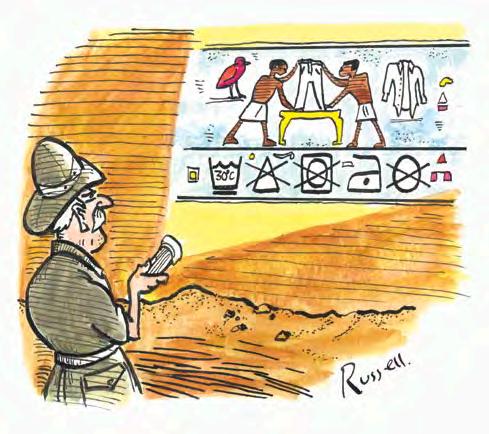
When I confirmed it, she smiled and asked if I was ready to start seeing anyone else. As a 38-year-old male, my ego was doing somersaults, but my conscience questioned whether a relationship between us would be appropriate. I decided to let her down gently by saying that it was too soon for me to be involved with someone again.
¶ on a recent holIdaY to Crete, my husband and I visited the fascinating island of Spinalonga, which had been a leper colony until the late 1950s.
Returning to our hotel,
Win £50 for your true, funny stories. go to readers digest.co.uk/ contact-us or facebook. com/readers digestuk
She smiled and said, “That’s a real pity—I think you’d be just right for my mum.”
Rob Lloyd, by email
¶ “I’m going to visit Liverpool tomorrow,” I told my three-yearold grandson.
After a moment’s hesitation, my grandson asked, “Where does Liverpool live?”
Christine Edney, East Sussex
we enthused about our trip to another couple who decided to visit the island the next day. But we were surprised when they returned from their outing looking slightly crestfallen.
“What did you think of it?” I asked.
The man replied: “Yeah, it was OK, I suppose. But we didn’t see any leopards.”
Stacey Murray, Derbyshire n
19 readersdigest.co.uk january 2014













SINGLE TRIP POLICIES. Get insured quickly and easily for those once in a lifetime adventures CRUISE COVER Includes Missed Port & Cabin Con nement cover ANNUAL POLICIES. Convenient cover for multiple trips throughout the year Travel insurance ALL medical conditions considered AWARD WINNING customer service Up to £10 million medical cover NO upper age limit To purchase a policy or to get a full quotation, call us on or visit readersdigest.co.uk for more information Readers Digest Travel Insurance is provided by Avanti Travel Insurance, a trading style of Avanti Insurance Limited, registered in England (Company number 03882026). Registered O ce: Century House, Century Drive, Braintree, Essex, CM77 8YG. Avanti Insurance Limited is authorised and regulated by the Financial Conduct Authority (FCA Registration number 599282). 0800 292 2742
Word Power
Indulge your competitive streak

1 aficionado n
A referee B expert C buff
2 kayo n
A knockout B batter’s swing C cycling stadium
3 slam dunk n
A lopsided win B very unsporting behaviour
C basketball manoeuvre
4 gambit n
A single innings B opening sacrifice C intense rival
5 arbitrate v
A to protest B serve as umpire C settle for a tie
6 chaff v
A to tease B foul an opponent C discard
This month sees the 27th Tough Guy obstacle race, regarded as the world’s most demanding one-day survival ordeal. So if competition is your thing, test your sporting and gaming vocabulary by answering A, B or C below.
9 huddle n
A rugby scrum B gathering of a team C score sheet
10 baize n
A pool-table fabric B longrange pass C sailing boat
11 rope-a-dope n
A boxing tactic B type of raffle C tight game
12 cat’s game n
A tie in noughts and crosses B modern board game C yo-yo trick
13 token n
A loss of a turn B signal to a partner C game piece
7 grind n
A overtaking manoeuvre
B wild celebration
C sliding stunt
8 see v
A to match a bet
B leapfrog over
C qualify for a final
14 ringer n
A trump card B fraudulent substitute C section of a fairway
15 hat-trick n
A amazing catch B three wickets (or goals) in a row
C “grand slam” in tennis ►
A word is born Deskfast
As life gets busy, you may find yourself wondering when you last sat at your kitchen table and ate a proper breakfast, rather than a “deskfast”—one consumed at your office desk. RD Rating: Useful? 2/10 Likeable? 7/10
 Words by Emily Cox and Henry Rathvon
Words by Emily Cox and Henry Rathvon
21
RANALD MACKECHNIE/THE IMAGE BANK/GETTY IMAGES
Word Power Answers
9–11 getting there
12–13 impressive 14–15 word-power wizard!
1 aficionado C buff. “A nascent fishing aficionado, Jonathan insists on using spinning lures instead of worms as bait.” Spanish aficioner (become fond of).
2 kayo A
Abbreviation of knockout. “The fight finished in Round 7 with a kayo.”
3 slam dunk C basketball manoeuvre. “A slam dunk is when a player thrusts the ball down through the basket.” Imitative.
4 gambit—B opening sacrifice. “That sneaky gambit might earn you a quick win.” Italian gambetto (tripping up).
5 arbitrate—B serve as umpire. “When an argument broke out, the coach stepped in to arbitrate.” Latin arbiter (judge, supreme ruler).
6 chaff A tease. “Chloe chaffs Alex each time she beats him at badminton.” Old English ceaf (gnaw).
7 grind C sliding stunt. “The young skateboarder loves to grind along the pavement.” Old English grindan.

8 see A match, as with a poker bet. “I’ll see your bet and I’ll raise you.” Old English seon
9 huddle—B gathering of a team. “We formed a huddle on the pitch.” Origin unknown.
10 baize A pool-table fabric. “Eddie is such a snooker fanatic that his flat is carpeted in baize.” French.
11 rope-a-dope A boxing tactic. “The fighter adopted the ropea-dope to tire out his opponent.” Devised by Muhammad Ali, who used the strategy to beat George Foreman in 1974.
Play WP online: go to readersdigest.co.uk/ fun-games/competitions/ wordpower
Why calculate?
This term derives from the Latin calculus, which originally referred to pebbles (calcis being the word for limestone). In ancient Rome, basic arithmetic was done using an abacus, a device in which pebbles were placed within a counting frame, enabling the user to work out their sums.
12 cat’s game A tie in noughts and crosses. “It took a careless move to break the series of cat’s games.” Refers to a cat chasing its own tail and never catching it.
13 token C game piece. “We play Ludo with buttons because the proper tokens are lost.” Old English tacen (symbol).
14 ringer—B fraudulent substitute. “The jockey in the amateur race turned out to be a ringer.” As in “exchange” (“ring the changes”).
15 hat-trick B three wickets in a row in cricket. When bowler H H Stephenson achieved this feat in 1858, a collection was held and a hat bought from the proceeds. n
22 readersdigest.co.uk january 2014



























































Sale Price £599.00 was £760.00
Instant Expert: Champagne
As the corks pop for 2014, Jayne Powell takes a sparkling look at
The real thing
Sparkling wine can come from anywhere, but true champagne comes only from the Champagne region of north-eastern France. The area has chalky soil, which means the vines have to work doubly hard to bury their roots, while its cooler climate means the fruit takes longer to ripen. The combination of these factors gives the grapes higher acid levels, adding finesse to the resulting wine.

French sparkling wine goes back at least as far as 1662 (see timeline overleaf), but the breakthrough came when the monk Dom Pierre Pérignon became the cellar master at Hautvillers Abbey in 1668. Pérignon discovered how to improve Champagne’s wines by processing the grapes from different villages separately and blending the final product from many different components. In doing so, he created champagne as we know it—although until 1700 bubbles were generally considered a flaw, and Pérignon tried in vain to eradicate them.
By the end of the 19th century, champagne had become synonymous with sparkle, and its bubbles signified celebrations of all sorts, including births, marriages and the launching of ships.

Dom Pérignon: the monk with the fizz
The science bit
Fermentation converts sugar into alcohol and dissolved carbon dioxide. If the gas escapes, the wine is still; if not, it’s sparkling.
After it’s been aged for at least 15 months, the last step in making champagne is dégorgement, which removes the dead yeast residue. The necks of the bottles are plunged upside down in minus 20C brine, creating a small ice plug that traps the sediment. The bottles are then righted, the caps removed and the plugs shoot out. To replace any wine lost, the bottles are topped up with liqueur d’expédition, a mix of dissolved sugar and old wine.
And the creator of the process? The widow—or in French “veuve”—Clicquot (see timeline overleaf).
Philli PP e h uguen/AFP/ g etty i m A ges; thinks tock
everybody’s favourite celebratory drink
By the numbers
■ A champagne cork can reach 40mph as it leaves the bottle. The longest recorded flight of a cork is 77 feet.
■ There are two million bubbles in the average glass of champagne.

■ The British are the world’s second biggest consumers of champagne, after the French. The fastestgrowing market, perhaps surprisingly, is Nigeria.

■ The largest bottle size, a Melchizedek, contains the equivalent of 40 standard bottles.
Champagne decoded

Non-vintage About 80 to 90 per cent of champagne is non-vintage—a blend of various wines from the current harvest plus reserve wines from other years.
Vintage Made from grapes harvested in the year shown on the bottle. No vintage will be produced in a year when the grape quality isn’t high enough. Blanc de Blancs Made from 100 per cent chardonnay grapes, rather than pinot grapes.
Brut Less sugar is added after dégorgement, so the wine is drier. extra brut and brut zero are the driest of all.
Doing it properly
To open a bottle without taking anyone’s eye out, unwrap the foil and, holding your fingers or a cloth over the cork, untwist the muselet (wire hood). Then, gripping the cork firmly, gently turn the bottle, not the cork. That way, you should ease out the cork without losing any precious liquid. As for glasses, a tall, narrow flute is better than the flat, wide kind for appreciating the bubbles and aromas.


25 january 2014 readersdigest.co.uk
film Old
’’
wrong glass ► ‘‘
There comes a time in every woman’s life when the only thing that helps is a glass of champagne Bette Davis, in the 1943
Acquaintance
Right mood,
Instant Expert: Champagne

Vine Art: a Champagne Timeline
AD79 After the eruption of Mount Vesuvius has left Roman vineyards in ruins, Emperor Domitian orders that new ones be created in the province of Gaul (modern France). Much arable land, including in Champagne, moves from cultivating cereal crops to growing grapes.
AD496 Clovis, later to become the first king of the Franks, is baptised in Reims, the capital of the Champagne region. The local wine—at the time a thin red variety—is used during the
ceremony, giving us the first ever reference to champagne as a drink.
1662 Six years before Dom Pérignon even sets foot in the region of Champagne, Christopher Merrett, an English scientist, presents a paper on the production of sparkling wine to the newly formed Royal Society in London.

1743 With the taste for sparkling wine increasing,
Moët and Chandon is founded. By 1750, it’s supplying champagne to the French royal court. 1805 Barbe-Nicole Clicquot takes over her husband’s champagne house after his death. The 27-year-old Veuve Clicquot proves an astute businesswoman. 1867 English music hall performer George Leybourne writes
“I’d like to thank Emperor Domitian”: Rafa Nadal with a celebratory bottle

re A dersdigest.co.uk JA nu A r y 2014
getty
ges
im A

“Champagne Charlie”—a song which becomes, and remains, hugely popular.
1936 Moët launches Dom Pérignon, the world’s first cuvée de prestige champagne (meaning that it’s made from the very best grapes).
2007 329 million bottles of champagne are sold around the world.
2009 With the global recession, sales flatten to about 293 million bottles.
2013 The latest figures in Britain confirm that consumers are increasingly drawn to cheaper alternatives—as sales of Italian sparkling wine Prosecco beat those of champagne for the first time.


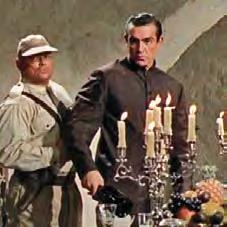
The feeling of friendship is like that of being comfortably filled with roast beef; love, like being enlivened with champagne
James Boswell, diarist ’’
On-screen fizz
For all his fastidiousness about Martinis, James Bond is one of pop culture’s great champagne devotees. In Dr No (left), Bond is captive in the title character’s lair. Casting about for a weapon, he picks up the first thing to hand: a bottle. “That’s a Dom Pérignon ’55,” exclaims Dr No. “It would be a pity to break it.”
“I prefer the Dom ’53 myself,” retorts Bond, who puts the bottle back unharmed. Less classy, but just as memorable, Eddy and Patsy in Absolutely Fabulous (right) swig champagne in every episode.

Jayne Powell (aka Champagne Jayne) is the author of Champagne Behind the Bubbles and has been writing about the subject for 20 years. She’s also appeared on ITV1’s This Morning
27 january 2014 readersdigest.co.uk
t itmuss/Al A my ( P icking); kA rlsson/B k Wine.c om/Al A my (sign)
‘‘ Peter
Giles Andreae If I Ruled the World
Giles Andreae is the creator of the stickman poet Purple Ronnie and the greetings-card philosopher Edward Monkton. He’s also the acclaimed author of numerous children’s books, including the international best-seller Giraffes Can’t Dance.
I’d introduce happiness lessons for primary-school children. There are two fundamentals for living a productive and joyful life—love and happiness. There are ways to teach and engender happiness (I’ve done sessions in schools myself), and it’s so relevant today in our celebrityand money-driven culture. Children are growing up wanting to become rich and famous, which is a dangerous game. How wonderful instead to bring up a generation of children who understand that true happiness lies along a very different path.
Once I’d sorted out all the tricky stuff like poverty and wars, I’d do away with all automated answering systems and banish the lie, “Please hold, your call is important to us.” Imagine a world where every call you made was answered by a nice, polite human being with a brain. This might go a long way to solving unemployment too. Is that too utopian?
I’d ban anyone from holding an opinion for more than six months without re-evaluating it. Men are the worst offenders; they seem to think it’s appropriate and manly to bully people


with their alpha opinions while revelling in the self-satisfaction of their so-called wisdom. Wisdom is very important, but it comes from listening more than talking and thinking more than knowing.
The most valued attribute would be kindness. That may sound like hippy tosh, but I’m not afraid to say it. I had a T-shirt printed that says, “Everybody Be Kind to Everybody Else”. I love wearing it because people always smile at me. There are examples of movements that have shown just how powerful the kindness drug can be. Random Acts of Kindness encourages
28 readersdigest.co.uk january 2014
illustrated by sam falconer
people to do things for others without expecting thanks, but to enjoy feeling good about themselves. Another movement is Free Hugs, which was started by an Australian who’d returned home with nothing to give but love. Now lots of people write those words on a board and dispense hugs all over the world.
Everyone would be required to have a job that they could explain to a five-year-old in less than five words. For example, I’m a postman, I repair lawnmowers, I sort out people’s taxes. This way everyone would have to do something useful and productive. Like the guy I recently saw cleaning the toilets in a service station who was working with such vigour and pride that I wanted to hug him. I hoped he was going home to his wife later to say, “Work was brilliant today, the toilets are all sparkling!”
Jobs that wouldn’t be allowed include, “I’m in charge of reverse hostile takeovers and mergers in oil and gas futures and derivatives markets,” and other nonsense. Or anything to do with hedges that didn’t involve planting or trimming them.
One night a week there would be no television. Instead, I’d provide huge numbers of free lessons in how to do things like arts and crafts. People would bring along someone else in their community who might need a friend and everyone would get lost in the pleasure of
“Cruising round a garden and marvelling at a snail is pretty cool”
concentrating on learning something new.
Any electronic device owned by a child under 13 would shut down after 30 minutes of use. It could start up again, but it might go some way to stopping the addiction that I see all around me. So many kids are guilty of watching television while also being on their phones and laptops, and that feels so wrong.
I’d do away with formulaic middleclass conversation. Those times when you know exactly what the other person is going to say about schools and house prices result in very tedious exchanges. If I’m going to leave my family or work or even something good on the telly to engage in adult conversation, it needs to be on an original and authentic level.
Everyone over the age of 30 must regularly watch a two-year-old play in a garden. They’d see how much inquisitiveness and wonder a toddler has for the world and hopefully share some of it. Kids are incredible in all sorts of ways, but cruising round a garden and marvelling at a snail is definitely pretty cool. ■ As told to Caroline Hutton
Giles Andreae’s latest book I Love You, Father Christmas is out now.
29 january 2014 readersdigest.co.uk
Reasons to Be Cheerful 38
Only in politics or the media can you get paid just to turn
A lady called Katherine from the New Forest recently sent a text to talkSPORT that read, “I don’t know anything about football, but I’ve spent all morning in my kitchen laughing along to your show whilst roasting some fennel.”
For a text to a sports radio station, it was pretty unusual. When you think of football, you generally think pies and beer, not roasted fennel. You think
football out of football.” The three of us who present the show—Johnny, Gavin Woods and I—have managed to tap into the reality that for most match-going fans the football is unmentionable because your team’s hopeless and you know you’re going to lose.
The show is broadcast on Saturdays between 11am and 1pm and our aim is to make sure that anyone travelling to a

Liverpool, Newcastle, Manchester, not the New Forest. But to the producers and presenters of The Warm-Up with Johnny Vaughan , it was music to our ears—because we’ve created a pretty unusual show. If it appeals to the fennel roasters of rural Hampshire, we must be doing something right.
Johnny’s catchphrase is “Don’t let the football ruin a good day out at the football,” sometimes shortened to “Kick
game is distracted from the misery that will surely descend on them by 4.50pm.
It’s a football show where the normal masses of stats and information are totally ignored. We’re the radio equivalent of three men trapped in a car on a motorway talking rubbish to each other.
As work goes, it’s a very big reason to be cheerful. Unless you go into politics, the media is the only place you can
30 readersdigest.co.uk january 2014
Radio Activity
up and mouth off, says James Brown

get paid just to turn up and mouth off. And as long as it’s vaguely connected to the concept of sport and it makes us laugh, that’s virtually all we have to do.
Some interviewees take a while to realise we’re not interested in what they think of the England team. We just want to know what they have for breakfast on match day and whether they have any pre-match rituals.
by a herd of cows in a field in Hereford an hour or two before an away fixture was due to kick off.
There was something quite moving about the way Bassett told us he liked to go for a jog so as not to get on the players’ nerves on match day—only this time, he found himself in the countryside with no idea where he was or why cows were

Apart from former England midfielder Carlton Palmer doing his interview in his bath—he was turning the hot tap on and off with his toes—and ex-Peterborough manager Barry Fry describing in some detail how he recently delivered his daughter’s baby, my favourite moment came from Dave Bassett. The talkative former manager of Wimbledon and Sheffield United admitted to getting lost and being surrounded
advancing on him. He could still remember the result of the match, mind you.
Most live radio is quite cautious, but this feels like being back at school in an unruly classroom. Johnny and I both have experience of frivolous media—him on The Big Breakfast and me on Loaded magazine—and Gavin was brought up in South Africa during the fight against apartheid. (His dad now has a street named after him.) So all three of us ►
31 january 2014 readersdigest.co.uk illustrated by daniel mitchell
We stare through the big glass window to see if the producers are looking nervous or laughing
love the freedom we’re allowed by the station. Such chances to mess around and make people laugh are rare in sport.
At times I even forget we’re on the radio and there’s an audience listening. These listeners stoke the fire every week when they tell us about hundreds of encounters they’ve had with sports people—or about anything else. Not long ago a man called in to admit he’d taken the old toilet from the Royal train when he was doing it up. God knows why he felt the need to call a sports radio station to announce this, but it certainly kept the
need to talk about team line-ups at bay.
We spend most of the broadcast looking at each other, reading Twitter or staring through the big glass window to see if the producers are looking nervous or laughing. Luckily, all of this seems to provide the perfect accompaniment to fennel roasting. n
James, founder of Loaded magazine, now edits Sabotage Times—an online magazine with the motto: “We can’t concentrate, why should you?” Follow James on Twitter @jamesjamesbrown
Budding Authors, Take a Bow
This imaginative tale was one of thousands submitted to last year’s 100-Word Story Competition. We’ll be featuring a commended story in the magazine every month. There’s still time to enter this year’s contest. See p117 for details.

Submitted by Kirsty McGuire, Hampshire
the “box”
My eyes widen as I catch sight of this spectacular box as I pass. I stop to watch and realise that it’s moving internally with unbelievable speed. Hold on…something terrifying has started seeping into the box! Water.
The monstrous liquid fills the box quickly. It angers the box, which starts to move again. I can feel the ground shaking beneath me. I stand there, petrified, until eventually the water drains from the box. Relieved, I walk away, back into the living room.
I purr loudly as my human lifts me up. “Have you been watching the washing machine again?”
Kirsty says: “Early this year, I noticed how often my pet cats stare at the washing machine, and I thought it’d be fun to write about what might be going through their heads. To have my story selected for publication is a much-needed confidence boost—when I was nine, I realised I wanted to be an author because I enjoyed writing so much, but I’d recently been saying to my gran that I no longer thought my stories stood out.”
Kirsty will receive a cheque for £50
32 readersdigest.co.uk january 2014 readersdigest.c O .uk J anuar y
◄




My Night onRobben Island

Idris Elba on how he prepared for his role as Nelson Mandela— with a little help from Winnie and his dad
Idris Elba prefers the direct approach. He blusters into his Soho hotel suite wearing jeans and a beanie and, dispensing with the pleasantries, says, “Do you like this film? Do you hate this film? Is it sycophantic, the film? When you walk away from the film, do you get the sense that you learned anything about Mandela?”
“The film” is Mandela: Long Walk to Freedom, the epic adaptation of the South African icon’s autobiography. I say, yes, I liked the film and, yes, I learned a lot about the former president—not so much the facts of his story as the shades of his character. And, no, the film isn’t sycophantic; Mandela is by turns shown to be a two-timer and a hothead, as
BY BE n JI w I LSO n ►
BARRY J HOLMES/LICKERIS H

I’ll tell you what was going through my head: “Idris, this place is haunted. Loads of people died here”
opposed to a saint. So, no, I didn’t hate the film.
It’s surprising that Idris is so worried when everyone is applauding his barnstorming and potentially Oscar-worthy performance as Mandela, which holds the whole film together.
“You know, I was really, really sensitive [about the role],” Idris admits. “My agent called up to ask if I wanted to play Mandela and I put the phone down on him. I was like, no way. Mandela? Couldn’t do it.
“Then I thought to myself, called him back and said, ‘Can I be honest?
If it’s a grey-haired version of the fistpumping Mandela, I’m not the actor to bring in. I’m not Morgan [Freeman, who played Mandela in Clint Eastwood’s Invictus ]; go with Morgan. And he said, ‘Well, that’s not the version they’re doing.’ ”
◄
The film that director Justin Chadwick (The Other Boleyn Girl) wanted to do was one that looked at Mandiba (Mandela’s clan name) as a younger man; a version that, in Idris’s words, “challenged who people think Mandela is”.
Chadwick flew to Toronto, where Idris was filming the Hollywood blockbuster Pacific Rim, to try to persuade him.
“He said to me, ‘Idris, I don’t want you to look like Mandela, I want you to be Mandela.’ It was a massive moment. Justin and I will be friends for ever because of that moment. Because we both realised that we were about to embark on something that was very challenging for the two of us. I’m a youth from Hackney. I’ve worked my a*** off to get here. You’re asking me to play Mandela—do you think I’m gonna play a f*****g Disney Mandela? Don’t ask me to do that, yeah?”
“I have to tell you, I’m grieving. My dad died six weeks ago. This interview is the first I’ve done since, and I cried my eyes out this morning coming here. I’m not gonna lie to you. I bawled because I just…my dad was the one man I knew that was that age when I was playing Mandela. He had a big silver-grey afro. We all loved him. I can’t talk about this film without referencing him.”
Winston was a Sierra Leonean who
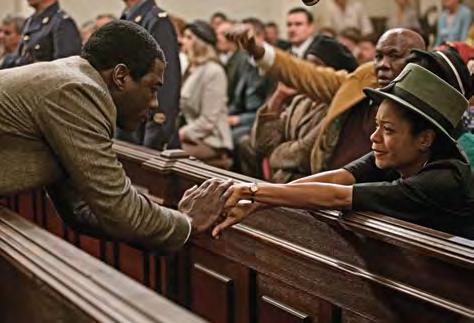
The role was not just daunting in itself for Idris (“I don’t look like Mandela—and I don’t sound like him”), but a significant career step too. The 41-year-old is well known for the BBC1 series Luther and his breakthrough performance as the drug dealer Stringer Bell in US cult crime drama The Wire, but he hasn’t yet been universally recognised as a leading man. He will be now. His Mandela is a performance of simmering potency and authenticity, particularly as Mandela grows older, quieter and more stately.
Idris says that he modelled the latter part of his portrayal on his father Winston. Then he goes quiet.
moved to east London after marrying Idris’s Ghanaian mother Eve, and worked at the local Ford plant.
“I’ve never met Mandela in my life. Never met him while I was playing him. So for the older Mandela, I used me old man. That’s what my dad is like. The dignity, the poise.”
His late father wasn’t his only reference point. Idris travelled to Robben Island, where Mandela was imprisoned, and demanded to be allowed to stay in a cell for a night. Perhaps pointedly, he was put in the punishment wing.
“They shut the first key, clink. ‘All right, see you later, mate.’ Shut the second ►
37 JANUARY 2014 R e A de R sdigest.co. U k
Torn apart: Idris with Naomie Harris as Winnie Mandela at his trial
door, clink, the third door, clunk. And as they got further away in the distance, I’m like, This is real. They even left a light bulb on, as they did for the prisoners.”
What was going through his mind?
“I’ll tell you what was going through my mind is that I’ve got a kid who lives in Atlanta. [His daughter Isan, who lives with her mother. Idris also has a house there.] If anything was to happen to her that night, there’s no way I can go there. I’ll tell you what else was going through my head: Idris, this place is haunted. Loads of people died here.”
It sparked off a thought process in him. He realised that when Nelson Mandela was convicted in 1964 at the Rivonia Trial, along with seven other ANC leaders,
2008
A break when he lands the part of Stringer Bell in the cult drama The Wire
“Even though he was sentenced to life in prison, he was actually killed in that courtroom: the man he was was killed.
I know: I spent one night in there and I was like, Blood-y hell.”
Every now and then, revisiting the role or to accentuate a point, Idris drops into Mandela’s familiar steady, nasal delivery. It’s a completely convincing leap for a boy from east London to the Eastern Cape, but he says he finds it easy.
“I’m a mimic. All my life, you know, only-child syndrome. Over-productive mind. I just listen to everything in such detail that I can recreate it.”
He has a musician’s ear and he makes music too. He is famed for his DJ sets (as
2010

Luther makes a star of Idris: “I’d no idea it would be so popular”

◄
DJ Big Driis), but he’s also a songwriter and producer. Indeed, he says that music was an essential catalyst for his transformation from Idris to Nelson.
“I listened to music while I was playing this character all the time—old South African traditional work, Mahotella Queens, stuff that Mandela was listening to during his life. In the movie, there’s a lot of that music. I had a lovely driver during filming and we used to talk about music all the time. He would play everything I liked from reggae to Congolese music. Now that helped me get in the spirit of Mr Mandela. I’m s**t in the mornings, but when I hear music, it always lightens my mood.”
During four hours of prosthetics each
2011
The world of sci-fi beckons with a part in Hollywood blockbuster Pacific Rim
day, he’d not only be listening to recorded music but writing his own songs too. During that time he produced an album’s worth of material. Not an official soundtrack, but just for his own consumption. He plays me some of them, because “I don’t know how to explain how I play someone like Mandela, but I can do it musically. I’m putting this album together called Me and Mandela, which is a testament, a love letter from me to Mandela, and the songs are as varied as the man is. This album is an expression of my journey as an actor.”
Watching Mandela: Long Walk to Freedom, with its evocations of the hill tribes of the Eastern Cape intercut with the iniquities of 1950s Johannesburg,

how to explain ►

◄
you can’t help wondering about modern South Africa. “I have cherished the ideal of a democratic and free society, in which all persons live together in harmony and with equal opportunity,” said Mandela in his statement from the dock during his trial. Idris spent six months in Johannesburg filming—does he think that ideal has been achieved?
“Modern-day South Africa is much more of a melting pot than anyone would realise. I have no issue walking around the country right now. I don’t mind it at all. I love it. There’s an optimism, even within the townships. As an outsider you go to South Africa with a prejudice of what happened there, the history and that, but it turns out the people there don’t have that—and that’s directly from Mr Mandela. The black people don’t have it, that prejudice. Of course, there’s some resentment, but they’ve moved on in the most healthy way.”
How does he feel it compares to his home country? “You know, in the UK we’re very diverse, it’s a very integrated country, but I actually feel South Africa is even more integrated. I love London and the diversity of it, but I tell you what: in South Africa I’m listening to the news and I’m watching a white South African speaking Zulu! Imagine if you heard a white newscaster over here who said, ‘And today, another man was killed be-
cause [switching to fluent street slang] he started to run ting and we didn’t know wat was going on. So that man’s gonna get murdered for dem ting.’ It would never happen.”
Idris returned to Johannesburg for the film’s world premiere in November. He couldn’t wait to go back—having previously been made to feel so welcome.
“I explained to them when I originally got to Jo’burg that I was so scared I wasn’t gonna be accepted as the guy to play Mandela. But they really opened their arms and said, ‘Idris, you’re our guy,’ even though I’m not from there.”
Mandela’s ex-wife Winnie—played brilliantly in the film by Naomie Harris —was particularly friendly.
Idris invited the 77-year-old, as well as her daughters Zindzi and Zenani, out to dinner during filming.
“She just saw me and went, ‘My husband!’ and gave me a smacker.”
Winnie later told him, “Play [Nelson] like a man. All that fist pumping, woo woo Mandela stuff?…No. Play him like a man. Play the real guy.”
Perhaps she was aware that, in Idris Elba, they had an actor who could do nothing but. n
Mandela: Long Walk to Freedom opens in cinemas on January 3.
Fans of simple prose should visit the Gobbledygook Generator at plainenglish. co.uk, which churns out “meaningless, empty phrases that make it look like you know what you’re talking about” at the click of a button. Here are just a few:
• “We now offer diplomas in holistic digital contingencies.”
• “Today marks the 20th anniversary of our synchronised transitional paradigm shifts.”
• “The consultants recommend homogenised strategic time-phases.”
40 JANUARY 2014 REA d ERS d I g ES T.c o. U k

Special offer selected just for Reader’s Digest Subscribers
The most rewarding of all bedding plants and extremely easy to grow, these beautiful begonias will fill your garden with glorious colour all summer long. Sensational combinations will put on a spectacular show from these energy packed tubers.
An exciting medley of cascading colour



Large weather-resistant blooms


Terms & Conditions: Offer subject to availability and to UK readers only. Offer closes March 17th 2014. Please note that your contract of supply is with Thompson & Morgan, Poplar Lane, Ipswich IP8 3BU, company reg no. 358372. Terms & Conditions available upon request. All offers are subject to availability
TO O RDER:
Hotline: 0844 573 1686 (quote TC13) Online: www.thompson-morgan.com/TC13 All orders receive FREE p&p
order will be dispatched from January 2014 onwards.
Half-Price Begonias
HOW
Order
Your
Begonia Giant Picotee mıxed Begonia pendula mıxed Flamboyant blooms boast layers of ruffled petals.
Begonia double mixed Begonia fimbriata mıxed
BegoniaSAVERcollection each)40tubers(10of for£23.98–(rrpHalf-Price
Flowers up to 10cm across in vibrant shades SUPER
£47.96)
SmaSh Your
If you just stop telling yourself you can’t do things, you’ll be amazed at what you can achieve by mike peake
You probably didn’t notice it happening, but there’s a strong chance that during your life, you’ve fallen into a way of thinking that inhibits almost everything you do. Heavily influenced by your own and others’ perceptions of how skilled and successful you are—in everything from relationships to your career—you’ve established an “expectation ceiling”. This upper limit on what you think yourself capable of is fixed at a level that might test you, but seldom truly challenges you.
“It’s a safety net,” says Professor Nigel Nicholson of the London Business School and author of The “I” of Leadership (£18.99).
“Some people are afraid of risk, failure or being rejected, and we set limits because it satisfies our need to say, ‘I don’t have to try any harder.’ ”
Once we pass 28, it’s difficult to break ►

42 readersdigest.co.uk microgen/getty images
january 2014 positively
2014! limits

through these instinctive limits because our personality traits are pretty much set in stone. But don’t give up— armed with these life-changing tips from experts and people who’ve overcome their own mental hurdles, you can still break through your expectation ceiling to set and achieve new, impressive goals.
Make Yourself uncomfortable
To challenge your personal status quo, you have to get out of your comfort zone. “People need to be moved into a situation where they do and see things differently,” says Professor Nicholson. “They need to be tossed into the ring.”
environment are three levels on which you can challenge your perceptions.”
Create opportunItY out of criSiS
Sometimes a dramatic event can radically alter your life, way beyond your control. If so, try to harness it for the good.
Bahman Jamalaldini, a 54-year-old former BT engineer from Milton Keynes, contracted meningococcal meningitis and septicaemia in December 2010 and lost both legs, his right hand and all of his fingers and thumb on his left.
“Any big event gives you the chance to stop and look at your life”
If you’ve been doing the same uninspiring job for years, for instance, but lack the confidence to change, try doing an evening course in a subject you’re not sure you even like. If you want to break the shackles of a life spent sitting in front of the TV, why not volunteer at a day centre? Fed up with being unfit? Don’t go for an occasional jog—give yourself a jolt by taking up kung fu.
Try disassociating yourself from your normal persona. Go to an event—such as speed dating—and act out a role of someone who’s different to you and see what happens, says Professor Nicholson. “How you present yourself, how you view other people and how you see your
“I found myself completely physically disabled,” he says. “Within a few weeks, I’d gone from being quite an active person, always running around, to being unable to do anything.”
Bahman was given artificial limbs and told he’d be lucky to walk independently within nine months. But—determined to have goals beyond being able to stand up again—he did it in three weeks. Then, as his doctors looked on nervously, he started swimming. From being at an alltime low, a new Bahman was emerging— one convinced he could do anything, such as completing a sponsored trek of the Great Wall of China, raising £22,000 for Meningitis Now. He now fancies tackling the Three Peaks Challenge, climbing the highest mountains in England, Scotland and Wales in 24 hours.
“Any big event gives you the chance to stop and look at your life,” he says.
VIsualIse SucceSS
Performance psychologist Ken Way, author of Mental Mastery (£24.99), suggests trying to imagine achieving a goal, such as doing well in an exam, as if you were
44 readersdigest.co.uk january 2014
◄

feels he could do anything
there in the flesh. Indeed, he says, by sandwiching this visualisation between two dissociative ones—seeing yourself doing something random or uninspiring, perhaps—it can help your focus and make a goal seem even more achievable.
Fiona Oakes, 43, runs an animal sanctuary in Asheldham, Essex. She overcame a degenerative childhood knee condition that left her barely able to walk to become a successful runner, winning this year’s
North Pole Marathon—in temperatures of minus 28C. She approaches her goals by visualising a ladder.
“I can’t go from the bottom rung to the top straight away,” she says. “There are lots of small, weekly goals en route. When I was recovering from operations in my teens, they were to walk five paces one week, say, then six the next.”
She also likes to mentally conjure up easy, familiar runs when fatigue sets
►
45 readersdigest.co.uk january 2014
courtesy of meningitisnow.org
Bahman Jamalaldini on the Great Wall of China. Despite his problems, he

Fiona oakes completed the North pole Marathon in just four hours and 53 minutes, a women’s record. At the other extreme, she took part in Marathon des sables, an endurance race in the sahara Desert
in during a competitive event. “I think, That’s not a horrible run up 600-foot sand dunes,” she says. “It’s a nice sunny day back home running to St Peter’s Church, and I know I can do that.”
turn setbaCks into PoSitiveS
It’s easy to allow a serious problem to stop your ambitions in their tracks. But many high achievers will not only overcome them, but use them as an inspiration or advantage to make achieving their goals even more possible, or more expansive.
“I expect to deliver whatever is required of me”
In her early twenties, Rachel Lowe became a mother, much earlier than she’d planned. “It was a difficult time,” says the 36-year-old. “I’d been
an achiever at school and had big plans to travel and have a career.”
She found herself driving a taxi, while studying part time at Portsmouth University. But rather than wallowing, her unexpected circumstances empowered her to become an entrepreneur—and even gave her an idea for a real money spinner. Destination, a game similar to Monopoly where players compete as taxi drivers, became a Hamleys top-seller in 2004.
Rachel then borrowed hundreds of thousands of pounds to produce a Harry Potter-themed version to flood the 2008 Christmas market. But the release of Harry Potter and the Half-Blood Prince was put back eight months and she suddenly found herself unable to launch her new flagship product. With skittish bank managers wanting their money back, she went bankrupt, lost her house and had a nervous breakdown.
But Rachel managed to turn even this disaster into a positive. She cultivated the
46 readersdigest.co.uk january 2014
m ike k ing
◄
media, became an emblem of the banks’ mishandling of small businesses during the recession, then used the PR to relaunch her business and turn Destination into a best-seller. It’s now available in more than 20 different versions, including an Olympics-themed one.
Rachel’s latest project is a fragrance called Eminence. “I’m not quite so freespirited as I was first time round,” she says, “but I know that anything is possible if you’re determined. My goal now is to sit alongside Chanel and Prada.”
sMash one CeIlIng , SmaSh them all
If, deep down, you know you want more, psychologist Ken Way is adamant that you owe it to yourself to try. “People can almost always achieve more than they imagine,” he says. “And it’s true no matter your age. One quiet-spoken middleaged manager I knew had completely lost his direction, but is now on the board of an international company.”
After overcoming her disability to conquer the North Pole Marathon, the 150-mile Marathon des Sables endurance race and finish in the top 20 of the London, Berlin and Moscow marathons, Fiona Oakes feels that not only can she achieve her athletic goals, she can do almost anything.
“I don’t have any expectation ceilings,” she says. “I expect to deliver whatever’s required of me. There have been years of graft, setbacks, picking myself up constantly and starting again, and the thing that gets you through is the ability to control the mind. These days, the thought that I might not be able to do something simply doesn’t enter my head.”

“Anything is possible if you’re determined”: Rachel lowe with her top-selling game
Of course, your expectation ceiling might be exactly where you want it to be. “I admire people who’ve got a nineto-five job, mortgage and family and are really content with it,” says Rachel Lowe. “If you’re happy, you’re successful.”
“We live so long these days that you can reinvent yourself many times,” adds Professor Nigel Nicholson. “And it’s worth remembering that it’s very hard to make a fool of yourself if you want to try something new. Most of the time, people aren’t paying that much attention.” n
I was struck by this magazine advert when on holiday in France. A rather niche subject, I thought… Many thanks to William James from london for sending this in

47 january 2014 readersdigest.co.uk

positively 2014!
From funny road signs to play days for grown-ups, honest politicians to cheaper coffee—12 suggestions for bringing a little more optimism to Britain this year
the spirit of good will

Reginald d HunteR, 44, comedian
“When money is tight, as it is now, people lose patience. They stop being generous with their time, their effort, their manners, their spirit—and their goodwill. There’s a domino effect. You see it around the world. That, my friends, is the Human Condition.
“But there are things that can heal the Human Condition. We constantly hear those scientific reports about how laughter can make a difference to someone’s life. It’s true! Just that simple act of telling a joke and making someone chuckle. I know y’all think I’m just saying this because that’s my job, but if you watch people laughing, you will see that healing taking place.”
l Reginald D Hunter’s latest live DVD In The Midst Of Crackers is out now
49 Calaimage/Robe R t Daly/getty images
RicH davies, 45, electrician, Bedford
“For me, it’s all about how we talk to each other. If you start speaking to someone and it feels like you’ve got a bit of an attitude problem, that person is going to take the hump and start giving you grief as well.
“I learned from doing this job— and being self-employed—that, no matter how you’re feeling, it’s always better to keep a smile on your face. I know that sounds like a tired old cliché, but it works. It disarms people, it calms the situation. You end up having a decent conversation instead of a shouting match.”

tony Benn, 88, former MP and president of the stop the War coalition
“Unfortunately, we live in a world where much of our everyday life is controlled by corporations and institutions. They control the flow of money and, consequently, people feel powerless, hopeless. And if you lose
hope and faith in the future, you’re in danger of opting out of society.
“What I would do—and this is something I’ve been involved in for much of my life—is advance the power of democracy. I spend a lot of time talking to the British people and I’ve generally found that their judgement is sound. Sadly, the establishment constantly underestimates their intelligence. We should make people feel that their voice and their opinion can actually make a difference, that they have control over their lives. If you could do that, you would instantly create a feeling of widespread unity and togetherness.”
l A Blaze of Autumn Sunshine: the Last Diaries by Tony Benn is out now (£20)
cHRis WRigHt, 69, businessman and co-founder of chrysalis Records
“If you were to put me in charge of the country for a day and say, ‘Right, increase the nation’s quota of goodwill’, I’d probably end up knocking a bit off VAT or something like that. That’d be my businessman’s answer to the problem. If people have
“There’s a World Cup this year: Just think how we’d feel if England could bring the trophy back to these shores.”
cHRis WRigHt

50 readersdigest.co.uk january 2014
Hattie m iles/Clive Conway

val McdeRMid, 58, crime writer
“When I was in Minorca a few years ago, I noticed that almost every piece of greenery in the town had been turned into a children’s play area. Not only were the kids having fun and interacting, but you’d also get a small group of adults out there each evening having a laugh and a blether.
“It might only be a small patch of grass on the outskirts of town, but let’s get a couple of swings and climbing frame on there. It would cost next to nothing in the grand scheme of things, but it would transform lives.
“We are, by nature, social animals. I’ve spent enough time on my own, staring at a computer screen, to know that it isn’t good for your soul. Bring people together—especially where children are involved—and they’ll start talking to each other, making friendships that will last for years.
“Our kids today are increasingly reliant on computers and phones, but if we make sure they’ve got an inclusive and human grounding in their early years, it will set them up for life.”
l Val McDermid’s latest novel is Cross and Burn (£16.99)
more money in their pockets, they automatically feel more charitable.
“But if I were a magician, I think I’d try something a bit different. We all saw how the nation got carried away by the spirit of the Olympics. Well, there’s a World Cup this year; just think about how we’d feel if England could bring the trophy back to these shores. Will it happen? Hmm…I’m not holding my breath.”
l Chris’s book One Way or Another: My Life in Music, Sport and Entertainment is out now (£19.95)
Molly day-WaRd, 17, student from cornwall
“Have you heard about those on-thespot fines you get for littering and spitting? Wouldn’t it be wonderful if we could turn that on its head and give people rewards for helping each other spontaneously. We’d have plain-clothes inspectors going round, looking out for someone who was, say, assisting an old lady with her shopping. The inspector would write out a ticket and give them a £10 reward. Goodwill isn’t supposed to be about financial gain, I know, but I can’t help feeling that this would really grab everyone’s attention.”
“JiMMy”, 30, artist from newcastle
“How much time do we spend looking at road signs? And how do they make us feel? If we could create road signs that lifted the spirit, we could stop drivers arguing and fighting with each other in traffic jams. Let’s put them in pink neon or lurid green. And, as well as speed restrictions, why not have tH
51 january 2014 readersdigest.co.uk
sH o R tell/getty ima ges
omas
►
jokes flashing across our motorways? Imagine looking across at the bloke sitting next to you in a five-mile tailback and smiling...”

Rick PaRFitt, 65, status Quo
“The first thing I’d tackle is CCTV. On the one hand, you do need it to help cut down crime—but on the other, it makes people feel frightened and paranoid. You can’t step out of the house without feeling you’re being spied on and judged by society, and that automatically makes you retreat into your shell. You pull away from society if you feel you’re being watched all the time.
“And can I make one more suggestion? Bring down the bloody price of coffee! I spend a lot of time in Spain and you can get a great cup of coffee for a euro. I come to London and the shops are charging crazy prices. No wonder people look so grumpy in a morning, they’ve just paid four sodding quid for a cappuccino!”
l Status Quo’s latest album is Bula Quo!

Jo-anne kaye, 35, nurse, Birmingham
“On the last Sunday of every month, our street is closed to cars so that the kids can have a safe play day. It’s been a massive success and that has got me thinking: why not have a play day for the parents too? Why do we have to wait for a royal wedding or a jubilee to have a street party? Once a month, you could get together with the neighbours, crack open a bottle of wine, bake cakes, have a natter about what’s on telly and generally let down all those defences that we surround ourselves with on an ordinary day. After a couple of months, we’d all be nodding to our neighbours in the street, asking after the kids and fostering that sense of a real local community.”
“Can I make one more suggestion? Bring down the bloody price of coffee!”
Rick PaRFitt

52 readersdigest.co.uk january 2014
Dimit R i o tis/ getty images ◄
RacHel silveR, 42, PR from east london
“Go and see live music! Whatever your taste, find out what’s going on in your area and go see it. A ceilidh band at your local pub, chamber music at the church, a pop concert at a big stadium—just get out and be with other people.
“Why not track down that band you loved when you were younger? You might even bump into old mates from school. No matter what age we are, nothing touches us emotionally like music and nothing brings us together, creates spiritual bonds, as much as singing along to our favourite songs.”

duncan
Bannatyne, 64, entrepreneur
“What would I do to create a spirit of goodwill? Personally, I think it has to start with our leaders, our politicians. Crooks make crooks! We all saw what happened with the expenses scandal and I think that definitely affected the mood of this country. Let’s make sure they understand that, as a nation, we need to see they’re doing right by us.
“I’ve seen this happen in business. When you can trust the people in charge, it has a trickle-down effect. If the politicians got their act together, it would drastically affect how we treat each other.”
l Riding the Storm: My Journey to the Brink and Back by Duncan Bannatyne is out now (£18.99)
All interviews by Danny Scott

dR HaRRy cliFF, 27, particle physicist at ceRn and curator of the Collider exhibition at london’s science Museum
“There’s a bit in The Hitchhiker’s Guide to the Galaxy about the Total Perspective Vortex, a device that shows you how small you are compared with the whole universe. I think that could be really useful for increasing goodwill. You’d think, Here I am, just a tiny speck on a tiny planet in a massive universe. All those silly little things that are putting me in a bad mood don’t actually matter. I’m just going to be nice to people.
“A glimpse into the Vortex and you’d be celebrating the infinite possibilities of the universe. And surely the fact that we exist in the middle of all that cosmic chaos is hugely inspiring.
“Can I just add that there’s a possible drawback to my theory; in the book, most people who stare into the Vortex fall into a deep depression. Still, it’s got to be worth a try!”
l Collider runs until May 6, 2014. For more info, visit: sciencemuseum.org.uk
What are your ideas for making 2014 a year of increased goodwill and optimism in Britain? Let us know by emailing theeditor@readersdigest.co.uk n
53 january 2014 readersdigest.co.uk

SECRETS OF THE positively 2014! superrich
Haggling, getting cheap haircuts and saving paper clips—our favourite confessions from American multimillionaires

We’re thrifty—and proud of it
1
“I go to the ATM only once a week and pay for everything with cash. That way, I’m forced to stay on a budget without counting pennies and saving receipts. I can spend only what’s in my wallet. I turn it into a game where each week I reduce my ATM withdrawal amount by $20 to determine how low I can really go.”
AlAn coRey, AutHoR oF A Million Bucks By 30
2
“People are always surprised that I don’t have a wardrobe full of suits. I buy three suits every five or so years and
own only ten in total. That’s all I need.”
t Boone pickens, oil BillionAiRe
3 “When you open the newspaper and you see those coupons, it looks like dollar bills staring you in the face...It’s how I grew up. Why not?”
FilM stAR HilARy
swAnk on cutting out
Money-oFF coupons
4 “I think about it this way: not spending money is the same as making money. So if I save $2,000 by not flying first class, that’s the same as someone paying me
We’re just like you
6 “Contrary to popular belief, the rich do pay taxes—a lot of taxes. And they don’t all have teams of high-priced lawyers and accountants to do the paperwork. Many of them do their own, just like the rest of the world.”
A pARtneR At A pRestigious lAw FiRM in wAsHington Dc
7 “Millionaires tend to pay about $16—including tip—for a haircut at a traditional barbershop.”
tHe univeRsity oF geoRgiA suRvey ReseARcH institute
$2,000. Wouldn’t you sit in an uncomfortable chair for three hours for $2,000?”
5
“We have neighbours who are billionaires, but you’d never know it. The really wealthy are usually not the ones who wear the most expensive clothes, have the latest handbags, or drive flashy cars. In Martha’s Vineyard [the famously wealthy summer resort] you see a lot of people who live in $10m houses driving ten-yearold Toyotas.”
BotH FRoM A successFul Boston plAstic suRgeon
We’re not as clever as you might think
8
“It’s amazing how much smarter everyone thinks you are once you have money. Two days after I sold my company, I got asked to speak at a conference I’d been trying desperately to speak at for six years.” peteR sHAnkMAn, entRepReneuR
9 “A lot of life is really about who you know and making sure you hold on to those relationships. My big break was when I was hired to represent a company started by people I knew from college.”
A pARtneR At A pRestigious lAw FiRM in wAsHington Dc
56 readersdigest.co.uk january 2014 previous spread and right: p hillip t oledano / t runk a rchive
We loathe waste
10 “I get a tremendous amount of satisfaction from not wasting things. I still collect all the tiny pieces of soap and put them together into one bar. I still squeeze the toothpaste tube dry. And I grow a lot of my own vegetables.”
August tuRAk, FounDeR oF two successFul soFtwARe coMpAnies
AnD AutHoR oF Business secrets of the trAppist Monks

11 “One time my granddaughter was filling out all this paperwork, and there were several paper clips. I told her to take them off so she could reuse them. She said, ‘Grandma, do you know how cheap paper clips are?’ I said, ‘Do you know how far a penny can stretch when you need it to?’ ”
pAt BRennAn, co-owneR oF
A coMpAny tHAt BuilDs
Bespoke Houses in pennsylvAniA ►
To give or not to give?
12 “After I made a bit of extra cash by being an app developer, I decided to give some of it to old friends and family members who were living from pay cheque to pay cheque during the recession. But I knew that most of them wouldn’t accept it. So instead, I asked them for app ideas, which I’d code and sell. They weren’t great ideas, and individual apps barely make any money. But that wasn’t the point. I’d pay my contributors thousands of dollars anyway.”
Allen wong, App DevelopeR AnD AutHoR oF lifehAcked
13 “Whenever the local newspaper lists my name among the 100 toppaid executives in the area,
I get a ton of requests from people asking for money. It happened so much that I had to come up with a strategy to deal with it. Now I say, ‘I’m happy to give. I’ll match whatever you raise yourself.’ ”
RetiReD cAliFoRniA tecH executive

14 “A whopping
72 per cent of wealthy families—those with more than $250,000 to invest—think their children should pay at least part of their college tuition, and nearly a third think the prospective student should plan on contributing at least half.”
A 2012 suRvey oF 1,000 AFFluent FAMilies
By Asset MAnAgeR legg MAson
15 “One time my hairstylist told me that she’d been fined for passing through a toll booth without paying. She didn’t have enough change and figured she’d pay later by mail. She didn’t realise that the fine would be a hefty $125. So I decided to tip her $125.”
Allen wong
We’re gutsy with our jobs
16
“When negotiating a new salary, always end with a request for a nine-month review, instead of the usual 12 months. It always gets approved, and it gives you a three-month head start on a potential rise or bonus.”
AlAn coRey
17
“If you want success, you have to accept risk. I was working at AOL
We don’t quit until we get the deal
18
in the 1990s when the company let go of 300 people. I was one of them. The film Titanic was coming out, so I took my rent money and had 500 T-shirts printed that read, “It sank. Get over it.” If I didn’t sell those shirts, I was homeless. I sold 500 shirts in six hours and made five grand. Then I called USA Today and gave a reporter the story. I sold 10,000 shirts online over the next two months and ultimately racked up 100 grand. That was my very first company.”
peteR sHAnkMAn
“I once went all the way to the head of customer support at Dell over a problematic computer that was out of warranty, and I was sent a new one the next day. If you’re willing to go up the chain, you’re very likely to reach someone who’s willing to bend the rules to rectify a complaint and fix the problem.”
August tuRAk
19
“When you’re buying something, it’s good to ask, ‘Where does the shop get it?’ We were paying for organic produce, and the prices were killing us. So I think, Where is this shop getting its food from? We do the research, call the wholesaler, and find out the criteria for ordering. The minimum order was $250. So we started taking orders from friends and arranged to get boxes of food dropped off in our driveway.”
JeRRoD sessleR, entRepReneuR, FoRMeR RAcing cAR DRiveR AnD AutHoR oF fiVe per cent chAnce, ABout His BAttle witH cAnceR n
Adapted from the book
13 things rich people
Won’t tell you by Jennifer Merritt with Roe D’Angelo.
Additional reporting by Michelle Crouch
59 january 2014 readersdigest.co.uk
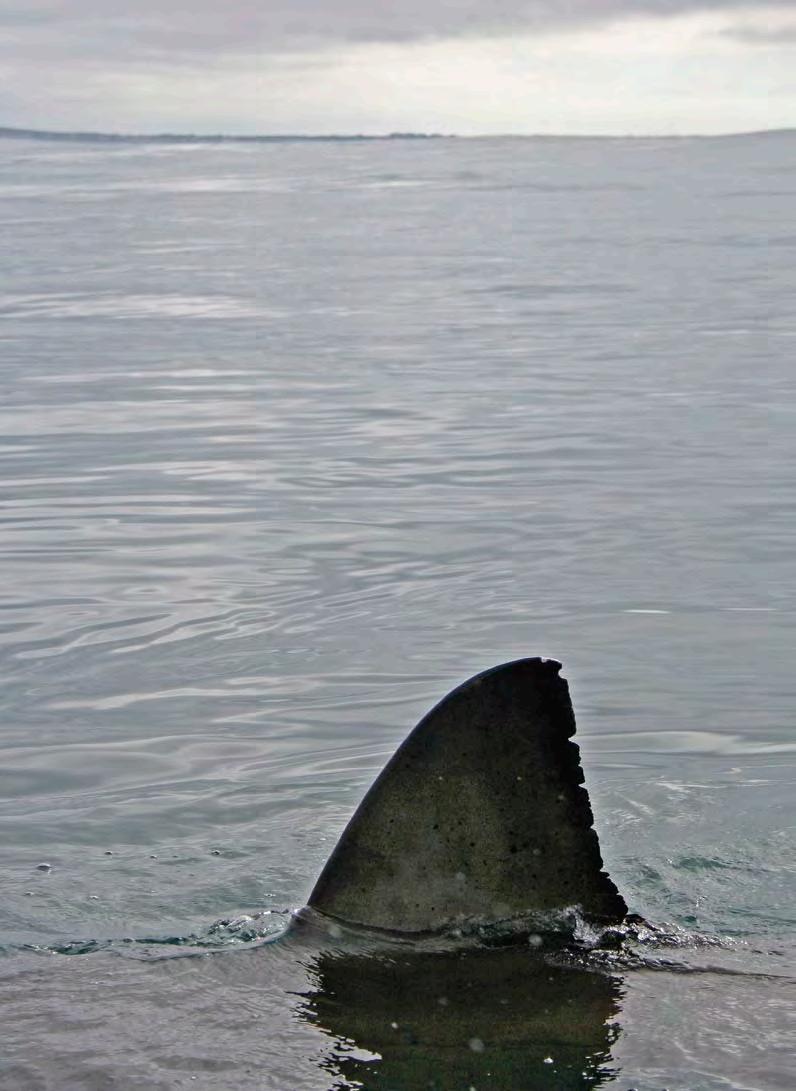
A remote, beAutiful bAy. A young couple. An eArly evening swim. then, A fin
 by lisa fitterman
by lisa fitterman
The clear blue water of the Pacific Ocean looks so inviting. Sitting by the campfire, Denis Udovenko strums his guitar impatiently. Will his wife ever stop fussing with pots and pans? He wants to go for an early evening swim, but Polina is busy in their beach campsite in tiny Telyakovsky Bay on Russia’s far-east coast.
It’s mid-August 2011, and after two grey days the sun has finally come out, setting this beautiful, remote place in sharp relief. The peninsula that hides
SHARK ATTACK!
the bay looms large and distant. Their home in Vladivostok, 140 miles away, seems like another world. It was the bay’s inaccessibility that sold it to Denis, a computer programmer who loves solitude.
“I’m going swimming by myself,” Denis finally announces, setting the guitar aside. Tall, dark and serious, he has dimples that surprise because he smiles so rarely. He flexes fingers that are strong and calloused from plucking guitar strings and stands up. ►
61 january 2014 readersdigest.co.uk
Polina, a 25 year-old accountant with dark hair and a gentle manner, protests. “Please, wait for me,” she says. “I want to go too and I can’t see without my glasses!”
Denis, also 25, agrees. He knows that she’s nervous about brushing against spiny sea urchins or cutting herself on sharp rocks. So they set out, one behind the other, making for the tip of a narrow spit about 200 yards from shore that locals call the Island of the Yearning Heart. He leads with a strong breaststroke, frog-kicking and arcing his arms, then breaking off to give Polina the all-clear.

“Swim fast to the shore, Polina! Go! Shark!” Denis told his wife

At the island they dive, splash and finally lie in the setting sun to dry off. They stay about 30 minutes, until just before 7pm, when it starts to get chilly. For the swim back to camp, Denis again starts out first, moving in a comfortable rhythm as he strains to see what lies ahead. The water is about 25 feet deep here, and with the waning light, it’s become murky.
Suddenly, there’s a shape rushing towards him—a shadow ten to 12 feet long. He turns, then feels something sink its teeth into his right hand.
“Swim fast to shore, Polina! Go!” he cries. “Shark!”
“What are you talking about?” she asks, in disbelief. There are no sharks here. There never have been, at least not ones that hurt you.
Then she sees her husband of eight months disappear underwater.
It takes Denis several seconds to understand what’s happening. The shark is pulling him to the bottom. Below the surface, the water is much colder and the current is strong. There’s a rushing noise in his ears.
Don’t take in water, he tells himself fiercely. Get to the surface. Breathe.
The shark’s sharp teeth are clamped down on his right wrist and it shakes its head back and forth as it tries to bite through sinew, muscle and bone. Like a dog shaking its prey.
It wants to sever my hand, Denis thinks wonderingly.
Polina is confused. Without glasses, she can barely make out Denis’s feet thrashing in some kind of struggle and she swims after them, thinking to drag him away. And then something blocks her. She feels rather than sees it—its smooth back and impossibly large fin pushing her away, separating her from her love. How could this be? She can
62 readersdigest.co.uk january 2014
Opening spread by ist O ckph O t O ; a b O ve: c O ur tesy O f denis ud O venk O ◄
Sea of japan Tokyo
Vladivostok
Beijing
r u s s i a ch i n a
TelyakovskyBay
make out a shape—the head of her husband coming to the surface once, twice, three times.
“Help!” she screams. “Shark!”
And she starts to swim for her life— and for her husband’s. She’s not sure if she’s swimming towards him or away. All she knows is that she has to get help. “Denis isn’t going to be your meal. Not today,” she says fiercely. Only she’s speaking to empty water.
Suddenly, the shark drags him back up to the surface. Denis gulps in air before being dragged down again. And again: up and down, back and forth. It’s a deadly underwater waltz, with the shark leading the way. Denis fixes on the shark’s eyes as it continues to tear at his right hand. It’s nearly severed. And then it’s gone, along with his wedding ring.
So this is what my death looks like, he tells himself, bemused. In a strange way, he feels relieved. People always wonder how they’ll die and now he knows.
Then comes a white-hot anger and the thought: I don’t want to die. Not today. Not for a long time.
Punch the shark on the nose.
There it is—an insistent whisper in the back of his mind. He doesn’t know where it has come from. Maybe he read it once in a book.
Punch the shark? Am I crazy?
But he has nothing to lose. Besides, the shark’s snout is right in front of him. It would feel so good to hit it!
He balls his left hand into a fist, hauls back and lets loose. Thwack! He feels the impact, bone against the shark’s nose cartilage. There’s more pain and then a rush of adrenalin takes it away.
The shark seems to be angrier and attacks again, this time sinking its teeth into his left wrist. The deadly waltz starts again, this time with greater urgency. Denis is thrashed back and forth until suddenly, he’s let go. His left hand is gone, and his left hip throbs from the six-inchwide chunk the shark took when he tried to get away.
Now, he just floats in the water. Only minutes have passed, but it seems like for ever. He waits for the shark to return.
Kirill Zenkov and Sergey Torokhov are staying in a busier campsite on the next beach along. They’re leaving the bay after loading firewood into Kirill’s boat. As he carefully guides the 13-footlong craft through the rocky shoals by the shore, they hear a cry.
“Ssh, cut the engine,” Sergey, a 33-yearold economist, tells his friend.
Kirill, 35, a sugar salesman, lets the boat idle. They can only make out the word “help”, high and panicked.

63 january 2014 readersdigest.co.uk
c O ur tesy O f kirill zenk O v
►
Sergey Torokhov (left) and Kirill Zenkov, with the bay in the background
Polina knew they had to get Denis to hospital or he’d bleed to death

“She’s drowning,” Kirill says, starting the boat again and going full speed ahead. But when they get near, they’re surprised. She’s still swimming.
Swimming—and screaming—at the same time. The boat pulls up and Sergey drags her in, slight and weeping.
“Save him!” Polina gasps. “Shark!”
The two men turn to the left and see a sea that’s turned red, like a swimming pool filled with tomato juice. Then Sergey notices a shark’s fin about 16 inches high racing through the water and the head of a man moving with it.
There’s no thinking, just instinct powered by adrenalin. The man is just a few feet away! Turn the boat!
Where’s the fin? It’s gone. Has the shark left him for a moment? Yes! Go, go, go.
Kirill steers towards Denis.
Sergey says, “Give me your hands.”
“I don’t have any,” Denis replies, holding up his stumps.
Sergey reaches into the water, hoists Denis, bleeding and naked, up by his armpits and settles him in Polina’s lap, instructing her to hold up the stumps to stem the flow of blood. She does what she’s told, even though she can’t stand the sight of blood. Now, she rocks her husband and murmurs a mantra: “It’ll be OK. I love you. It’ll be OK.”
Denis is white from loss of blood but he refuses to close his eyes. If he does, he’s scared he’ll never open them again.
As he guns the engine, Kirill sees the shark’s huge shadow moving beneath the boat. There’s no time to think about being a
64 readersdigest.co.uk january 2014
lexand e r g aiv O r O n ◄
tipped over. It takes no more than seven minutes to get around the peninsula and back to the busier bay.
When they lift Denis out of the boat, people on the beach fall silent. Even in extremis he’s shy about his nakedness and asks them to cover him up. Someone brings a towel. Others rifle through first-aid kits looking for antiseptic ointment and bandages. Kirill calls the emergency services.
“We need a helicopter. There’s been a shark attack,” he begins.
But the man at the other end of the line is dismissive. “You’re drunk. There are no sharks in that area,” he says.
Kirill hangs up. He doesn’t have time to argue. Both his parents are doctors and he knows they have to get Denis to a hospital fast or he’ll bleed to death.
The two men tie off his stumps as best they can with tent rope, cover the back area of Sergey’s Land Cruiser with canvas and set off for a town about 40 miles away called Slavyanka, which has a hospital. Polina sits in the back with Denis. She continues to talk to him, hoping to keep him conscious.
It’s a bumpy race against death, much of it on an unpaved, single-track road. Sergey cuts the driving time in half, mak-
ing the first village in 40 minutes. By then Kirill, who has a mobile pasted to each ear, knows to look for an ambulance that has been sent from Slavyanka. They meet up with it and follow it to the hospital.
The next afternoon, Polina takes a deep breath before walking into the hospital room to see her husband for the first time since she left him the night before as he was being rushed into surgery. He looks so tiny in his bed, surrounded by machines. What remains of his arms is hidden under swathes of bandages. Then he smiles, showing his dimples. “I’m so happy nothing happened to you,” he rasps.
She wants to hold him tight. “The danger has passed,” she whispers. “Everything’s going to be OK.”
Funded by well-wishers, Denis went to South Korea and Germany for skin grafts to his hip and physiotherapy to adapt to his new prostheses. He and Polina, both now 27, have moved to Sakhalin Island where he went to school, and he’s starting to work as a programmer. He’s taken up the drums, trying to find a rhythm to a life that nearly wasn’t. Sometimes he misses a beat. But he’s grateful that he has the chance to try again. n
Stuck in a tricky relationship? You might find yourself nodding along to Things
My Girlfriend and I Have Argued About at mil-millington.com. Here’s a taster: “You want examples? Okey-dokey. We have argued about: the best way to hang up washing; the way one should cut a kiwi fruit in half (along its length or across the middle); those little toothpaste speckles you make when you brush your teeth in front of the mirror; which way—the distances were identical—to drive round a circular bypass (this resulted in her kicking me in the head from the back seat as I drove along); and which type of iron to buy (the price wasn’t an issue, it was the principle, damnit!).”
65 january 2014 readersdigest.co.uk
Britain was once the culinary laughing stock of Europe. Not any more—and our food comes into its own when the weather’s chilly. So from curries to cawl these are the dishes you really need to try ►
By LoLa Borg

Bestof British Classic

Dishes KIPPA MATThews/rex
HAGGIS

We think of haggis as quintessentially Scottish, but it isn’t. For starters, stuffing leftover meat into a sheep’s stomach lining and boiling it until next Tuesday dates back to Greek and Roman times. It arrived here with Viking raiders and has been eaten all over the UK ever since. If one man hadn’t made such a song and dance (almost literally), haggis would just be another dish. But thanks to Robbie Burns and his poem “Address to a Haggis” (“O what a glorious sight/Warm-reekin’, rich!”), traditional Scots cuisine now equals haggis, tatties and neeps. On Burns Night, a steaming haggis is piped into the dining room and, at real hoolies, someone might juggle whisky bottles at the rear. (It’s also customary to plunge the knife into the haggis during the poem’s third verse.)
Traditionally, haggis was made with “pluck”—the heart, liver and lungs of the animal (in Scotland, usually a sheep), plus oatmeal, seasoning and so on, all stuffed into the stomach. Nowadays, leading haggis maker Macsween uses ox stomach and omits the liver and heart for a more palatable version that tastes—it claims—like spicy mince. Hmmmm.
BUBBLE AND SQUEAK
A lot of cooking, especially for the working-class, was traditionally about using everything you could lay your hands on and not wasting a scrap. Bubble and squeak has been around for at least 200 years, created to make Sunday’s roast stretch to Monday or Tuesday. Or even Wednesday. It consists of cabbage and cold cooked potatoes fried in butter, its name inspired by the sound the ingredients make as they sizzle. Some purists insist the best method is to use a 50/50 ratio of cabbage to potato; some love the Christmas version, made with Brussels sprouts; some add carrots and onion. It was popular during the Second World War and, back in the 1860s, esteemed cookery writer Mrs Beeton had a (pretty ghastly) version, which would set you back 3d.

68
B on appetit/a L amy
◄

CORNISH PASTY
We sink our teeth into about a billion Cornish pasties each year and, like champagne and Parma ham, they now have PGI (Protected Geographical Indication) status. So if you buy a Cornish pasty you’re either in Padstow or Polperro, or it’s been made to a strict local recipe.

Known to the locals as “tiddy oggies”, they date from 1300, but their heyday was the 18th century when they were the staple diet of Cornish tin miners—the D-shaped
design meant the crimped pastry edging could be used as a kind of handle for grubby hands and then discarded (though it’s the best bit).
Admittedly, Cornish pasties are never going to set the world on fire. They’re basic, gut-busting comfort food (beef skirt, potato, swede and onion in a rough puff pastry), but they do exactly what they’re meant to—fill you up.
Probably until some time next week. ►
69 january 2014 readersdigest.co.uk nei L setchfie L d/a L amy

CHICKEN TIKKA MASALA
Britain has had a long love affair with food from the Indian subcontinent. The very first curry house opened more than 200 years ago (and flopped because most potential customers had brought back their own Indian cooks). Mrs Beeton gave us curry recipes and Queen Victoria is said to have been partial to a curry.
Today, chicken tikka masala is the most popular dish in the UK’s Indian restaurants and our runaway favourite as a nation. But like many culinary triumphs, it was an accident—first made, says food writer Simon Majumdar, at some point in the 1960s by Ali Ahmed Aslam (pictured below), owner of Shish Mahal curry house in Glasgow. When a customer complained his chicken tikka (cubes of boneless chicken cooked in a tandoor oven) was too dry, Aslam improvised and used condensed tomato soup to make a spicy gravy. It was an immediate hit—its fame spread and you know the story.

These days, the dish is a curry-house staple up and down the land—and it’s even been exported back to India. In 2001, the then foreign secretary Robin Cook made what was dubbed the “chicken tikka masala speech”, describing it as a “true British national dish”.
FISH ’N’ CHIPS
Proving that what we think of as “British” is often no such thing, fish fried in light batter was introduced to this country in the 17th century by Jewish refugees from Spain and Portugal, who sold it on the streets from large trays hung round their necks—like cigarette girls. Later, Irish immigrants arrived, fleeing the famine and bringing with them a love of potatoes (though it was the Huguenots who first fried them).
But who discovered that they went together like Fred and Ginger? Some claim it happened in London’s East End, others Lancashire. Cook and writer Clarissa Dickson Wright says Seahouses in Northumberland lays claim to being the first place to sell fish and chips together (in around 1850) to Irish navvies who were working on the Newcastle docks.
Who are we to argue? ►
Two facts: fish ’n’ chips was the one dish never considered for rationing in the Second World War; and always observe Simon Majumdar’s dictum—avoid a chippie without a queue.
70 readersdigest.co.uk january 2014 simon reddy/a L amy
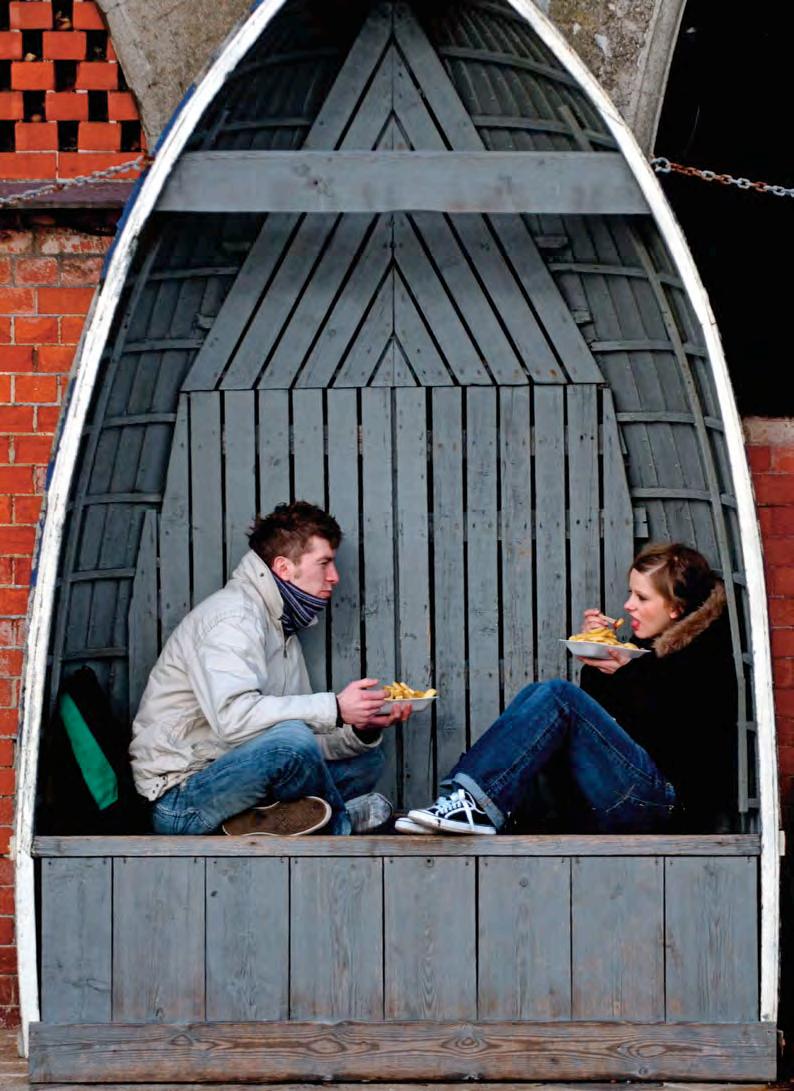
A national love affair: we spend £1.2bn on fish ’n’ chips every year in the UK
edwA rd s IM ons/A l AM y
ROAST BEEF…
This is a dish so imbued with the notion of being British that it’s given the French a handy nickname for us (“les rosbifs”) and a title for the guardians of the Tower of London (beefeaters).
“English food is, at its best, simple,” says Clarissa Dickson Wright, “because our ingredients have always been so much better.” And roast beef is the essence of simplicity, requiring just a joint and an oven, though a purist would recommend a rare-breed beef (Longhorn, White Park or Hereford, say).
Originally made for farm workers post-church on Sundays as a reward for a week of back-breaking toil, the Sunday roast lunch has survived everything, says Dickson Wright, from the Industrial Revolution to the fast-food invasion—although just half as many of us (around six million) eat a Sunday roast at home now compared with 1960. That said, there are umpteen pubs and restaurants all over the UK that survive on serving it, even if—or because—many of us can’t be bothered to cook it at home.

so diners would want less of the expensive cut of beef.
AND YORKSHIRE PUDDING
It can be something akin to a religious quest to get the perfect crispy yet airy Yorkshire pudding. To make the beef go further, in some parts of Yorkshire the pudding used to be eaten as a starter,
First mentioned in an 18th-century book, The Whole Duty of a Woman, it was called “dripping pudding” and cooked under the meat. The Royal Society of Chemistry has decreed that, to qualify for the name, a Yorkshire pud has to have risen at least four inches. (They also opine that people from Yorkshire tend to have the knack of making them, but we’ll gloss over that.) Some naughty people love it so much they serve it with any type of roast meat.
Yorkshire-pudding batter is also used for another British standard, toad-in-thehole, which normally contains sausages, although Mrs Beeton suggests rump steak and sheep’s kidney.
72 re A dersd I ges T.c o.u K j A nu A r y 2014 funkyfood L ondon/pa u L wi LL iams/ a L amy
…
FULL ENGLISH BREAKFAST
The mainstay of greasy spoons and the greatest ever hangover food (it’s the craving for fat to replace the stores destroyed by alcohol), this arteryclogger extraordinaire rose to prominence in the 1960s when it became the highlight of a B&B stay, says Simon Majumdar. It’s now in some danger of sizzling out, as only one in 100 of us eat it daily—maybe put off by the horrific calorie count. But the Great British fry-up has its roots in the days when Mrs Beeton suggested a range of cooked meats for breakfast, says Clarissa Dickson Wright.

A fry-up is the one British meal you can find all over the UK, though anything from beans to bubble and black pudding is added to the basics of eggs, bacon and sausage. A Scottish breakfast may include fried haggis or black pudding and tattie scones. A Welshman will add cockles and laverbread (made with seaweed), but Simon picks the Ulster Fry as the king—the key difference being the soda bread and fried potato bread. Unbelievably good when done well.
CAWL
There are local recipes all over the UK that use scraggy old pieces of meat, such as mutton, slow-cooked with root vegetables to a state of falling-off-the-bone tenderness. It’s budget food, with its roots in Scandinavia. During the 18th and 19th centuries, Norwegian sailors came to Liverpool bringing the recipe for stew (their word for it was “lapskaus”). The Liverpudlian version of the dish, “scouse”, gave its name to the locals. In Wales, leeks are often added to cawl (pronounced “cowell”, as in Simon), as well as potatoes and possibly carrots, celery, onion, parsnip, swede and turnip. It’s eaten with bread and butter. “Very good it is too,” says Clarissa Dickson Wright. n

Thanks to: Clarissa Dickson Wright, cook and author of A History of English Food (£9.99); and Simon Majumdar, food writer and author of Eating for Britain (£9.99).
Which British classic do you like to dish up?
If it isn’t mentioned here, we’d love to hear about it. Send us an email—with a picture if possible—to theeditor @readersdigest.co.uk.
73
E x T
simon reddy/ a L amy (2)
N
MON TH: STATUES
» tU rn to p100 to find o U t how glo BA l m A n U fA ct U ring thre Atens the q U A lit y of some of o U r f ood


Roger Taylor ‘‘I remember...’’ ►
…falling in love with cornwall. I was born in King’s Lynn in Norfolk but when I was about seven, we moved to Truro. My father worked for the Potato Marketing Board— it was kind of a government job—and he was relocated to Cornwall. He didn’t mind, though, because he’d grown up in Porthtowan, a few miles away.
My grandmother still owned the house he used to live in—a wonderful property on the beach. There’s fabulous surfing there and some of the most beautiful countryside you’ll see anywhere. It was an amazing place to grow up and, to this day, I’m still drawn back to the West Country. I guess it feels a bit like home.
…discovering lonnie donegan. Unless you grew up in the 1950s, it’s very difficult to explain what music was like back then. It was all Doris Day and the BBC Light Orchestra. Rather grey and austere, as was life in post-war Britain. Then, out of the blue, along comes Lonnie Donegan. I saw him doing “Cumberland Gap” on TV; it must have been about 1957. When I got to school the next day, there was only one thing we talked about: “Did you see him? Did you see Lonnie?” Lonnie Donegan was as revolutionary as punk 20 years later. Listening to him was like opening the door to another world.
…wanting to join a band. I went to a cathedral school on a choral scholarship, which meant that I did a bit of singing and my parents didn’t have to fork out for my education. But after the Lonnie experience, I decided I wanted to play drums in a real band. I joined a few groups and music sort of took over my life. My parents were pretty

74 readersdigest.co.uk january 2014

“After seeing Lonnie Donegan, I decided I wanted to play drums”
PERSONAL Ph OtOS C OUR t ES Y OF RO g ER tAYL OR ; C OLOUR i N g b Y S t E v E CAPL i N
◄
straight-laced, but happily they were very forgiving when it came to my music.
…moving to london. I was 18 [in 1967] and as far as my parents were concerned, I was going to get a grant and go to college. But all I was really interested in was forming a band. London was fantastic and full of music in the late Sixties—The Who, Led Zeppelin, Jimi Hendrix.
I got into London Hospital Medical College, studying dentistry, but I used to hang out at the bar in Imperial College. One day, I bumped into this guy called Brian May, who was doing a PhD in astronomy. He told me he played guitar, so we got together a few times and, blimey, he was good. We immediately became mates and we’re still mates today!
…running a business with freddie mercury. About 1969, I opened a stall in Kensington Market, which was one of the hippest places in London. I used to run it with this bloke, Freddie, who I knew because he regularly came to see Smile, the band Brian and I were in at the time. Me and Fred used to sell old Edwardian clothes and scarves that he picked up from various nefarious dealers.
Back then, I didn’t really know him as a singer—he was just my mate. My crazy mate! If there was fun to be had, Freddie and I were usually involved.
After we formed Queen, he used to come down and stay at my parents’ house. Mum loved it. He was always immaculately turned out and she could never understand how he got his trousers so perfectly creased. In fact, after he took them off, he would lay them dead straight underneath his mattress on the floor. He pressed them while he was sleeping!

Rehearsing for the Night at the Opera tour in 1975; Roger at Queen’s first professional photo session (in Freddie’s flat), 1972

…recording “bohemian rhapsody”. These days, success happens overnight. You have a YouTube hit or appear on a talent show and, bang, you’re everywhere. For Queen, it really was a long hard slog. In the early days,
76 readersdigest.co.uk january 2014

we couldn’t even get gigs. But we stuck at it, had a couple of hits, a few more people came to see us and then, in 1975, we released “Bohemian Rhapsody”. And that bloody video! I think we realised pretty quickly it had catapulted us into another league. We were no longer just a decent rock band. We were famous.
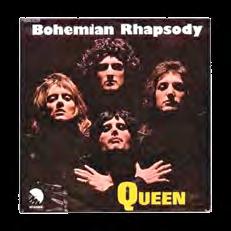
“Do we miss Freddie? Yes, of course we do. Every day”
…feeling unsure about live aid.
…becoming a dad. I’ll admit my private life has occasionally made the headlines [Roger has been married three times], but that hasn’t altered the wonderful relationship I have with my [five] kids. I first became a dad in 1980 and I loved it. People think that because you’ve got money, being a parent is easy. Sure, some things were easier, but I still worried about my kids, still wanted the best for them, still wanted them to work hard and do well. We regularly get together and it can be pretty terrifying when they’re all in the same room. They’re a rowdy bunch.
We knew that it was an important gig—it was the first time I’d heard the phrase “global jukebox”. But we were added to the bill only at the last minute and we weren’t convinced that many people would be interested in seeing us play. Believe it or not, we were actually a bit worried; it wasn’t “our crowd”.
Fortunately, from the minute we walked out on stage, they went crazy. Because each act was only given a certain amount of time, we knew we had to give them a killer set list and we just did hit after hit after hit. And then there was Freddie. My God, he was absolutely on fire that day!
…wearing some very silly outfits. Being in Queen has been a lot of fun, but I will admit that we did make some fashion mistakes. Do I regret some ►
77 january 2014 readersdigest.co.uk
PERSONAL Ph O t OS C OUR t ES Y OF RO g ER t AYL OR
My other hat’s a bowler: on tour in Mexico, 1981
of the outfits I wore in the 1980s?
Absolutely! Everybody always talks about the video for “I Want to Break Free” [where Roger dressed up as a schoolgirl], but I have no problems with that at all. That was just us having a laugh. The one I really have difficulty watching is “It’s a Hard Life”. Feathers, gold lamé and even a Blackadder ruff. What were we thinking?
…playing our final gigs with freddie—but not realising it. We toured our album A Kind of Magic in 1986 and obviously, we had no idea they were going to be his last shows. [Freddie was diagnosed with Aids the following year.]
The strange thing about Freddie is that, although he was the ultimate showman,
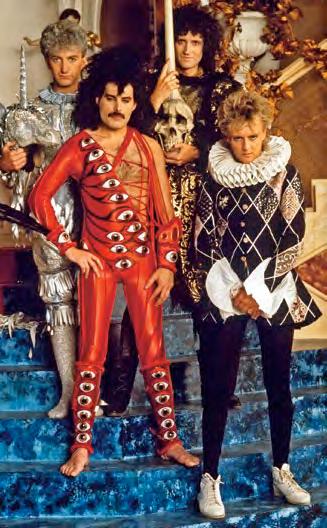
he was intrinsically a shy person. He was always saying, “Guys, I don’t want to tour any more. I don’t enjoy it.” But we never believed him, because we knew there was this whole other side of his character that loved being in the spotlight—this outrageous personality that he could turn on as soon as he walked out in front of a crowd.
For 20-odd years, I had the best seat in the house, watching the best frontman in the world. Do we miss him? Of course. Every day.
…closing the olympics. Queen have played their share of big gigs, but it’s difficult to top the Olympic closing ceremony in your own country. It really was a tremendous honour. What was the TV audience for that show? Actually, I don’t want to know—it’ll freak me out. Another thing I remember is that there were a lot of not-live performances that night. (Not mentioning any names.) We were live, of course.
…buying some fantastic motors. I’m not what you’d call a petrolhead, but I do like a nice car. I’ve even written songs about them. [Roger’s “I’m in Love with My Car”, was the B-side to “Bohemian Rhapsody”]. And having earned a few bob, I decided to get myself a couple of decent ones . The press labelled me a playboy, but I was just having a great time with a great band. I was a rocker and rockers like cars.
It’s difficult to pick favourites, but I’ve always been fond of the Bentley Continental. What annoys me is that it’s now snobbishly referred to as “the footballer’s car”. Who cares if footballers buy them? They’re still good, fast, safe cars.
78 readersdigest.co.uk january 2014
◄
m AR k m A w SON / RE x
Surprisingly, Roger now regrets some of his 1980s outfits
Slaves to the rhythm: Roger and son Rufus have recorded together

Not Part of Your Job Description?
Changing career is never easy, but you may be surprised by the hidden talents you uncover— as these inspirational celebrity examples make clear:
…recording songs with my son rufus. I’ve just released a solo album, Fun on Earth, and had the pleasure of working with him—we co-wrote a song called “Be With You”. He’s a drummer, like his dad, and actually toured with me and Brian on some recent Queen dates.
Music is not something you can really push onto your kids—they either enjoy it or they don’t. And Rufus enjoys it. Most parents would probably get annoyed if their kids started hitting things, but I was always secretly chuffed when he used to whack the hell out of the furniture. I knew straight away that he was going to be a drummer. ■ As told to Danny Scott
Roger’s album Fun on Earth and The Lot, a box set of his solo work, are out now.

Vanilla Ice (right): The Eighties popstar is also an enthusiastic housebuilder, a skill he demonstrated while spending two months as a member of the ultra-religious Amish community (as outlined in the TV show Vanilla Ice Goes Amish).
David Rowntree: The drummer from Britpop group Blur trained as a solicitor during a band hiatus and now works for a criminal-law firm. “They’re not gonna care if it’s bloody Mick Jagger,” he’s said of his clients.
Tom Selleck: The Magnum PI actor now has a lucrative sideline selling avocados, grown on his 63-acre Californian farm.
Jane Fonda: The Oscar-winning actress has had several careers, but perhaps the most successful has been her reinvention as a fitness guru, with a range of exercise videos.
79 january 2014 readersdigest.co.uk
‘‘Your opinion M aY noT bE
iMporTanT To us’’

Radio call-ins, Twitter, web forums…it’s never been easier for all of us to have our say. But, asks James Walton, whatever happened to listening to experts?
It’s hard to imagine now, but Channel 4 was once so highminded that in the late 1990s it wrested coverage of the Booker Prize for Fiction away from the BBC. But how could it show that it was different from the stuffy old Beeb? The answer came in 1999 when, on the night of the award ceremony, it did away with the usual panel of professional book reviewers discussing the six shortlisted novels. Instead, it gathered some members of the public in a bookshop and asked for their views. “There’s no academics or critics here,” presenter Muriel Gray began proudly. “Just ordinary readers.”
Sadly, Muriel’s pride didn’t last. The whole thing teetered on the edge of embarrassment—and fell over it when her guests were asked to suggest other novels that should have been on the shortlist. “Stalingrad by Antony Beevor,” said one man firmly, despite the fact that Stalingrad was neither a novel nor published in 1999.
At the time, this felt like a plucky but clearly failed experiment, and Channel 4 duly abandoned it the following year. As we now know, though, it was
THinking DiffErEnTlY! ►

80 readersdigest.co.uk january 2014
E r ick
THE Mav

81 january 2014 readersdigest.co.uk illustrated by gabriel guma
◄ to the Government, when he has already explained that the situation is a little more complicated than that.
nothing less than a vision of the future —a future based on the entirely dodgy premise that everybody is entitled to broadcast their own opinion.
Nowadays, in fact, this belief has become so widespread that we don’t even seem to notice how strange its effects can be. On his BBC Radio 2 show, Jeremy Vine constantly makes such excited announcements as “Dave from Beckenham says we should stay out of Syria”, apparently without wondering either who Dave is or how much he knows about Syria (things that surely matter more than where he happens to live). TV news programmes spend less and less time actually telling us the news—and more and more on telling us what viewers think about it. Talk-radio station LBC airs the public’s opinions on current affairs almost 24 hours a day, but only has one proper half-hour news broadcast—at 6.30am—to actually inform those views.
Personally, my fantasy is to ring up one day and say, “Please stop asking us what we think. We really don’t know anything—unlike the people you’ve got there, who’ve studied the subject for years. So why don’t you just ask them?”
THErE’s a placE for ignoranT opinions
sTronglY HElD.
THaT placE is Down THE pub
The received wisdom that all opinions are valid was already being accepted before the internet came along. Some might even blame the longterm educational trend away from differentiating between children of varying talents—on the (perhaps understandable) grounds that another word for “differentiate” is “discriminate”, and nobody wants to do that.
And then there are all those phone-ins, on anything from Afghanistan to nuclear power, where the expert studio guests are allowed to speak for just a few minutes before the switchboard obligingly lights up and they’re forced to listen politely to the often staggeringly ill-informed views of people like us. In recent weeks, for example, there have been several radio shows where an economics analyst has been told by caller after caller that the economy is on its knees and it’s all down
Nonetheless, the digital world has undoubtedly added exponentially to the problem, and not just in the form of all those mad online comments about newspaper articles and TV programmes. Many films, for instance, now advertise themselves not with praise from articulate critics who’ve spent their adult lives watching and thinking about movies, but with tweets from anonymous fans.
The belief that everybody is entitled to their say certainly sounds democratic. It might even be good manners. Yet it also comes at quite a cost. If the whole idea of expertise disappears, the trouble will go deeper than excruciating phone-ins
82 readersdigest.co.uk january 2014
and endless entreaties from news presenters to let them know what we think (tragic though these are).
Semi-informed public outcries can have very serious consequences— such as the MMR scandal, when parents prevented their children getting the vaccine long after the supposed link with autism had been discredited. And for centuries, the notion that we should learn from people who know more than we do has been the basis of human development. Now, it seems, we don’t even want to acknowledge that such people exist, which is why the word “experts” is so often prefixed with a scornful “so-called”.
Are all opinions equal?
might be more trustworthy than others. A 2011 report from the think-tank Demos found that young people were frequently taking what they read online for granted, with only a third of nine- to 19-yearolds taught how to judge the reliability of online information.
Join the debate at facebook.com/ readersdigestuk or email readersletters@ readersdigest. co.uk
And you don’t have to share Demos’s anxiety that this could lead to religious extremism to worry about its impact—not just on scholarship, but on the entire concept of knowledge itself.
Meanwhile, as the great reference books also dissolve into the oceanic waters of the internet, so apparently does the memory of them—and, with it, the understanding that some sources
Admittedly, there’s a place for ignorant opinions strongly held. That place, however, is down the pub. Everywhere else, I’d suggest, only people who know what they’re talking about should be invited to share their views with the rest of us.
Then again, that’s only my opinion. n
James Walton is a broadcaster and writer, and the Reader’s Digest books editor.
Here He Comes to Save the Day
His costume may not be inspiring, but his actions are another matter—Captain Manchester is taking the north by storm. Instead of battling dastardly villains bent on world domination, the anonymous superhero delights in simple good deeds: paying parking fines, giving out lottery tickets, helping old ladies with their shopping and handing out umbrellas to sodden pedestrians.

The Captain—who has over 3,000 followers on Twitter—got the idea of spreading goodwill after losing his job. “It’s nice to see people being nice to each other,” he says, while admitting his girlfriend would “kill him” if she found out.


Local reaction has been a mixture of puzzlement and delight, but resident Shaun McGrath perhaps sums it up best: “It makes a refreshing change from spewing your guts up after downing ten pints on a booze-fuelled night out and then picking a fight with a total stranger.”
83 january 2014 readersdigest.co.uk
the man who’s got everything covered
In a small corner of south London, there’s a leather-clad world of eccentric, inspirational wonder—run by an artist who could heal a problem or two on Britain’s high streets
►
by christopher middleton photographed by pal hansen

Stepping into Gavin Rookledge’s office is like stepping into an enchanted world (Grimstone the cat is a regular visitor)
84
A Life Less Ordinary

The minute you walk through Gavin Rookledge’s front door, you enter a different world. Standing in the courtyard of his south-London base, right in front of you, is a huge 1920s Ford van with two gigantic pairs of flower-decked buffalo horns on its roof. Look a little closer and you see that, instead of being covered in paint like a normal car, “Miss Hepburnella”—named after Audrey and Katherine Hepburn—is clad from head to toe in a mixture of copper-coloured calfskin and fake crocodile leather. As if it were a piece of luxury luggage.
Perhaps this shouldn’t come as a surprise. After all, over the past two decades or so, Gavin, 49, and his Rook’s Books company have developed a worldwide reputation for taking any object you like, of whatever shape and size, and both transforming and beautifying its exterior by applying a layer of treated animal hide.
It could be a book, a table, the ceiling of a multimillion-pound superyacht, or the walls and seats of a private cinema. As for the skin, that could come from a cow, a goat, a pig, a fish, a snake or even a toad (he has a specialist supplier in Holland). “I’d stress, however,” he says, “that though I use exotics, I’ve only ever used material from animals that have been killed for food or as part of a cull.”
His recent creations include a £50,000 staircase covered in goat leather and hemp, and a first edition of an Arthur Rackham-illustrated version of The Tempest. In keeping with the book’s shipwreck theme, it’s covered in materials sourced from the sea, including eel and wolf-fish skin, and reindeer leather found on the wreck of a merchant ship that sunk in Plymouth Sound in 1786 and was preserved in airless black mud until ►
One of Gavin’s prized possessions: a covered edition of Shakespeare’s The Tempest
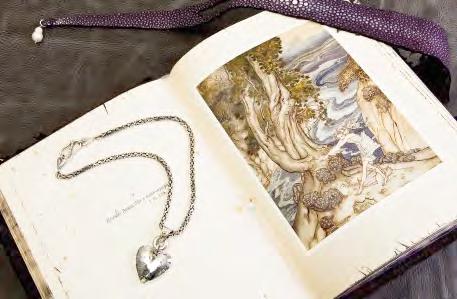

january 2014 readersd I ges t.co.uk 86

“i’ve only ever used material from animals that have been killed for food or as part of a cull”
Pimp my ride: Gavin’s customised Ford van, Miss Hepburnella, is covered in calfskin and fake leather
87 january 2014 readersd I ges t.co.uk
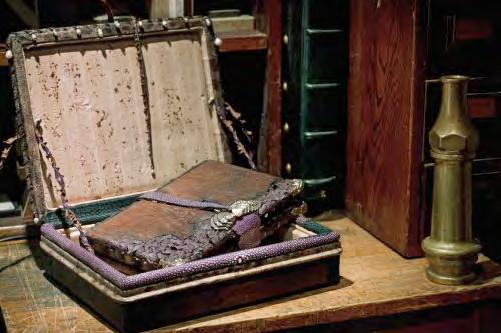
it was discovered in 1973. The £20,000 work was displayed at The Globe theatre in London this summer.
Gavin originally trained in fine art, but “stumbled into” his unusual career by working as a bookbinder after college. “I was drawn to leather because it’s a very sensual material and has a fantastic history—it’s been used since the cavemen. If you’re using skins from meat production, bought from ethical sources, it’s also environmentally friendly.”
Working with high-end interior designers such as Tim Gosling, whose projects include The Savoy and the Oriana cruise ship, Gavin gradually built a reputation as a luxury bookbinder who could also cover furniture, wallets—indeed, almost anything his clients wanted him to. Through a mixture of his great skill and
shrewd business sense, he developed a range of very wealthy customers.
“I am, when push comes to shove, the son of a self-employed salesman. I can hustle and, unusually for a creative person, I’m not afraid of the world of business. If I didn’t have the kind of client base I do, I wouldn’t be able to make the things I make.”
Ask for a full rundown of the people he works for, and he discreetly shuts the cupboard door on which his client list is pinned. Many of their names and the work they’ve commissioned are secrets, but he’ll admit to having made items for Bono, Bill Gates and Prince Charles.
“And I bound some copies of Lord of the Rings for Cher,” says Gavin. “We also made a copy of the One Ring, with the runes inscribed on the inside.”
Then there’s the cinema he created
january 2014 readersd I ges t.co.uk 88
◄
Gavin’s copy of The Tempest is covered in eeland wolf-fish skin
for Chelsea football club owner Roman Abramovich, on the 377-foot-long yacht Pelorus (recently sold to record producer David Geffen for around £190m). “Everything in it is leather”, says Gavin. “The walls, the seats, the beanbags at the front.”
Gavin also writes and binds his own diaries, which stretch back to 1984 and are kept in a large cabinet inside his office. Each has a different design and shape (square, rectangular, even triangular), and each has its own date tag attached (leather, naturally).
What’s more, the entries aren’t just handwritten lists and logs of what he’s done that day. Flick through each volume and you get a mass of multicoloured drawings, along with various tickets and memorabilia that are pasted onto the pages in scrapbook style.
It might seem an eccentric chore to some, but, says Gavin, “To me, it’s as natural as cleaning my teeth.”
It’s clear that Gavin has his own way of doing things, but that also applies to the way he’s bought up the mews buildings around his workshop in Crystal Palace over the last 14 years and created a small, creative business community. His is a model that could teach many commercial landlords about how to boost high-street shops and other traders in difficult times.
“i was drawn to leather because it’s a very sensual material” ►
There are 17 different outfits in the Coopers Yard complex, doing everything from making jewellery to designing textiles and wedding dresses, to running an architectural practice.
Gavin nurtures and supports this collective by asking them for just £200 a month, much lower than they’d pay elsewhere, and creating attractive, well-maintained studios—none of the under-the-arches dumps that often house small creative businesses.
“Don’t make too much of it as an altruistic thing,” he says. “It’s sound business

The tools of
trade— bookbinding shears, a finishing stone and gold blocking foil
sense. If I keep the rent affordable, I have a long waiting list of people wanting them and I never have empty properties. That makes me more money in the long term than charging more and having periods when they’re empty.”
89 january 2014 readersdigest.co.uk
Gavin’s
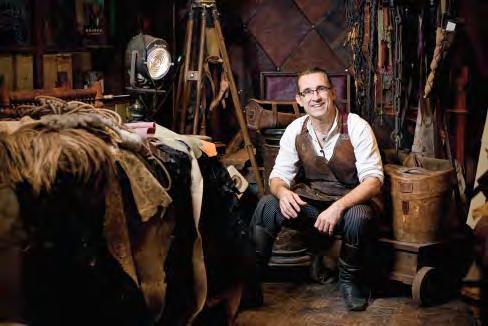
“I love my work, I produce beautiful things and I don’t make anyone miserable”
He recognises that cash flow can be a problem in the creative industries, and is more than ready to give his tenants some financial leeway.
“I know from my own experience that, working in the creative and artistic field, you’re often scratching away at flinty soil,” he says.
He also helps the businesses by commissioning them to help with his work when he can. Silversmith Tine Bladbjerg contributed to one of his recent projects, for instance, and when costume maker Deborah Tallentire had designed an outfit for a production that didn’t come to fruition, Gavin asked her if she could make it for him to wear to a party. “It was a sort of admiral’s outfit, with a codpiece and tights.” says Gavin. “It was flamboyant, even for me.”
But, though his vision for Cooper’s Yard
is businesslike, there’s much more to it than just making money.
“I spend 90 per cent of my life in this place,” he says. “If I charged more rent, or didn’t take as much care of the place, the atmosphere and people wouldn’t be as positive or creative. Why would I want to spend my time somewhere like that?
“The key thing is to get the right kind of people. Any prospective tenant or new employee not only has to come and meet me, but make a point of going round all the other firms and meeting them too. There’s a three-month probationary period, so even if they manage to keep the charm up at first meeting, we’ll soon find out if they’re horrible underneath. We’ve got something here worth protecting. In many ways we’re like a family, and that’s very precious to me.”
Illustrator Alice Robertson and graphic
90 readersdigest.co.uk january 2014
◄
artist Ben Alderman share one studio. Not only do they work together on their children’s artwork company Stripey Pipey, but they’re also about to get married.
“We’re so lucky to have got this place,” says Alice. “Ben used to have an openplan studio near London Bridge, which wasn’t ideal at all. Here, we’ve got our own space, and while it’s a bit like college —there are usually people around to talk to—you can always shut yourself away and get on with your work.”
Another happy resident is textile designer Molly Freshwater, who travels frequently to India and Portugal, and whose work is to be found in John Lewis stores up and down the land.
“I was knocking on Gavin’s door for three years before a space came up,” she recalls. “Within the creative community, it’s well known what a great place this is to work.”
The yard puts on open-air cinema shows for everyone who works there, plus their families. There’s also a special child-sized crawl-around area, built in the roof of one of the buildings, where
Tattoo Without Taboo
kids can explore and play (Gavin has three young children of his own).
And every so often, Gavin will fire up Miss Hepburnella and take her for a spin. “Being covered both inside and out in leather, she prefers, where possible, to avoid inclement weather. That said, she’s gamely driven through snow and storms, and has even roamed as far afield as Yorkshire. She turns heads pretty much wherever she goes.”
Gavin is committed to his beautiful work and Coopers Yard for the long term. “Sure, I could rent these properties out to nasty little estate agents and make a financial killing. I get offers every other week from property developers. I suppose financial logic dictates that I should accept them and let all these buildings be turned into luxury flats.
“But that’s not what this place is about, and not what I’m about. The way I see it, I near-as-I-can do no harm, I love my work, I produce beautiful things and I don’t make anyone miserable. What more can you ask?” n
The UK tattoo industry is worth about £80m per annum, and the popularity of tattoos is spreading in unexpected directions. But if you were surprised by BBC veteran
David Dimbleby getting one at 75, you might be interested in these unlikely tattoo-sporters:

George Orwell Had blue spots the shape of grapefruit on the knuckles of one hand.
Czar Nicholas II Displayed a dragon on his arm, courtesy of a diplomatic trip to Japan.
Winston Churchill Sported an anchor on his arm (his mother had a snake on her wrist).
Thomas Edison Had five dots, positioned as on dice, on his arm—for reasons unknown.
91 january 2014 readersdigest.co.uk


keeping the faith
Cornelia Kumfert takes a tour of the world’s biggest religious gatherings
Rio De Janei Ro, b R azi l
It might look like a rock festival, but this is actually the closing Mass of the 28th World Youth Day. Around three million people gathered at Copacabana beach last July to hear the newly elected Pope Francis. What’s now become the world’s largest gathering of Catholics started in 1984 when Pope John Paul II invited the young people of the world to come to Rome on Palm Sunday—300,000 did, and the event was such a success that World Youth Day was born, with the first one taking place in 1986.

The world’s oldest place of worship is in Mecca. That’s according to Islamic tradition, which says that the cubeshaped Ka’ba was originally made by Adam, before being rebuilt by Ibrahim (the Abraham of the Old Testament). For centuries, however, it was used by Arabian tribes for worshipping other deities— until the Prophet Muhammad captured Mecca in 630. Since then, Muslims have been called on to travel to Mecca at least once in their life. In October 2013, around two million people carried out the pilgrimage— or, in Arabic, Hajj. mecca, sau D i aR abia



haR i DwaR , in D ia
The world’s biggest religious festival, the Maha Kumbh Mela, takes place every three years in India. It’s the most important event of the Hindu calendar, when around 100 million people come to wash away their sins in a sacred river. Haridwar, on the banks of the Ganges, is one of four cities which take turns to host the festival. The world’s third largest religion after Christianity and Islam, Hinduism has a huge number of deities and a belief in the never-ending cycle of birth, death and reincarnation.




bangkok, thailan D
Of the five major religions, Buddhism is the only one that doesn’t worship a god or gods. Its founder began as Prince Siddhartha Gautama, experienced enlightenment at 35 (Buddha means “the enlightened one”) and then taught that everyone can attain their own salvation by renouncing greed. Some 500 million people around the world, like these Buddhists in Bangkok, celebrate the festival of Vesak, usually on the first full moon in May, to commemorate the Buddha’s birth, enlightenment and death.
Gil c O hen/
picture credits: Brazil: tass O M arcel O/ a F p/Getty iM a G es; Mec ca: Mah F O uz aB u t urk/ pO laris/lai F ; Mela: Matt Brand O n/ d esi G n p ics/ cO r B is; Ban G kO k: da M ir s
a GO lj/ r euters; Wailin G Wall:
reuters


J e R usalem, is R ael
The Wailing Wall in Jerusalem is one of the most important sacred sites in Judaism—part of the great temple complex that dates back to Solomon’s times and was almost completely destroyed by the Romans. In particular, many Jews come to the Wall to pray before Yom Kippur, the Day of Atonement and the holiest day of the Jewish year. With work forbidden on Yom Kippur, public life in Israel comes to a virtual standstill. n
what’s gone wrong with our food?
Why has the simple act of choosing what to eat become a 21st-century survival skill? Here’s what you need to know to eat well and live long
We live in a world of food abundance. We’re not just physically surrounded by the stuff—groaning supermarket shelves, ubiquitous fast-food outlets —but we also face a constant barrage of food ads and cooking programmes. It’s foodie heaven.
Or is it? If abundance and availability were all that mattered, we should be healthier than ever, but more and more life-threatening diseases today are linked to obesity and poor diet. All too often, the seductively delicious foods in our shops contain unhealthy levels of salt, sugar or fats, and few good nutrients. Understanding exactly what it is you’re eating has become more complicated than ever.
So just what’s happened to our food?
100 readersdigest.co.uk january 2014 JUAN SILVA/THE IMAGE BANK/GETTY IMAGES
►


Fat: tHe treat that Became a Villain
From prehistoric times until a century or two ago, it was difficult for humans to get enough fat. Stone Age man hunted sinewy animals—only about seven per cent of the calories in ancient antelope meat came from fat. By contrast, with today’s beef from grain-fed cattle bred indoors, 35 per cent of the calories come from fat, much of it saturated.
So for most of human evolution, fat was a calorie-dense rarity, essential for human survival; but innovations in food production mean it’s everywhere today, from crisps to margarines. Yet our instincts mean we still crave it.
The problem, says Professor Marc Linberg of Marshall University in West Virginia, who’s studied obesity for 30 years, is that the food-industry specialists know this. It’s their business to sell in bulk, so they engineer fatty, sugary, products that keep us coming back for more. Ice cream is an example. Such foods could be called addictive —scientists are discovering that they overload you with the neurotransmitter
dopamine, which triggers the brain’s reward centre like drugs such as cocaine.
Whatever the cause, according to the 2011 European Health Survey more than half of us in 19 EU member states are now overweight or obese. Manufacturers also use a lot of saturated fat, which has a long shelf-life and a high melting point, but contains a junk enzyme that disrupts the energy-absorbing effects of insulin in the body, potentially leading to diabetes.
trans fats
Nutrition writers don’t usually paint any food as completely unhealthy. “Everything in moderation” is the motto. But with trans fats, normal rules may not apply.
Small amounts of trans fat are found in cow’s milk, but the man-made version is the result of hydrogenation. Invented at the turn of the last century, this involves heating corn or soya oils and pumping hydrogen through them, turning them into solid fats with longer shelf lives that are easier for food companies to handle. Sales of products used for baking and frying got a boost during the Second World War when butter was in short supply, and remained popular among thrifty housewives afterwards. Partially hydrogenated fats were also seen as a good alternative to beef fat, which was used to cook fast food, and by 1984 most outlets switched to using it. Hydrogenated

102 IVAN MATEEV/E+/GETTY IMAGES
fats are now found in everything from cereals to biscuits and baked goods.
But by the 1990s, research had confirmed that they were harmful. Healthy polyunsaturated fats, such as omega-3 and omega-6, keep the body’s cell membranes fluid and flexible—necessary for the cell signalling that keeps our systems functioning properly. But gooey trans fats are “twisted” versions of these polyunsaturated fats and act in a different way. “[The] molecules pack closely together in cell membranes,” says Dr Alex Richardson, a nutrition researcher at Oxford University. “That makes cells less flexible, interfering with normal signalling.”
This increases the risk of heart attack, stroke, Type 2 diabetes and infertility. Emerging research also suggests that trans fats may disrupt the brain and make you more prone to depression, anxiety and Alzheimer’s.
Trans fats may make you more prone to depression and anxiety
Many countries have removed trans fats from margarines. In 2003, Denmark limited amounts in food to two per cent—a move expected to cut heart-disease deaths by 50 per cent in the next 20 years. Other countries, such as Argentina, Iceland, Sweden and Austria, have introduced similar limits.
But despite calls from the Royal College of Physicians, the UK has not. The Government has relied instead on voluntary action, something the charity Food and Behaviour Research says “fails to protect the most vulnerable members of society”. Some companies, such as McDonald’s, signed the “Trans Fat Pledge” in 2011 and have eliminated the substances from their products. But elsewhere, if you want to avoid trans fats, you have to ask or check food labels—particularly to see if they list “hydrogenated” or “partially hydrogenated” fats. If they do, stay away.

SWeet But sour
Like fat, sugar was hard to come by for much of our history. It was only readily available at harvest time, when people would gorge on ripe fruit, not unlike animals fattening themselves up for the long, cold days of winter.
These days, sugar is available in quantities never known before, and our taste for it encourages excessive consumption.
The problem with too much sugar is that excess glucose is stored as glycogen in your liver and muscles, or converted into body fat. In the last decades of the 20th century, the proportion of fat in the average American diet decreased, yet obesity more than doubled, and sugar may be to blame. From 1977 to 2004, American children more than doubled their calorific intake through sweetened drinks.
Fruit, vegetables, dairy food and grains contain natural sugars, but they also contain other nutrients and phytochemicals that convert sugars into valuable
ROMAN KOBZAREV/E+/GETTY IMAGES
►
energy. But the sugars in sweets, fizzy drinks and cakes do nothing to benefit your health.
Sugar speeds up the ageing process too, according to Dr Robert Lustig, a neuroendocrinologist at the University of California. “The same browning reaction that occurs when you slather spare ribs with barbecue sauce occurs in your cells when exposed to sugar,” he says. This process leads to cellular damage and can shorten your life.

A survey found that 16 out of 30 cereal bars were more than 30 per cent sugar
High-fructose corn syrup
Evidence is mounting that high-fructose corn syrup (also known as glucosefructose syrup or isoglucose) may be
Super reFined, But far from cultiVated

particularly dangerous. A sweetener derived from maize, it’s less expensive to produce than sucrose—made from sugar cane and beet—and can be found in processed foods from burger buns to salad dressings. But its make-up means the body absorbs the glucose and fructose within it quickly. One 2011 study found that this raised blood pressure faster than other added sugars. Excessive fructose has also been linked to dementia.
All manner of natural ingredients are processed and treated to render them longer-lasting and easier to package, store, sell and serve. Seeds, oils or other raw materials may be milled, refined, crushed and/or exposed to chemicals.
But when natural ingredients are processed, their nutrients can be refined out of them, stripping grains of bran, fibre, vitamins, minerals and phytochemicals. Even white couscous and pasta, though seen as “healthy”, are often made from processed semolina flour and contain little fibre or nutrients.
Bread is a perfect example of a staple losing its nutrition thanks to modern practices. In 1961, scientists at the British Baking Industries Research Association in Chorleywood, Hertfordshire, discovered that adding solid fat, yeast and chemicals to dough, then mixing it at super-high speed, dramatically reduced the rising and baking time required and produced soft, white loaves that sliced more uniformly and stayed fresher longer.
RONCHI/DORLING KINDERSLEY/GETTY IMAGES
ZARA
◄
Dr Lustig believes that sugars should be regulated like alcohol. And he’s not alone. France introduced a tax on sweetened beverages in 2012, and other European countries are debating similar measures, including the UK.
The surprise is that even “healthy” products contain both natural and added sugar, and seldom distinguish between the two on labels. A 2012 Which? survey found 16 out of 30 cereal bars were more than 30 per cent sugar. One big brand contained 20 per cent of our daily recommended allowance. By law, manufacturers must list ingredients on packaging by order of weight. But if a product contains different kinds of sugar, these can be listed separately, creating the impression that oats, say, are higher up the list, when in reality they are outweighed by total sugar.
The speed of the process meant that dough wasn’t fermented long enough to allow beneficial bacteria to destroy harmful properties and make key nutrients available to the body. But the technique spread all over the world and, thanks also to the heat at which it’s cooked, today’s average white bread has only around 40 per cent of the fibre of wholemeal bread and half as much potassium. It also has less protein but more sugar
According to Andrew Whitley, author of Bread Matters (£20), modern techniques could be one reason why digestive woes such as coeliac disease are becoming more common.
Fortified food
Manufacturers often fortify foods with vitamins and minerals, then
claim nutritional benefits for them.
But the nutrients added are often the very same one as those removed during processing. And research at the Johns Hopkins Bloomberg School of Public Health in Maryland suggests that the synthetic vitamins used may not have the same effect on the body as natural ones—perhaps because they have different chemical structures. Fortified foods, which include cereals and snacks, may also be highly sweetened.
Luxury may not equal healthy
Sales of processed “premium” ready meals have grown during the recent recession, as a cheaper alternative to eating out. But though many of us are aware of the health problems of cheap ready meals, price is not always an indicator of better nutrition.
A 2012 study by Glasgow University found that one supermarket’s “finest” cottage pie contained 39 per cent of the recommended daily saturated fat limit, while a value version had just 18 per cent. An “extra special” macaroni cheese had a whopping 118 per cent of the saturated fat limit; the bargain version was 48 per cent. Of 67 ready meals tested, ten premium products contained more than 700 calories. Another study found that luxury meals can also be much higher in sugar.
White bread has only around 40 per cent of the fibre of wholemeal bread, as well as less protein but more sugar
105 january 2014 readersdigest.co.uk
►
Meat and the cancer connection
Cured, smoked or salted meats—such as prosciutto and Bayonne ham—have been around for centuries and are fine in moderation. But other processed meats, such as bacon, sausages, hot dogs or luncheon meat, tend to be eaten in greater quantities. A 2010 Harvard School of Public Health

the most processed meat had a 41 per cent higher risk of developing bladder cancer than those who didn’t touch the stuff. Even those who frequently ate white processed meat, such as turkey and chicken, had a 28 per cent higher risk.
Dr Rashmi Sinha, study co-author, says chemicals used in preserving, such as nitrate and nitrite, form compounds that can cause tumours in animals. There’s also a higher risk of heart disease, diabetes and other cancers from processed meat than non-processed red meat.
an exceSS of additiVes?
Adding condiments to food is nothing new. Throughout human society, people have used spices obtained from fruit, seeds, bark and roots, along with salt and pepper, to add flavour.
But the modern food industry couldn’t exist without its stock of food additives—which it uses for far more than improving taste. Antioxidants, such as synthetic vitamin C (E300) and tocopherols (306), stop things like meat pies or mayonnaise going rancid. A preservative such as sulphur dioxide (E220) stops mould growing on dried fruit. Pectin (E440) has long been used in cooking and is a gelling agent in jams and jellies.
Many would say these chemicals have very positive effects on food safety and accessibility. But critics argue that there are now far more additives used than necessary—often to boost profits—with potential harmful effects.
Salt
This is the most widely used additive in processed foods. Its ability to enhance flavours means it’s used in everything from crisps to digestive biscuits. At least 75 per cent of our salt comes from restaurant and processed foods. It adds edge and encourages us to eat and drink more.
But most of us consume more than the recommended maximum of 6g daily. Research worldwide has linked high intake to high blood pressure, heart disease and stroke. The World Health Organisation says that millions of premature deaths could be avoided if we all cut back.
cases unproven?
Tartrazine (E102) is thought to cause allergies. Carmine (E120), a red food colouring, has been linked to incidences of hives, nasal congestion and skin rashes. But the evidence is inconclusive. Similarly, monosodium glutamate (MSG), once synonymous with Chinese restaurants, was thought to cause palpitations and headaches, but research has failed to confirm this.
However, scientists at Innsbruk Medical University
106 readersdigest.co.uk january 2014
◄ ADA p TED f ROM THE R EADER ’ S D IGEST BOOK Eat W E ll, l iv E long

At least 75 per cent of our salt comes from restaurant and processed foods
believe that the common preservatives sodium sulphite and sodium benzoate could play a role in growing levels of obesity. They appear to delay the release of leptin, a hormone known to decrease appetite. This might encourage us to eat more.
Artificial sweeteners, such as saccharin, aspartame and sucralose, are also accused of failing to satisfy the body’s urge for calorie-rich food, encouraging an endless cycle of cravings for sweet foods.
Of course, most of us don’t want to scrutinise the ingredients of everything we eat. And it’s hard to eat unprocessed fruit, vegetables, bread and other foods all the time. But reading labels for additives, fats and sugars that might be harmful to your health as much as possible makes perfect sense in an era when so much is added— and taken out of—manufactured food.
Today’s food companies have to comply with hygiene and safety regulations, but they’re not health providers. Consumers should be alert and careful. n
For more advice on how to replace harmful everyday foods with healthy alternatives, visit readersdigest. co.uk/food
shop SMart
When you’re next in the supermarket:
1. check the ingredients list
According to European law, the ingredients in a food product must be listed by descending order of weight—anything that appears near the top of the list will form a bigger part of the product than anything towards the bottom.
2. take note of the percentages
If an ingredient forms part of the name—“steak pie”, for instance—or is emphasised on the label in words or pictures, the label must also give a percentage for the amount of that ingredient; for example, “steak 32 per cent”. These percentages give you a clear idea of whether the food is value for money.
3. avoid unfamiliar additives

Although most are safe and some are essential, you may want to steer clear of others if you don’t recognise the names of the additives listed on the label.
107 january 2014 readersdigest.co.uk
STEVE DEBEN p ORT/E+/GETTY IMAGES
 Logan Hampson
Lynn Hampson
aLyson Hampson
jason Hampson
Logan Hampson
Lynn Hampson
aLyson Hampson
jason Hampson
Savers Life The
At 16 weeks old, Logan Hampson fell mysteriously ill. Four years later, his baby sister developed the same symptoms. Their parents could help them both—but the cost would be high
BY nicholas hune- B rown photographs
BY frances Juriansz
109
When Lynn and Jason Hampson first saw the hint of yellow in their four-month-old son’s eyes, they didn’t think too much about it. Presumably it was jaundice, a common illness that would pass with a little time under halogen or fluorescent lamps in hospital. Instead, the colour spread. By the end of the week, says Jason, Logan’s entire body was “as yellow as a Simpsons character”, and his stomach had become distended with fluid.
Initial blood tests revealed that Logan was suffering from liver failure, but his doctors had no idea why. He was transferred from the local hospital in Ontario, to the Hospital for Sick Children in Toronto, also known as SickKids. The Hampsons didn’t know it then, but this was where they’d spend much of the next four years—a place they’d ruefully come to call their home away from home.
As doctors carried out more tests on Logan, Lynn stayed at the hospital. Jason spent his days at work, repairing the tracks for Canadian railways, before returning to sleep with his family. But all the tests for the usual causes of liver failure came back negative and after three weeks Logan began to recover. His energy returned and his ailment seemed to disappear as mysteriously as it had come.
A year later, though, Logan became ill again. It was subtle, but something about him seemed wrong. Normally a rambunctious toddler, he now sat quietly on the family couch. To a stranger this
might have looked perfectly normal. To his father, it set off a wave of dread.
Logan was once more transferred to SickKids, where he improved, then fell ill again, his belly dramatically swollen. The doctors stepped up their examinations, subjecting Logan to echocardiograms, ultrasounds, ECGs and MRIs. Every few days, they tested for a new scary-sounding disease. Lynn would put her son to bed before surfing the internet to read up on the symptoms. “They’re testing for Niemann-Pick,” she’d tell Jason. “Fatal by the age of three.”
Still the doctors were stumped. “Sometimes in paediatrics, we deal with diseases that have not been fully described,” says Yaron Avitzur of the gastroenterology team that worked with the Hampsons.
Nonetheless, they knew by now that whatever Logan had, it was serious. “They said, ‘We’re afraid the next time he gets a virus, it could be fatal,’ ” remembers Lynn. And that’s when the ►
110 readersdigest.co.uk january 2014

THe docTors were sTumped—buT by now THey knew THAT wHATever LogAn HAd, iT wAs serious
doctors told Logan’s parents the news they’d been dreading: their 18-month-old boy needed a liver transplant.
Founded in 1986, the liver transplant programme at SickKids carries out between 12 to 20 operations a year. With the wait for a compatible organ from a deceased donor lasting anything from a month to three years, finding a living donor is always the best chance for a child. Yet no doctor wants to pressurise a parent—often the likeliest source of a match—into making that kind of decision. “You talk about becoming a donor in a very careful way,” says Avitzur. “You bring up the possibility, explain what the requirements are.”
While deaths are rare, a liver transplant is still major surgery. Even so, as soon as the idea of a transplant came up, Lynn volunteered. Having brought Logan into the world, she felt that somehow his illness was her fault. Her guilt, however irrational, made the decision simple. I broke him, she thought. I should be the one to fix him.
Over the next two weeks, Lynn went through the tests required to make sure her liver could be successfully divided. Her blood type matched, and after a further battery of tests to ensure that she was physically and mentally prepared for surgery, the doctors gave the go-ahead.
The night before the operation, Lynn and Logan tossed and turned in their
little room. At three in the morning, they gave up on sleeping. Lynn took Logan down the hall to the playroom and pushed cars around the floor with him until the sun sparkled on the glass towers outside the window.
Then she went across the street to Toronto General Hospital, where doctors cut a small lobe from her liver, packed it in solution and brought it to Logan at SickKids through the underground tunnel connecting the two hospitals. There, his own liver was removed and replaced with his mother’s healthy tissue.
In the waiting room, Jason tried not to think that he could lose the two people he loved most in the world.
A week later, Logan had a new liver and a whole new life. The transplant had worked perfectly, and he was full of energy. While Lynn recovered from her surgery, Logan ran down the hallway, jumping off the playroom steps. “Jay, stop him!” Lynn yelled. “He’s fine,” Jason said. And, amazingly, he was. In fact, the boy was a whirlwind, soon tearing around the house, demanding that his parents play indoor hockey with him. “If you had to pick a kid to have liver failure and get a transplant, you would pick Logan,” Lynn says.
But as Logan continued to get better, the mystery of his sickness remained. Biopsies and blood samples were sent to scientists around the world, but with no clear results. After dozens
112
◄
you HAd To pick A kid To HAve A Liver FAiLure And geT A Tr AnspLAnT, you wouLd pick LogAn”
“iF
of tests, the major genetic illnesses were ruled out. A few months later, when the Hampsons asked about the dangers of having a second child, the doctors told them there was nothing to worry about.
On May 25, 2011, Alyson Hampson was born, a tiny pale thing with fair hair and big green eyes. She was slightly premature but, as far as the doctors could tell, perfectly healthy. Nevertheless, it was impossible for Jason to keep the worst-case scenarios out of his head.
In November, when she was just six months old, Alyson came down with a slight fever. Lynn and Jason took her to the local hospital, where the doctors said she had a respiratory virus. It was a common illness, something most infants go through, and later that week Alyson seemed to be better. But as the family was preparing to head back home, Jason looked into his daughter’s eyes and saw what he’d been fearing most— the faintest tint of yellow.
Lynn couldn’t believe it. They turned on all the lights and threw open the blinds, letting the sun stream in so they could get a good look at their daughter’s eyes. Was it real or just paranoia? When the tests came back, there was no doubt: Alyson’s liver enzymes were up and rising higher by the day—a well-known sign of liver disease. Whatever mysterious illness had attacked Logan was after his sister.
From there, Alyson’s sickness was like
Logan’s, except on fast-forward. Within three days, she’d had all the tests that he’d been given in the course of a year and a half.
While the boy’s illness had progressed in fits and starts, for Alyson it began badly and quickly worsened. On December 12, doctors told the family what they already suspected: Alyson, like Logan, would need a liver transplant.
Now the parents’ roles were reversed. A person can only donate their liver once, so this time it was Jason who went through the tests to make sure that he was a healthy and suitable match. They needed to move quickly. Lynn and Jason watched the tinge of yellow in Alyson’s eyes transform into a fullbody hue. The child stopped eating and had to be given a feeding tube. She needed blood transfusions. Her tiny, fluid-filled belly grew round and hard. It looked to Jason as if she’d “swallowed a watermelon whole”.
By late December, as they continued to make preparations for surgery, the doctors were blunt: Alyson was in bad shape. Without a successful transplant, she wouldn’t live long. Their daughter was so young the Hampsons had only ever heard her laugh once. That sound had disappeared when she fell ill. Now they were being told that they might never hear it again.
December passed like a terrible dream. While Alyson and Lynn stayed at the hospital, Logan and Jason moved ► wHen
113 january 2014 readersdigest.co.uk
THe TesTs cAme bAck, THere wAs no doubT: wHATever iLLness HAd ATTAcked LogAn wAs AFTer His sisTer
into the nearby Ronald McDonald House, a place to stay for families of patients receiving treatment for serious illnesses. Two days before Christmas, Jason caught the norovirus (the winter vomiting bug), throwing the whole process into doubt as doctors kept him quarantined, waiting for it to pass.
To deATH THAT iT needed To HAppen wiTHin 48 Hours
If Jason was no longer a suitable match—if his health wasn’t good enough or there was something wrong with his liver—the chances of finding another donor in time were extremely slim. He lay in bed, worrying that every wasted day was putting his daughter one step closer to death.
By December 26, Jason had recovered enough to visit the hospital, where the entire family celebrated a belated Christmas together. Logan got a Wii console— a present from what seemed like a different life, months earlier, when Lynn and Jason had had the luxury of carefully picking out Christmas presents for their son. The doctors delivered their own gift later that day: Jason was fine. The transplant could proceed, but Alyson was so close to death it needed to happen within the next 48 hours.
The following night, four-year-old Logan stayed with Lynn and Alyson. Jason was alone, across the road at the Toronto General. His mind was crowded with appalling possibilities. What if they opened him up and found a flaw in his liver? What if he woke up and his daughter didn’t? What if something happened
to him, and Lynn and the kids were left on their own?
Though they didn’t know it at the time, the family’s two rooms were facing each another. When Jason looked out of the window
during his long sleepless night, he was staring at the room where his family was staying.
By 7am, surgery time, Jason was so nervous he couldn’t answer basic questions. “I was a mess,” he says. “I was on the verge of just breaking.”
Across the way, Alyson was waiting at SickKids, her little body covered in tubes. If everything went according to plan, surgeons would remove about 20 per cent of Jason’s liver. They would stitch him up and transport the organ through the tunnel. Only then would they open Alyson up and begin the delicate operation.
“With a very small baby, the surgery is more complex,” says Yaron Avitzur. “You need to connect tiny bile ducts and blood vessels.” Eventually, much of Jason’s liver would regenerate. Inside Alyson, the section he’d donated would— if everything went as hoped—become a part of his daughter, growing with her through childhood, adulthood and all the way into old age. It was a kind of alchemy: you took one life and, with ingenuity, made two.
Jason remembers getting wheeled into the operating theatre and being transferred onto the table, stainless
114 readersdigest.co.uk january 2014
◄
Tr
THe
AnspLAnT couLd proceed, buT ALyson wAs so cLose
►

steel everywhere. Then the mask, followed by the countdown. Next, he remembers waking in recovery, with one insistent thought slicing through the fog: is my daughter OK?
Two weeks later, on January 9, Alyson was allowed to leave intensive care. Since the surgery there’d been minor setbacks with her lungs, but things seemed under control. And it was there, in their familiar ward, that Lynn finally heard it—the soft sound of her daughter’s laugh. “It was the greatest thing I’d ever heard,” she says. When the Hampsons talk about it now, they call it the “second first time” that Alyson had ever laughed.
The doctors at SickKids have done a lot of transplants, but they’ve never
Ever worry that films are getting ever more violent and depressing?
Well, help is at hand—Twitter hashtag #nicerfilmtitles attempts to reimagine famous movies in a far more pleasant light:
had a family like the Hampsons—where both parents donated an organ to save a child.
“There are risks and challenges for the donors,” says Avitzur. “It’s not a straightforward decision. And the fact that both parents were willing to do that, without hesitation, to save their children’s lives is admirable. It’s one of those things where you just say, ‘Wow!’ ”
Today, Alyson is catching up on the milestones that she missed during her illness. Logan is wheeling around and somersaulting across the carpet. He’s also flashing a glimpse of the scar from his surgery, a clean slice of a line that swoops across his abdomen—the Hampson family crest.
n
Celluloid Dreams
Honey, I Dropped the Kids Off at School.
There Is a Country for Old Men, and They Have Golf There Schindler’s Relational Database
28 Days Later Everything Was Just Fine
What’s Gilbert Grape Eating?
Dr We’ll See
The Hills Have Ice Cream
Apocalypse Really Far Off Into the Future, So Please Don’t Worry
Rosemary’s False Positive Tea on the Orient Express
A Chocolate Orange
Dial M for Macaroons
12 Amiable Men
There Might Be a Little Blood Chill, Bill
Conan the Gardener


116 readersdigest.co.uk january 2014
◄
1 word STory
There’s still time to enter our fourth annual 100-word story competition. Find out how below—and here, to inspire you, is a 100-word story from a best-selling author, written exclusively for Reader’s Digest

▪ Please send your stories— which should be original, unpublished and exactly 100 words—to 100wordstory@ readersdigest.co.uk by January 31, 2014.
*See readersdigest.co.uk/100-word-story-competition for the rules Win
Susan Ee
The little girl kept staring at me.
I am not the kind to get creeped out, but she reminded me of one of those Japanese horror-movie girls—the kind with hair dripping down in front of her face and eyes rolling up into her sockets. All around me, the sounds of the cafe leached out, becoming silent. A faint scent of decay wafted towards me, making me want to run.
Instead, I offered her half my biscuit. My hand trembled only slightly. She took it. Looked at it. Then she turned and walked out.
Seconds later, the screams began outside.

■ World
After by Susan Ee is out now
▪ There are three categories— one for adults, and two for schools: one for children aged 12–18, and one for children under 12.
▪ In the adult category, the entry voted best by our panel of judges will receive £1,000, and two runners-up will each receive £100 in book tokens.
▪ In each of the school categories, the prize for the
winner is £500 of high-street vouchers of their choice, and £500 for their school; two runners-up will each receive a cheque for £75. Mark each entry “Adults”, “Schools 12–18 category” or “Schools under-12 category”. Winning entries will be published in a future issue.
117 istockphoto.com; peter adams
£1,000!
how to… by linda gray

EvEryonE should know 1,001 Things
Welcome to the pages that help make life simpler, easier and—we hope—more fun!

keep a resolution
It’s a challenge all right, especially as January is the worst time to try, research shows. But it’s worth the effort because 40% of people who make resolutions are successful compared with only 4% of those who want to change but never quite work out how.
The secret is to set no more than two realistic goals and take specific steps to achieve them, says psychologist Professor John Norcross, who carried out the research. Support is vital to nurse us through the first six months, after which change becomes a habit, so don’t try to go it alone. If a slimming club or group
MIKE KEMP/GETTY IMAGES
therapy doesn’t appeal, just three phone calls to a friend in the same situation is enough to keep us on track, says Norcross. Failing that, sign up to Lift, a habittracking app for mobiles and the web that also offers community support. still backsliding? Then consider a commitment contract. Co-founded by a Yale professor who used it to lose three stone in weight, the StickK plan imposes financial penalties for failure. A referee monitors progress and, to make dropping out even more painful, members are urged to donate the money to a cause they actively dislike, like a rival football club. As a result, three out of four reach their goal, say StickK—though it may also show that if you’re that determined to succeed, you probably will.

QAwhat’s the best way to recall an email? last time I tried, the recipient received an alert saying I was trying to retrieve it, which only made things worse.
What goes online stays online, so there’s nothing you can do if you’ve sent a web-based email via Gmail, Yahoo, Live.co.uk or Outlook Express, for example. Your only chance is if the message was sent by Outlook to a colleague who uses the same server, and even then it’s only successful if recall and replace is enabled.
If you want to have a go, open the sent message and click Actions. But as you’ve found, recipients are often told you want to recall the message, which is bound to make them peek. It’s often better to edit and resend it immediately, explaining that the new message is the correct version. With luck, the recipient will delete the original without opening it.

To save yourself stress in future, check the address box before sending so you don’t unintentionally forward an email or reply to all. And if you’re tired or angry, save the message in draft or tick send later in the file menu, so you can review it when you’re calmer.
Social-networking bloopers can also be damaging, and not only to relationships. Two-thirds of employers search Facebook before hiring staff, so check your privacy settings and click the right-hand corner to delete an unwise post (tweets can be sent straight to trash). Just pray they don’t go viral because, although you can edit your own history, there’s no way of controlling retweets, comments or photos friends have shared.
119 january 2014 readersdigest.co.uk IMAGE SOURCE/PHOTOSHOT
q&
►
a
Fast Fix how to interpret a tax code
whizz up a cocktail

See in the New Year with an Aperol spritz, a cocktail so stylish it has its own website. With only three ingredients and no need for a shaker, it’s perfect for beginners, says Simon Difford of diffordsguide.com, which has 3,000 recipes online. The bitter orange liqueur is just 11% proof (less alcoholic than most wines) and at £14.50 from Tesco, you can afford to indulge in more ways than one. Pour three shots of Prosecco plus two of Aperol over ice, add a splash of soda and stir. If a bitter taste makes your toes curl, use St-Germain Elderflower liqueur (£17.65 at Waitrose) for a sweeter drink.

It’s tempting to stuff it in a drawer, but don’t. Up to one in three tax codes is wrong, say accountants, though HMRC reckon only 1% have cause to gripe. Errors are most likely to occur if your circumstances constantly change or you have more than one job or pension (you should have a code for each one). Check the following and ring HMRC on 0300 200 3300 if you spot a mistake. Even if you’ve underpaid, it’ll stop arrears accumulating.
lis the basic personal allowance awarded to everyone born after April 5, 1948, with an income of less than £100,000. It’s currently £9,440, divided by ten to give a tax code of 944L—the actual figure varies according to the allowances or deductions made.
P and y—think pension. They’re age-related allowances, £10,500 for people born between 6/4/38 and 5/4/48 and £10,660 for those born before 6/4/38, applied to incomes under £26,100. The allowance is given minus the state pension (£5,577 this year).
T is a mixed bag of allowances from van fuel and gift aid to Married Couple’s Allowance (only for those over 79). It also covers deductions for incomes over £100,000; if that reduces the personal allowance to zero, the code is 0T. In contrast, NT stands for no tax taken.
Br
d0 and d1 are often slapped on second jobs or pensions where no allowances apply. All income is taxed at a flat rate—20% for BR, 40% for D0 and 45% for D1.
w1 and M1 are emergency tax codes depending on whether you’re paid weekly or monthly. It should be sorted out in a month; if not, contact HMRC.
k is effectively a clawback of tax owing. To find out the size of your debt, multiply the figure in front of the letter K by ten. In a rare show of mercy, HMRC will only take back half your gross monthly or weekly pay, so you’ll have something left to live on.
120 readersdigest.co.uk january 2014 1,001 things

how to have a dream garden
you won’t have to get your hands dirty because, for now, it’s all about planning. A look at the garden while it’s still bare will show if it needs a few tweaks or major changes—a tree to add height, fewer ho-hum shrubs or a new focal point, perhaps. More ambitiously, think about adding curves to improve the (you’ve guessed it, rectangular) shape. Flowing borders, a path winding up the garden that offers a glimpse of what’s ahead, or a paved circle for seating make the dullest patch look special.
climbers or stained to absorb or reflect light. “Chalky pink will bounce sunshine into a dreary corner,” says Blom. l when it comes to borders, be prepared to be ruthless. Plants that are struggling because they’re in the wrong place can be moved, but as for the rest, “If in doubt, grub it out,” says Blom. Spend a dark evening making a wish list of plants, ruling out any that won’t thrive in the conditions you can offer. If you’re unsure, there are lots of ready-made borders online and the RHS website gives unbeatable advice.
JOHN GLOVER/ALAMY
l The view makes an impact too, so frame it if it’s lovely. But don’t try to block a bad one with leylandii, counsels award-winning garden designer Jinny Blom: “Fade it out with a gauzy shrub like Mount Etna broom instead.” A shed can be customised to look like a garden pavilion and ugly fences covered with
l Fruit and veg can have a place in the smallest garden, so plant miniature fruit trees in containers or mix herbs and veg such as globe artichokes and chard with flowers. Then all you need is water—a Japanese-style water bowl or wall fountain is enough—to add sound, movement and birdlife to the scene.
121 january 2014 readersdigest.co.uk
►
how to Figure it out

EsTIMATEd BMI
30.8
The ideal BMI (body mass index or height to weight ratio) could be 22.5. That’s the figure picked by the Scientific Advisory Committee on Nutrition as a recommendation for energy requirements, so if you eat like a person that size, you’re doing well. Happily, there’s a bit of leeway because the target range is 22.5 to 25—that’s 11st 12lb–13st 2lb for a 6ft man and 9st 5lb–10st 5lb for a 5ft 4in woman. After that, every five-point leap in BMI sees a 30% increase in premature mortality, and sadly less than half of all morbidly obese people reach 70. But being thin isn’t advisable either.
Arnold
sChwArzEnEggEr
Although a BMI of 18.5–20 is considered healthy, people at the skinnier end of normal have a shorter lifespan than their slightly chubbier peers. The thinking is they’re more likely to have poor health, sometimes caused by smoking.

EsTIMATEd BMI
17.9
AngElInA jolIE
what your astrologer won’t tell you
l don’t expect an easy life any time soon. Pluto and Uranus are in conflict, causing ructions worldwide until March 2015, when they reconcile. This year will be a challenging one full of planetary activity, so be cautious with any investments. And keep your head down in April—that’s a really troublesome month.
l I spend my life doing maths. I get information on the planets’ positions from Nasa, then it’s up to me to work out their angles and transit times. If you think it’s all sky-gazing, one look at the tables on an ephemeris (see astro.com) will put you right.
l I’m not a fortune-teller. I can tell you when to act and when to hold back, but you’re in control. l lots of astrologers are cheats. Many think they can do it with an A in English and a DIY guide, but if they’re not qualified, they can get it spectacularly wrong. They may leap to the conclusion that Jupiter and Mercury mean it’s a great time to sign contracts, without spotting that Neptune makes it terrible.
l Are you sure you’re a Capricorn? Vedic astrology, which takes fixed stars into account, has a different calendar for the signs, and the way the earth wobbles on its axis affects
S PECIAL THANKS TO : AS TROLOGER
S US AN M ILLER
O f A STROLOGY
z ONE COM
OTHER
SOURCES : THE
R O SICRUCIAN fELLO w SHIP ; the Skeptic’ S Dictionar y ; AS TROLOGERS
f ROM
A USTRALIA , I N d IA , THE UK AN d US
122 readersdigest.co.uk january 2014 1,001 things
the date too. Sceptics say this rubbishes astrology, but I take it into account so it makes no difference to my forecasts.
l newspaper horoscopes are worth reading. If you look at the one for your rising sign (see horoscopeswithin.com) and your sun sign, it should be 75% right.
l Astrology and astronomy were once the same, but astronomers are now scientists who think astrology is bunk. Mind you, they think the same about religion.
l Feel free to ignore my advice. Sometimes the timing’s not ideal when you have to decide about a job, a house or surgery, in which case take extra care. Glitches are bound to occur, so you need to

react flexibly and be on the alert for problems.
l I can go backwards in time. Ideally I need to know your place and time of birth so I can pinpoint the position of the planets on the day you were born. If you’ve no idea, just tell me the most important days of your life and I’ll work back.
l There’s a 13th sign. The serpent bearer Ophiuchus, governing those born between November 29 and December 17, was announced in 2011. Ophiuchus people are said to be idealists and healers with a lucky streak and flamboyant dress sense, but they can be jealous and short-tempered. It’s not universally recognised, so carry on being Scorpio or Sagittarius if you prefer.
l new planets rarely change things. Most of those discovered are outside our solar system and those inside are too far away to make an impact. Eris, for example, takes 560 years to orbit the Sun.
l I’m a fast worker. I can map your year ahead in 20 minutes, but the consultation lasts an hour—that’s what you expect.
l Hair probably got it wrong. Though the summer-of-love musical celebrated the dawning of the Age of Aquarius, astrologers haven’t yet agreed a start date. It could be as late as 2658, so enlightenment may be a long time coming. n
123 january 2014 readersdigest.co.uk
medicine With max pemberton

It’s true: doctors prefer giving advice to taking it
I’m constantly dishing out health advice that my patients totally ignore. This shouldn’t surprise me, since I rarely follow it myself. With all that knowledge, you’d think medical people would be shining examples of healthy living. But you only have to look at the doctors and nurses huddled outside a hospital smoking to realise that this isn’t necessarily the case.
Despite telling my patients about the importance of a balanced diet, I rarely get the time to eat properly. I remember seeing my mum a few months after I’d started work. “What have you done to yourself?” she shrieked. “You’re so thin.” She then began rummaging in her bag to find something high in calories.
I do love food—before becoming a doctor, I used to eat it all the time. But when you’re a junior, frantically running round the hospital, there’s rarely enough time to eat anything even slightly resembling a meal. And by the time I got home, I could barely muster the energy to open a packet of crisps.
In the early months of being a
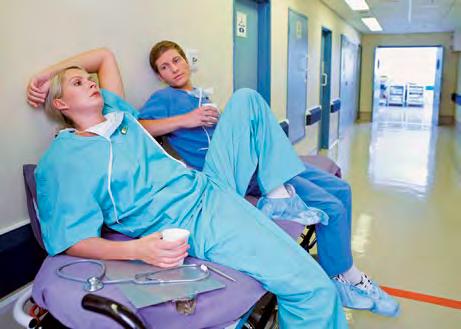
I rarely get the chance to eat properly
doctor, I lost a stone and never really managed to put it back on. So I decided to take advantage of working in a hospital and consult the dietitian, Holly.
“I just wanted your advice,” I began.
“Oh yes, who’s it about?” she asked with the enthusiasm of someone who hasn’t just worked through the night with only three Jaffa Cakes as sustenance.
“Erm, me,” I replied sheepishly, and explained my problem.
“Do you eat breakfast?” she asked. I shook my head.
“Lunch?”
“Sometimes,” I whimpered. I could see where this was going.
124 readersdigest.co.uk january 2014
CHRIS RYAN/OJO IMAGES LTD/ALAMY
“Well that’s your answer: you’re not eating enough for the energy you’re expending.”
I’d worked this much out myself. She smiled at me. “You need to try to find time to eat lunch—and have a proper dinner when you get home.”
I rolled my eyes. That was never going to happen.
“You could try this—it’s a meal in a carton,” she said, handing me a fortified drink for patients who aren’t eating.
Brilliant! She left me with the magic liquid that was going to transform me back to the person I once was. I pierced the top with the straw and took a mouthful. It was like liquid chipboard. It must have taken a lot of work to make something taste that revolting. I wasn’t going to drink that. I’d rather eat more Jaffa Cakes.
A few days later I was paged by nurses worried about Mrs Leslie. She’d been in hospital for months and was feeling very low. I arrived to find Holly sitting on Mrs Leslie’s bed, a few cartons of the fortified drink on her table.
“Oh, Max, just the person. Mrs Leslie hasn’t been eating properly, and I was just telling her she should try some of the build-up drinks. What do you think?” They both looked at me.
“Well, if you take my advice…” I began.
Max Pemberton is a hospital doctor and author. He’s also the resident doctor on ITV’s This Morning
What’s the truth?
The growth of hair and nails requires the sort of complex hormonal regulation that can, of course, only happen when you’re alive. It’s therefore impossible for them to continue to grow once you’re dead.
Yet despite being entirely untrue, this myth has been doing the rounds for decades. In Erich Maria Remarque’s 1929 novel All Quiet on the Western Front, the narrator imagines that, after a friend’s burial, the corpse’s nails grow into a corkscrew shape. The American comedian and chat-show host Johnny Carson once quipped that “for three days after death hair and fingernails continue to grow, but phone calls taper off”.

While funny, this is not true—except about the phone calls.
Where did the myth come from?
It does have some basis in a genuine phenomenon. The dehydration that occurs after death can lead to retraction of the skin—and because this gives the hair and nails greater prominence, it can give the illusion that they’ve grown. In reality, the surrounding tissue has just shrivelled.
so there’s nothing to Worry about?
Let’s be honest, there are plenty of things about death more worrying than whether your hair or nails need a trim. ■
125 january 2014 readersdigest.co.uk
ILL u S TRATED b Y D A v IDH u M p HRIES . COM
the myth? HAIR AnD nAILS kEEp gROWIng AfTER DEATH medical myths— busted!

The one where friends help keep you fit and well

Should auld acquaintance be forgot? Definitely not! Four healthy reasons to have good pals:
1. They may bring down blood pressure. An American study showed a correlation between chronic loneliness and large increases in blood pressure. “A sense of connectedness could quack question
Qhelp slow blood pressure increase,” says the study’s lead author, Louise Hawkley of the University of Chicago. “Satisfying relationships are key.” In other words, cultivate proper mates rather than Facebook friends.
2. They could boost your self-control. Watching someone with good self-control makes you 20 per cent more likely to exercise willpower, according to a study from the University of Georgia.
There is a downside, though. “When you’re facing temptation, remember that how you act also affects those around you,” explains Michelle vanDellen, the study’s co-author. “By giving in, you’re harming the self-control of your friends and family.”
Women who’ve had the HPV (human papilloma virus) jab don’t need to go for cervical screening. True or false?
AFalse. The vaccines against HPV, a cause of genital warts and cervical cancer, are effective only against the four strains most likely to lead to problems. With about 100 HPV strains in all, there’s still a risk of infection, so jab recipients do need regular smears. They may also have been sexually active, and thus exposed to the virus, before vaccination.
3. They might help you avoid breast cancer. A landmark study on rats, again at the University of Chicago, found that social isolation increases the risk of breast cancer threefold. The
126 readersdigest.co.uk january 2014
health With susannah hickling
ericka
mcconnell/the image bank/getty images
men’s
health are you an exercise widow?
Is it a case of New Year, new fitness for your man? Golf, cycling, running and other active pursuits are great for his health— but when they take up too much of his time, resentment can build. That’s when you have to restore balance. Try to understand he’s caught up in his sport, not trying to hurt his loved ones. He probably doesn’t even realise how much he’s away. Tell him you love him and miss him, that you need him
around more and that you worry he lacks balance in his life. Do NOT accuse or argue, but start talking. Or, on the principle that if you can’t beat ’em, join ’em, why not work out with him? Research shows that if you get fit together, you’re more likely to stick to it and—big bonus—have a better sex life.

researchers who carried out the study suggest it’s the increased stress you feel if you’re lonely that may directly feed the growth of breast tumours.
This backs up earlier research showing that nurses with breast cancer who didn’t have close friends were four times more likely to die than those with ten or more friends.
4. Getting fit is more fun. Researchers from Oxford University’s Institute of Cognitive and Evolutionary Anthropology have demonstrated that exercising with two or more people unleashes a flood of endorphins, known for their analgesic and feel-good effect.
While endorphins are released during any workout, not only does group exercise produce more of them, it also enhances their effect, says Emma Cohen, the study’s co-author. This makes fitness more fun, which means longer, harder and better workouts—with seemingly less exertion.
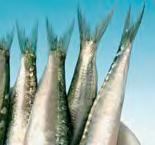
Did you know your body detoxes naturally? It’s what your kidneys and liver are for. So forget faddy cleanse diets (often endorsed by celebs) and do your own detox. All you have to do is stay away from processed foods, sugar and alcohol, and eat lots of healthy proteins (fish, white meat, beans, eggs and dairy), good fats (nuts, oily fish and olive oil), vegetables, fibre and fruit. You’ll look and feel amazing— and you’ll lose weight as well.
InSTAnT detox ►
127 january 2014 readersdigest.co.uk
emilio ereza/getty images; trista welbell/getty images

Almonds are easy protein, but for maximum benefit, chew them well. The smaller the particles, the more easily your body absorbs them. Because they’re so packed with protein and fibre, almonds keep you full. They’re also a great source of magnesium and vitamin E. In fact, a recent study found three servings a week reduced the risk of death from cardiovascular disease by 55 per cent and from cancer by 40 per cent.
For eye health, try kale and walnuts (see the following recipe). Kale contains anti-oxidants that protect against cataracts and macular degeneration. But the antioxidants are fat-soluble and so better eaten with healthy fats such as walnuts.
make laughter
Got plenty left over from Christmas? Why not use them to improve your health?
THE BEST MEDICInE
The third Monday in January is dubbed “Blue Monday” because it’s the day of the year we feel the most miserable. But learn to laugh and you’ll be well prepared for it:
l Treat yourself to a comedy fest. Rent or download your favourite funny films.
l Recall your most embarrassing moments. Then tell them to other people in a funny way. It doesn’t matter if you ham it up. What’s important is that you can laugh at yourself.

autéed kale and toasted walnuts
Toast 75g of walnut pieces in a dry frying pan over medium heat for 2 mins. Remove nuts and heat 1tbs of oil. Add 2 chopped garlic cloves and cook for 2 mins. Add 1 bunch of roughly chopped kale and cook until wilted and tender (about 5 mins). Toss kale with a pinch of salt, 1tbs of balsamic vinegar and the walnuts. Serves 4.

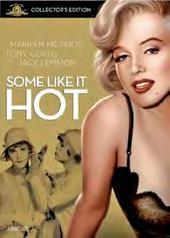
l Read cartoons (we’ve got some crackers in RD). Cut out the ones that remind you of your life and post them on the fridge.
l Put some favourite family photos in a good old-fashioned album and write funny captions for them.
l Learn a new joke every week.
l Add this item to your to-do list: find something to laugh at. Only tick it off when you’ve done it. n
128 health
dimitris stephanides/getty images
FOR MORE TOP health tips
out our special health pages at readersdigest.co.uk/health going nuts FOR nUTS!
Check
readersdigest.co.uk january 2014







If chronic constipation makes you feel like this

Then relief with Peristeen can make you feel like this



Have you suffered from severe symptoms of constipation, such as incomplete emptying of your bowel, discomfort and feeling generally unwell? If these symptoms have lasted for over six months, you’re not alone. There are an estimated two million people in the UK suffering from chronic constipation. Like many of them, you may have tried to improve the situation by making changes to your lifestyle, diet and even taking medication but found limited success. However, there is a different approach. Peristeen is an effective, predictable and dignified system, which can be used, routinely, in the privacy of your home. It’s available on prescription from your doctor.
For an information pack call: 0800 307 7984 or visit: www.my-bowel.co.uk

Putting you in control with Peristeen


Coloplast Ltd, Nene Hall, Peterborough Business Park, Peterborough PE2 6FX CP009
Produced and developed by Coloplast

When rail fares aren’t fair
QI took a train from Glasgow to Manchester with a friend and we bought our tickets at the same time from two different sales assistants at Glasgow Central station. Mine cost £64.50 but when I got on the train I found that my friend had been charged £48. This felt very unfair, but it was too late to complain. So how do we know if we’re being given the cheapest fare?

Aoffered. You’ll be surprised how much you could save.
QI’m nearly at the end of my phone contract and the battery on my smartphone is wearing out. I have insurance but the telephone company says I’m not covered for a new battery. What can I do?
Many journeys can be broken and it’s often cheaper to buy separate tickets for each part of the route. In your case, for example, a single from Glasgow to Preston is £37 and from Preston to Manchester £11—which, as your friend discovered, is less expensive than a ticket straight through.
The salespeople should know this but sometimes they’re lazy—or keen to maximise profits. This is why you should always ask if there’s a cheaper option to the one you’re being
Meanwhile, contact the train provider and request a refund for the difference for that journey to Manchester. I don’t think they’ll give you one, but it’s worth a try.
fAst TIP
The rise of online sales has led to an increase in people refusing to accept parcels for their neighbours, so it’s a good idea to keep your own neighbours sweet. You should certainly accept their parcels too—but you’re allowed to draw the line if they start treating you like a sub-post office.
A Insurance is really something you need to look at when you first agree your contract. Typically, battery failure or weakness is not covered and, typically, you’re never told this when you take the contract out. (You’re rarely told, either, that over the course of a standard two-year contract, the £12–£15 monthly average phone-replacement insurance exceeds the cost of a new phone.) As you’re coming to the end of your contract your best bet is probably to ask the company for a new phone early in return for signing up with them again. ■
Donal MacIntyre is an investigative journalist and a former presenter of ITV’s London Tonight. Please email consumer queries to Donal: excerpts@readersdigest.co.uk
130 readersdigest.co.uk january 2014 consumer With donal macintyre

Mary transferred her policy …and
happy
is!
The 12th
charged
years. The private medical insurance promotion is provided by Freedom Health in association with NDI Insurance & Reinsurance Brokers Ltd who are authorised and regulated by the Financial Conduct Authority with no 446914. Freedom Health is a trading name of Freedom Healthnet Ltd who are authorised and regulated by the Financial Conduct Authority with the registration number no. 312282. 0800 0094 256 www.freedomhealthinsurance.co.uk Great value Private medical insurance • Cancer Cover included • In-Patient Benefit included in all plans • Fully flexible health covers • No hospital list – choice of medical treatment in any UK hospital or abroad • Cash if you choose to get treated on the NHS or use the policy to pay for private treatment. EXCLUSIVE READER’S DIGEST OFFER 3 MONTHS FREE QUOTE CODE: RD001 * An exclusive offer for
look how
she
*
month in each year will not be
for the first 3
money With jasmine birtles

You and your pension
5: When to draw it

“One lump sum or two?”
Pensions are so complicated, and yet so important, that we’re now devoting part of each Money column to a clear, no-nonsense explanation of the whole tricky business
After saving into a pension for decades, it can be tricky to decide when to actually turn it into an income. You can access your pension pot from the age of 55, at which point you can take 25% as a tax-free lump sum. If you’ve stopped working you may need the money straightaway, but if you continue working beyond state retirement age, or choose to work part-time, it may be prudent to wait a while.
Deferring the state pension
If you delay claiming your state pension, you get more money later because for every five
Annuities
weeks you defer, your future allowance goes up by 1%. If you put it off by at least a year, you can choose to receive a lump sum instead, made up of the pension you have not drawn plus interest at 2% above the Bank of England base rate. This is taxable, but only if you’re paying tax on other income that year.
When it comes to drawing a private or workplace pension, most people buy an annuity when they retire (as discussed last month). This is the simplest way to convert a lump sum into an income for life and the biggest benefit is that you know exactly what that income will be. For example, if you have £100,000 and buy an annuity paying 5%, you’ll have an annual income of £5,000 until you die. However, you can’t undo your decision and the big risk is that if inflation spikes, you have no way to increase the income. cartoon by huw aaron
132 readersdigest.co.uk january 2014
MONTHLY GUIDE
OUR
Moreover, the rates on annuities have recently been so poor that many people have been put off taking them out.
Income drawdown
This is an alternative to an annuity whereby you leave money invested and simply draw an income from it. As on any other pension income, you’ll have to pay tax, although you can take 25% as a tax-free lump sum. The income you take is limited to 120% of an annuity income, but if you receive at least £20,000 a year from other pension schemes (including employer final salary schemes and the state pension) you qualify for flexible drawdown and can make as many withdrawals as you like.
There is no age limit on income drawdown, so you can choose to keep investing and, if you die, the remaining fund is passed on to your heirs. At any point you are also free to buy an annuity.
If you do use income drawdown to delay an annuity purchase, it can reap rewards. Say you wait five years, your life expectancy is now five years less and you’ll therefore get a better income from an annuity. You’re also more likely to benefit from an enhanced annuity if your health deteriorates.
Income drawdown is usually recommended to people with larger pension savings because it carries extra costs and risks to your capital, so make sure you speak to an independent financial adviser before you make your decision.
this month’s bargain
Get three months’ supply of fresh, fantastic coffee delivered to your door for the price of two at kopi.co.uk. Kopi is for proper coffee lovers and usually charges £25.35 for three months. But with our offer, at kopi.co.uk/ digst, it will cost just £16.90.

What was once a kids’ hobby now attracts the likes of Nicolas Cage, Jonathan Ross, Ben Affleck and Samuel L Jackson...
In fact it’s become so serious that there’s such a thing as the Certified Guaranty Company, which grades comics from 1 for “fair” to ten for “gem mint”. This global system is a reliable measure of quality and ensures traders get the right price. Older comics rated ten are extremely rare.

HOw DO I kNOw If A cOMIc Is vALUAbLE?
Generally, the older the item, the rarer it is and hence the more valuable.
For instance, a first edition of the Beano, from July 30, 1938, (only 12 known copies left) sold for £12,100 in March 2004. The most valuable comic of all is Action Comics No 1 (June 1938), a copy of which sold for £1.4m in November 2011.
Misprints, recalled editions and promotional issues are usually rare, and so higher in value. But sometimes you’d be surprised at what sells, so don’t
133 january 2014 readersdigest.co.uk
►
make money collecting comics
chuck something out just because you think it’s rubbish.
HOw DO I sTORE THEM? If you want comics to hold their value, the answer is “very carefully”. As with most collectibles, the better the condition, the more you can get for them. If you want to keep your comics in top condition, make sure your hands are clean and dry when handling them, or even wear gloves. Heat, moisture and sunlight can all be damaging.
HOw MUcH cAN I MAkE? A tatty, well-thumbed comic will earn you just a few pounds, even if it’s very old, but you could make £300–500 for special editions (if they’re rare enough) or for job lots.
Professional auction houses sell only the rarest comics—and specialist bookshops aren’t ideal buyers as they have to make a profit so won’t be able to offer you the best prices. An online auction or collectors’ site, though, will give you a good audience and attract serious bidders.
AtomicAvenue.com lets you list the comics you’re selling for free. (It takes a small commission when you make a sale.) You will, though, need a piece of software called ComicBase. It’s free to download and makes the whole process much easier—but if that sounds intimidating, then ComicLink.com offers auction and direct sales services as well, with no downloads necessary.
nine Ways to live on nothing
1. free cinema. Sign up to the website See Film First and you get a chance to see films for nothing before they’re released. Once you have signed up, you’ll receive emails with a screening code that you enter into the website for the tickets. Free Cinema Tickets offers similar preview screenings so it’s worth signing up to both to get as many freebies as you can.
2. free books. Obviously you can get as many free books as you want at the library—but you can also head to Read It Swap It, where you can exchange the ones you’ve already read. This is such a great idea and a brilliant way for people to share costs.
3. free shows. Go to the BBC website for free tickets to their TV and radio shows, and live promotional music events. For shows on other channels, try Lost In TV.
4. free fun for the kids. Get free pictures for the children to colour in from the Disney Print Station online and from CBeebies on the BBC website. There are plenty of other games available there too. And don’t forget that if your kids can earn themselves a Blue Peter badge, they gain free access to hundreds of UK venues.


5. free Uk events. Free-events.co.uk lists the many free festivals, parades, carnivals and other events going on across Britain throughout the year. All In London does the same for free events in the capital.
134 readersdigest.co.uk january 2014
◄
money
6. free cosmetics. If you’re over 18, you could do some cosmetic research online with Clicks Research. It’s really easy: you just try and then review new hand creams, moisturisers and other goodies (and you get to keep them). There are no unnecessary forms to fill in. All you need to provide is your email address, a long-term home address (so they can send you products to review) and a phone number.
7. free money for your children. If you register with online reward scheme
the one thing you must do this month...
...is learn a new skill for the new year. Or at least find out about something new. There are great cheap adult evening courses starting this month all over the UK—where you can also meet people with similar interests. See hotcourses.com for ideas.

KidStart, you get cash back whenever you shop (at most of the famous British retailers) through their website. The money is then put into an account for your kids. You can get other family members to contribute by shopping that way too. It’s free to join, so if you’re going to spend the money anyway, your children might as well benefit.
8. free chores and service. Local exchange trading schemes (LETS) have been set up all over the country to help communities swap their skills. They work by creating units of “currency” that are collected when you provide a service—and then used to “pay” someone to provide a service for you. For example, if you’re a great cook you can bake someone a cake and then use those credits to get someone to do your gardening. Check out LETSLinkUK for more information and to find your nearest scheme.
9. freebie sites. There are lots of websites gathering all these freebies in one place. Freebie Site UK is a good place to start: just put “free stuff” into their search engine and see what comes up!

If you want to learn at home, there are plenty of options too. The BBC offers free online courses in many subjects including languages; Vision2Learn has free courses in computer skills, money management and much more; while OpenLearn, another free online learning site, uses material from Open University courses— great if you want to supplement your education or just get a flavour of the OU.
Pension earmarking. This provides a share of an ex-spouse or ex-civil partner’s pension rights after a divorce. The share is paid when the ex takes their pension benefits. ■
Jasmine birtles is a personalfinance writer and the founder of moneymagpie.com

135 january 2014 readersdigest.co.uk
FOR MORE money advice check out our special pages at readersdigest. co.uk/money
jargon buster
Tasty recipes you can make in just 30 minutes
fresh trout with walnut dressing (serves 4)
2tsp vegetable oil
4 trout fillets, about 175g each ¼tsp paprika
10 walnut halves
125g mixed salad leaves
Try this flavoursome fish dish as a contrast to all stodge at Christmas. The trout is transformed by the nuts and the tantalising dressing. Serve with boiled potatoes to help keep out the January chill
For the dressing:
1 shallot or 2 spring onions
a few sprigs of fresh dill or celery leaves
2tbs spiced rice vinegar or sherry vinegar
6tbs walnut oil
salt and black pepper
1. Preheat the grill to the highest setting. to make the dressing, peel and finely chop the shallot, or rinse, trim and finely chop the spring onions, and place them in a small bowl. rinse, dry and chop the dill or celery leaves and add them to the bowl with the vinegar, walnut oil, salt and pepper. Mix well and set aside.
2. grease the grill pan with half the vegetable oil and lay the fillets on top, skin-side down. season them with salt and paprika. grill the

fish for 5–8 mins on one side only, until the flesh is opaque in the centre and brown at the edges.
3. while the fillets are cooking, heat the remaining vegetable oil in a small frying pan and fry the walnuts, shaking and stirring so they colour but don’t burn. drain on kitchen paper, then chop roughly.
4. rinse and dry the salad leaves and arrange on four plates. lay a fillet on each. stir the dressing, spoon it over the fish, and scatter the walnuts on top. ■
Find more easy-to-cook recipes at readersdigest. co.uk/food
136
photographed by fabfoodpix
fast food love food?

Why suckers really suck, and coping with the cold

QMy friend said I should be wary of “suckers” on my trees. What’s he talking about?
ASuckers are shoots produced from the base or the roots of a tree or shrub, especially if it’s been grafted onto a different rootstock. They often grow quickly, spoiling the shape of the plant—if derived from a rootstock, they can dominate the rest of the plant.
You’ll need to cut off larger suckers as close to the stem or roots as possible. For the best
Suckers rob plants of nutrients, so never give them an even break
results, scrape back the soil and pull them off at source. You can use suckers from ungrafted plants as a method of propagation.
Q
The plants on my patio rarely survive the winter. What’s the best way to fix this?
A
If severe weather threatens, move all containers against a wall, standing them shoulder to shoulder to raise the temperature around the pots. Wrap insulating material, such as bubble wrap, sacking or thick wads of straw, around the pots.
Cover the plants with thick horticultural fleece during very cold spells, but remove this during the day or as soon as the weather improves to avoid fungal disease. Well-protected plants may need watering.
Q I’ve been told that cold weather is bad for my lawn. How can I protect it?
A
The problem that causes most damage in winter is wet, rather than cold. Long
138 readersdigest.co.uk january 2014
gardening
john swithinbank/garden world images
periods of mild, wet weather starve the grass roots of air as they’re trying to grow. During the summer, lawns often develop a compacted layer just below the surface as a result of foot traffic, and this impedes drainage.
The best solution is to spike the lawn with a garden fork or a hollow-tined lawn spiker to get air to the roots. Drive the tines in 15cm deep every 15–20cm.
QI want some begonias for my garden—is this a good time to start growing them in my greenhouse?
AYes, this is the perfect time for kicking off tuberousrooted plants, such as begonias. Fill a tray with moist potting compost and press tubers into this, 5cm apart, so their tops are just above surface level. Make sure they’re the right way up, with the base downwards and the hollowed area uppermost, then water them.
Cut very large tubers in half with a sharp knife to increase the number of plants, but dust the cut edges with yellow sulphur powder as a precaution against rotting. Use a propagator or cover the tray with a clear lid and keep moist at about 13–15C (in a cooler greenhouse delay planting until early spring). When growth appears, pot up the tubers individually.

l Brush snow off hedges and shrubs, as the weight can damage the dense growth.
l Pot up small specimens of early flowering shrubs such as deutzia, hydrangea and viburnum. Stand them in a cool greenhouse for early blooms.
l Continue preparing the ground for new roses. Break down with a fork heavy soil roughly dug in autumn, ready for planting in late winter.
reader’s tip

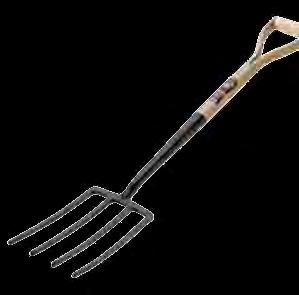

Go to readersdigest.co.uk/contact-us to give us your gardening questions
Frisbees are handy as saucers for pot plants. Their curved rims hold water well, and their varied sizes and colours mean they always look smart. ■
Many thanks to Gillian Parr of Wigan for sending this in
Send us your gardening tips—with photos, if possible. Go to readersdigest.co.uk/contact-us. We’ll pay £50 if we use them on this page.
139 january 2014 readersdigest.co.uk
january checklist
jenny tonkin/nature images/alamy

The tracks of my tyres
We hear a lot about winter tyres these days. In much of Europe, they’re already the norm and in some countries, such as Germany, they’re a legal requirement. But, for a British driver, can getting a second set of tyres really be worth it? The difference is mostly in the rubber. Tyres get their grip from their squishiness. As the temperature drops, normal tyres harden and run over the points of the tarmac rather than sinking in. Winter tyres are softer, so they squish and grip more. Stopping distances are greatly improved in snow and ice—about 10m at 30mph, which is a big

difference. Yet, even with no snow, the increased grip means you’d be safer driving with winter tyres in any conditions below 7C.
Given how expensive tyres can be, buying a second set may sound indulgent—but both sets wear half as fast and so last twice as long. If you do buy
them, they’re usually held for you at a garage, with changeovers in October and April.
My daily drive is a Mercedes C-Class estate—a brilliant car and highly recommended. When I got it, though, I chose a powerful diesel engine and once the cold set in I could feel the rear-driven wheels lose a little grip when I first set off. I enquired about winter tyres and was offered a new set for £1,500. That’s a big outlay, but remember, you can always sell them on with the car. And with the safety benefits, I reckon they’re an investment worth making.
ONE TO BuY licence? What licence?

Caterham Seven 160, £14,995 (in kit form) Looking for a New Year project? How about building a car? You may know Caterham from Formula 1, but it’s been making brilliant stripped-back 60s-style sports racers for years. This is its new entry-level car—priced at £17,995 for the finished article or £14,995 as a kit with instructions. And what a sense of achievement you’d have if you built it yourself.
Officers from the Central Motorways Police Group recently stopped a motorist in the Nechells area of Birmingham only to discover he didn’t have a licence. That’s not so rare, unfortunately. However, in this case it turned out the driver been driving for 40 years without a licence. Makes you wonder why anyone bothers! ■
140
motoring
conor mcnicholas
With
❄ ❄ ❆ ❄ readersdigest.co.uk january 2014













Wish you could shop for a new bladder?
If your days out are being ruined by too many visits to the toilet you may be su ering from an overactive bladder.
Over 7 million people in the UK su er too, so you’re not alone.
Luckily there are treatment options available including e ective medications from your doctor.
To find out more about overactive bladder and the help available visit
www.bladderproblem.co.uk
Or call our free helpline on 0800 011
4766












VES12465UK / Nov 2012

My Great Escape: eating, drinking and being merry


Chocolate, beer and frites— I wonder what attracted us to Bruges! My husband Robert and I loved the “Sleeping Beauty” of Europe. Strolling around Burg Square, with its distinctive tiered, pointed buildings, was like taking a step back in time.
on the ground, we went on a walking tour with a local guide, an interesting and humorous elderly gentleman called Andrew. He took us round all of the major sights, including the Church of Our Lady with its Madonna and Child sculpture by Michelangelo.
Send us a photo of your favourite holiday, tell us briefly what made it so special, and if we include it on this page we’ll pay you £50.
Go to readers digest.co.uk/ contact-us
We travelled to Bruges from Rosyth near Edinburgh, by ferry to Zeebrugge. It was an overnight boat that was like a mini cruise— the interior was quite plush and we had a cabin each way, so we could get a decent night’s sleep.
Once in Bruges, we used a variety of transport. We took a leisurely canal cruise liner and a romantic horse-and-carriage ride, which seemed more in keeping with the surroundings than cars or buses. Feet back
Many of the city’s attractions are culinary: we went to the Choco-Story museum; we also joined the De Halve Maan brewery tour—in both cases, we sampled their wares! The great thing about stopping for a coffee in Bruges is that it often comes with a selection of exquisite chocolates. Very civilised.
As well as a lovely city in its own right, Bruges is a good base for visiting other places. We spent a day exploring coastal towns
142 readersdigest.co.uk january 2014
travel With kate pettifer
macduff everton/the image bank/getty images
Sharon Haston from Falkirk offers a taster of Bruges
such as Ostend, with its dried fish hanging from seafront stalls. We also visited Blankenberge, which was a trip down memory lane for Robert, who’d been there on a school trip. On the day we visited Brussels, the tiny Manneken Pis (the statue of the boy who saved their city by peeing on a fire) was dressed up in an Elvis jumpsuit, marking the anniversary of the King’s death.
We’d love to return to Bruges. next time, I’d like to travel to Lille by train and see Ghent and Antwerp. In fact, I think I’ve just sorted out where to go for our next holiday.
Cresta (0844 800 7019, crestaholidays.co.uk) has two nights in Bruges from £185pp, including return rail travel from london St Pancras.
travel weBSite OF THE MOnTH
iFly.com
Check in, buy duty free, find gate: it’s easy to think that’s all there is to an airport—but iFly.com proves there’s so much more to know. With geekpleasing levels of information about airports worldwide, it’s a good resource for helping you get more out of time between flights. Discover terminal maps and the lowdown on facilities.
Plus, there are details of airport hotels and onward transport— great for planning a stopover.
tHiNGS to do tHiS moNtH go now

The popularity of skiing mini breaks continues to grow, and January is the perfect month to nab a trip at the season’s lowest prices. With only a few days on the slopes, you’ll want a short transfer from the airport: hello, Courmayeur—a romantic Italian resort, 90 minutes from Geneva. Attractive intermediate pistes and a healthy choice of restaurants and bars add to its allure. From £445pp for four nights’ b&b at Hotel Edelweiss (020 7471 7700, skisolutions.com).
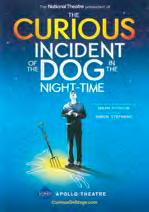
stay now
Take advantage of ticket scheme
Get into london theatre’s annual sale to see a West End show for less. Between January 1 and February 13, shows including Billy Elliot, The Curious Incident of the Dog in the Night-Time, The Lion King, Mamma Mia!, The Phantom of the Opera and Wicked will offer discounted tickets, starting from £10 (0844 581 5050, getintolondontheatre.co.uk).
book now

With the new Year come new travel destinations, but Exodus is the only tour operator offering trips to Bangladesh. Its new cultural itinerary loops the country, starting in Dhaka, exploring Bagerhat’s citadels and tea plantations, and cruising through mangroves in the Sundarban National Park. Departures are in February and April, then the season starts again in October. From £1,999pp for 15 days’ b&b including flights, transport and tour leader (0845 869 9157, exodus.co.uk). ■
143 january 2014 readersdigest.co.uk
The Reader’s Digest
January fiction
The main characters find there’s no escaping the past in two of the month’s best new novels

The Lie
by Helen Dunmore
(Hutchinson, £16.99; ebook, £9.31)
2014 already looks set to be dominated by the 100th anniversary of the First World War. And that certainly includes the books world, where January brings us both a brilliant piece of non-fiction by Mark Bostridge (see Recommended Read overleaf) and this extraordinarily affecting novel by the ever-reliable Helen Dunmore.
The Lie is set in 1920 and narrated by Daniel Branwell who, after fighting on the Western Front, has returned to the Cornish village where he grew up. Being home again, Daniel tells us, “is what we dreamed of, in France”. But now that he is, he can’t escape the piercing memories of what he saw, especially the death of his boyhood friend Frederick. Indeed, the only person he can bring himself to spend any time with is Frederick’s sister Felicia, who’s mourning her husband as well as her brother.
The flashbacks to the war—and the eventual revelation of how Frederick died—are as crunchingly powerful as you’d expect. Even so, what’s most heartbreaking about the novel is the hesitant, awkward
BY JAMES WALTON
James Walton writes and presents the BBC Radio 4 literary quiz
The Write Stuff
?

name the author Answer on page 148
Can you guess the writer from these clues (and, of course, the fewer you need the better)
1. He’s the only ever winner of the Nobel Prize for Literature to have written for The Dick Emery Show.
2. He was born in London in 1930, the son of an East-End tailor.
3. His plays include The Caretaker and Betrayal.
intimacy between Daniel and Felicia. By the end, and without ever losing their vivid individuality, these two bewildered characters in rural Cornwall have somehow come to represent an entire country in a state of traumatic shock.
The Days of Anna Madrigal
by Armistead Maupin (Doubleday, £18.99; ebook, £14.39)
Armistead Maupin’s Tales of the City series was one of the biggest worldwide literary hits of the 1970s and 80s. The early books brought those of us who’d led more sheltered lives an authentic blast of San Francisco in its hedonistic heyday. The later ones were darkened by the coming of Aids. In both cases, however, Maupin’s warmth towards his characters, and the sheer generosity of his story-telling, meant that millions of readers felt a genuine love for his cheerfully unconventional cast.
January paperbacks
Return of a King: the Battle for Afghanistan by William Dalrymple (Bloomsbury, £9.99) At first it seemed a successful invasion, until a jihad was declared and rural tribesmen ended up forcing the British army into retreat. All of which may sound familiar—except that this is a book about the war of 1839.
Life after Life by Kate Atkinson (Black Swan, £7.99)
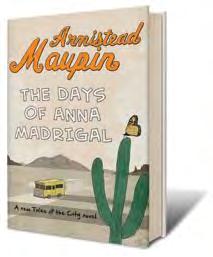
Now, in one of his occasional updates, Maupin gives centre stage to perhaps the most lovable of them all: Anna Madrigal, the books’ wise, funny and, as it turned out, transsexual mother figure. At 92, Anna could be forgiven for taking things a little easier. Instead, she makes a trip to her childhood home to tackle some unfinished business.
Admittedly, a stern critic might wonder if Maupin loves Anna a bit too much these days—along with the rest of the old gang, who even in their sixties, retain a winning sense of adventure and romance. Yet Tales of the City fans, I suspect, wouldn’t want it any other way.
Epic tale of the many possible lives of a woman called Ursula Todd—and quite possibly the best hardback novel of 2013.
The Plantagenets by Derek
Wilson (Quercus, £9.99)
Readable and concise history of “the kings who made Britain”. Perfect for fans of The White Queen
Salt, Sugar, Fat: How the Food Giants Hooked Us by Michael Moss (W H Allen, £8.99)
Thoroughly researched— and therefore especially chilling—investigation into the junk-food industry.

The Storyteller by Jodi Picoult (Hodder, £7.99) The globally bestselling Picoult (left) takes on the emotional scars of the Holocaust in what’s generally agreed to be her most powerful novel so far. ►
145
Tangoing towards tragedy
How almost nobody in Britain—including the Government—saw the First World War coming, even when it was only weeks away
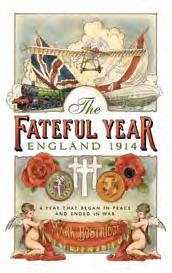
In his New Year’s message for 1914, the Archbishop of York, Cosmo Lang, warned that it “may well prove a very fateful year in the history of our land”. At first sight, this seems a chillingly accurate prediction. Lang, though, wasn’t considering the possibility of a war with Germany. He was simply expressing the national anxiety about industrial unrest and the situation in Ireland where Unionists in the north were preparing to fight Home Rule. In fact, the most striking aspect of the first half of Mark Bostridge’s eyeopening chronological survey of 1914 is the almost total lack of foreboding about the coming cataclysm. On January 1, David Lloyd George, chancellor of the exchequer in Herbert Asquith’s government, cheerfully claimed that “our relations with Germany are infinitely more friendly than they have been for years”.

In other words, life carried on as usual—which is why the book’s early chapters can range so wildly. One major controversy in January, for example, was the rise of the tango, a dance embraced by London’s smart set, but denounced by the Vatican as “an outrageous, indecent, heathen… assassination of family and social life”. April saw the first night of Shaw’s Pygmalion, when rumours that the word “bloody” was to be used on stage caused the biggest traffic jam in London’s West End since the Coronation of 1911. Bostridge seems to have read

boStrIDge’S ChoICe of faVourIte ww1 LIterature
“Adlestrop”
by Edward Thomas (1915) Few of Thomas’s poems deal directly with the war, but they’re filled with a love for England, and the desire to protect it, that war had instilled in him. “Adlestrop” is a fragile remembrance of the English countryside in summer 1914.
The Crowded ST ree T
by Winifred Holtby (1924) A defining moment in this novel about a young woman’s struggle for independence
146 readersdigest.co.uk january 2014
RD’s RECOMMENDED READ
r D e XC Lu SIV e : mark
►
almost every eye-witness account from the time, and his sharp eye for telling details continues after war begins on August 4— including the fact that the shock news led to a sudden increase in premature babies. Yet once the scale of the disaster becomes clear (the book also demolishes the myth that anybody thought the war would be over by Christmas), this only adds more power to the little-did-they-know dramatic irony of those early sections —an irony which continues even after the assassination of Archduke Franz Ferdinand and his wife in Sarajevo on June 28:
Two days after the assassination, Sir Arthur Nicolson, the permanent undersecretary at the Foreign Office, asserted his view of the relative calm in international waters, writing to the British ambassador in St Petersburg that, ‘The tragedy which has just taken place in Sarajevo will not, I trust, lead to further complications.’
The same day, Asquith gave his ‘obituary on the Austrian royalties’ in the Commons, expressing the ‘indignation and deep concern’ of the House at the murders. The Archduke and his wife had visited Britain as recently as the previous November, as guests of King George and Queen Mary at Windsor Castle. ‘Never have such exalted guests [received] a more cordial welcome from the great British public,’ the Daily Chronicle had remarked at the time.
In the days that followed, the rumours of planned Austrian action against Serbia created a certain uneasiness in the British press, with the Morning Post on July 6 going so far as to predict that the Austrian response might lead to a ‘European war’. After that, though, things settled down considerably, and Sir Arthur Nicolson once more wrote that he didn’t expect anything to come of the affair. Drawing a line under it all, the Daily Mail noted with supreme confidence that Emperor Franz Joseph ‘may be trusted to handle the situation wisely’.
You cannot be serious: a 1914 cartoon plays the early wartime recruitment for laughs

The Fateful Year: England 1914 by Mark Bostridge is published by Viking on January 2 at £25; ebook, £14.99 ‘‘ ►
At Kiel Yachting Week, in northern Germany, at the end of June, a squadron of the British Fleet, consisting of four battleships and three cruisers, had anchored alongside the German Imperial High Seas Fleet. The Kaiser donned the
147 january 2014 readersdigest.co.uk
“We are within measurable, or imaginable, distance of a real Armageddon,” thePrime Ministerwrote toafriend
uniform of a British Admiral of the Fleet and boarded the battleship King George V, where German officers received a cordial welcome from their British counterparts.
And with that, the government returned to the biggest issue of the time: how to avoid civil war in Ireland. A conference—called by the King and involving all the interested parties—began at Buckingham Palace on July 21. It ended in failure three days later. But then, as Bostridge puts it, “the unexpected suddenly intervened”:
On July 24, after Asquith had reported to the cabinet on the winding-up of the conference, ‘the quiet grave tones’, as Winston Churchill recalled them, of [foreign secretary] Sir Edward Grey’s voice were heard, reading from a document brought to him from the Foreign Office. It was Austria’s ultimatum to Serbia, demanding a series of humiliating concessions. In Grey’s opinion, this was ‘the most formidable document ever addressed by one State to another’. In Churchill’s later memorable words, ‘The parishes of Fermanagh and Tyrone faded back into the mists and squalls of Ireland, and a strange light began…to fall and grow upon the map of Europe.’
Asquith recognised immediately that this was the most dangerous situation in Europe for 40 years. ‘We are within measurable, or imaginable, distance of a real Armageddon,’ he wrote to a friend, ‘which would dwarf the Ulster and Nationalist Volunteers to their true proportion.’ It meant ‘almost inevitably’ that Russia would come to the defence of Serbia, and that, should this be the case, it would be difficult ‘both for Germany & France to refrain from lending a hand to one side or the other.’ It was, he admitted, a ‘blood-curdling prospect’; but he went on to add, ‘Happily, there seems to be no reason why we should be anything more than spectators.’

an D the name of the author I S … Harold Pinter (whose other TV writing credits include Beryl Reid Says Good Evening and But Seriously—It’s Sheila Hancock).
is provided by the German navy’s shelling of Scarborough, based on Holtby’s own memories of the bombardment in December 1914.
Parade’ S e nd by Ford Madox Ford (1924–28) Four novels that brilliantly depict the changes in British society brought about by the war.
Journey’ S e nd
by R C Sherriff (1928) The revival of Sherriff’s play in recent years demonstrates the continuing appeal of the ultimate trench drama. Through his portrait of life in a British dugout, Sherriff dramatises the conflict between idealism and the realities of war.
Te STamen T of you T h
by Vera Brittain (1933) A searing autobiography about wartime loss and the experiences of an army nurse. Following the deaths of her closest male peers, Brittain determines to work for peace to ensure that their sacrifice won’t be in vain.
148 readersdigest.co.uk january 2014
◄ ’’
◄
‘‘ ’’

Books That Changed My Life
Best-selling author Wendy Holden worked as a journalist before writing her first book Simply Divine. Her 12th novel, Gifted & Talented, is out in paperback this month.

The Story of My Life
by Enid Blyton
By the time I came upon Enid’s autobiography, at the tender age of ten, I’d read practically every single book she’d written and I adored them. So to read all about her life, and admire the glamorous photos of her and her handsome husband playing tennis, and her girls with their shiny ponies, was tremendously exciting.
I remember she explained how she wrote her books: “I sit in my chair and shut my eyes and, hey presto, the story appears all ready and complete.” I thought, It sounds so easy, I want to be a writer too! It was only when I started writing for a living that I realised it doesn’t work quite like that…
Testament of Youth
by Vera Brittain
This memoir, published in 1933, is about Brittain’s early life in provincial Derbyshire, her determination to get to Oxford University against the odds and her time as a nurse in the First World War. It’s a feminist classic and I lapped it up as a teenager, swept up in the big themes the book embraced—it’s very romantic and very sad. Her fiancée, friends and brother all die in the war, and the impact of those tremendous losses, both for her and women across the country, led her to become a committed pacifist. I admired her so much.

Rivals
by Jilly Cooper

Until I’d read Jilly Cooper, I hadn’t realised that romance could be laugh-out-loud funny. She has an incredible ability to make her heroines immensely interesting because of their character flaws, yet always sympathetic to the reader. I’d read all her early romances, but Rivals was the first of her massive novels that stepped up a gear; the humour was sustained over more than 500 pages and her deep love of English literature is evident throughout the book— the gorgeous Declan O’Hara is always quoting Yeats. I love the way Jilly is confident enough to be both funny and literary. Comic writing is very hard to do well. I think she’s brilliant. ■
149 january 2014 readersdigest.co.uk
As told to Caroline Hutton









SHOPPING DIRECTORY 150 Beautiful Clothes 01844 344811 www.AmberBayFashions.co.uk CLEARVIEW STOVES Britain’s leading manufacturer of clean burning wood stoves Powered by nature STOCKISTS THROUGHOUT THE UK www.clearviewstoves.com Brochure Line: 01588 650 123 Dinham House, Ludlow, Shropshire, SY8 1EJ. Tel: 01584 878 100 Transform your existing staircase in as little as 48 hours A convenient and affordable alternative to the drama of having your staircase demolished and replaced. Disruption and mess are kept to a minimum. Our professional teams aim to complete most projects in one to two days. classic styles Call us NOW on 0845 164 5191 staircase-renovations.co.uk Readers Digest 26th November 77x114mm.indd 1 22/11/2013 17:20








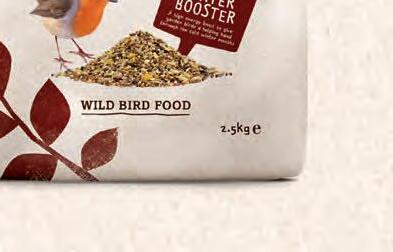





















To advertise on these pages please contact Nick Page Tel: 07789178802 Email: nick.page@madisonbell.com 151 DELIVERED SAVE £1 2 . 5 0 on 1 2 . 55 kg bags of Winter Booster. Enter code DIGEST at checkout* 5 0% OFF WINTER BIRD FOOD Wild Bird Food £ 2 4. 99 £12 .4 9 More great offers online. 10% OFF fat balls for a limited time only Find out more and order online at birdsandbees.co.uk or call 0 8 44 5 77 2 8 2 8 *Valid until 3 1 /01 /2 01 4 . New customers only. Maximum 1 discounted bag per customer. £3.50 delivery charge. Birds & Bees is the
of a 10
to
our
the
a
for
150
the farm,
colder
result
year project
transform
farm in
Cotswolds into
haven
nature, creating over
acres of new wildlife habitat. On
we’ve planted 10 living bird tables, a mix of plants that continue to provide food for birds through the
months. At home, you can put out Birds & Bees Winter Booster, specially created with high energy cereals from our farm. “I’m delighted to be supporting Birds & Bees. Together we are helping not just the wildlife in our gardens, but supporting farmers who ensure their farms are wildlife friendly too.”
Kate Humble. Wildlife & Science TV Presenter
GOOD NATURED BIRD FOOD 8 HIGH ENERGY GRAINS AND SEEDS 50%OFF
Rob Allan. Countryside Farmer of the Year, 2012
Laugh!
win £50 for every reader’s joke we publish. Visit readersdigest.co.uk/ contact-us or facebook.com/readersdigestuk
¶ The regular tester In an alcohol factory died. The boss advertised the position, and a raggedlooking drunk came to apply the next day.
The boss, wondering how to send him away, gave him a glass of wine to identify.
“It’s a Muscat, three years old, grown on a north slope, matured in steel containers,” said the drunk.
“That’s right!” said the boss, handing him a different glass.
“It’s a Cabernet, eight years old, a south-western slope, oak barrels,” said the drunk.
“Correct again!” said the boss, astonished. Smiling, he whispered to his secretary, who slipped out of the room and returned with a glass of urine.
The alcoholic tried it, paused for a moment, then gave his verdict: “It’s a blonde, 26 years old, three months pregnant, made inside the office. And if you don’t give me the job, I’ll tell you who’s the father.”
Elfas Kaneba, by email
¶ My local drama society put on an evening of Triple-X Roman plays. I thought it sounded really sexy, so I went along.
It was just 30 plays.
Comedian Chris Turner

“That’s the trouble when you visit your parents—no matter how old you are, they end up treating you like a child again…”
¶ The devil visiTs a salesman. he Tells him, “I can make you richer, more famous and more successful than any salesman alive. In fact, I can make you the greatest salesman that ever lived.”
“And what do I have to do in return?” asks the salesman.
The Devil smiles. “Well, you have to give me your soul, of course,” he says, “but you also have to give me the souls of your children and the souls of your children’s children. As a matter of fact, you have to give me the souls of all your descendants throughout eternity.”
“Wait a minute,” the salesman says, cautiously. “What’s the catch?”
Seen on Reddit
152 readersdigest.co.uk january 2014
¶ I overheard a lady saying she’ll apply make-up on the train.
I think it’ll still look like a train.
Comedian Milton Jones
A husband texts his wife on a cold winter’s morning: “Windows frozen.” The wife texts back: “Pour some lukewarm water over it.” The husband texts back five minutes later: “Computer completely broken now.”
Seen on 9GAG.com
The Trouble wiTh
I know a guy who has one eye bigger than the other. His name is Iain
Seen on the internet
i wish i knew who kicked the jack out from under the car i was working on. The suspension is killing me
Stephen Hughes, South Wales
january by josh widdicombe
Award-winning comedian Josh Widdicombe is 5ft 6.5in tall, and his favourite TV show is The Simpsons. Each month, he lets us know just exactly what his problem is.
So here we go with another year, a fresh start and away we go. That’s the kind of thing we’re supposed to say, at least. The thoughts we’re meant to be thinking in January. Sadly, the reality is most of us are just thinking, It’s cold. And dark. And wet.
This is the problem. January is meant to be the beginning of an exciting new year, but it just happens to fall in the middle of the bleak British winter. It feels less like a new
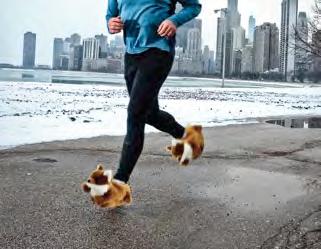
start and more like a wake for the last 12 months.
How am I meant to turn over a new leaf when I’m being told to stay inside as a storm is on its way? How am I meant to embrace a new love of jogging when it feels like it gets dark at 2pm?
The only thing that’s positive in January is a whole new season of TV, and that’s not going to help me become a new dynamic self—unless my New Year’s resolution is to really break in my new pair of slippers. I suppose that isn’t such a bad idea.

153 january 2014 readersdigest.co.uk
►
The camera never lies?
With the property market heating up, sellers want to present their homes at their best. But terriblerealestateagentphotos.com demonstrates that not everyone is up to the task:

If he still hasn’t finished his crossword, he comes with the house

In tribute to mime artists the world over, we publish this without comment

1. Take a normal bedroom shot. 2. Superimpose stock imagery of a laughing woman. 3. Ask yourself why you thought that was in any way necessary

The dedication of some agents has to be admired. Particularly the ones who continue to work even as they lapse into unconsciousness

A rare action shot: a flight of stairs expertly captured by someone in the process of falling down them
154 readersdigest.co.uk january 2014
¶ The key to life is to meet someone beautiful who’s aroused by failure.
Comedian Frankie Boyle
¶ A well-off couple are on the deck of a luxury cruise liner, admiring the scenery. As they cruise past a small island, a man in ragged clothes with a long beard appears on the beach, waving a white cloth and shouting himself hoarse.
“Who’s that?” they ask the captain.
“I’ve no idea,” he replies, “but every year, as we sail past, he goes absolutely bonkers.”
Joseph William Stokoe, Durham
¶ What do you get if you cross a rhino with an elephant?
I don’t know, but it’s not relevant. Seen on the internet
¶ Someone keeps adding soil to my allotment overnight, but it’s an absolute mystery as to why.
The plot thickens.
Jason David, New Barnet, Hertfordshire
60-Second Stand-Up
ladies and gentlemen, please welcome hal Cruttenden
whaT’s The favouriTe of your own jokes?
A Scottish friend said to me: “Whenever the English are playing football, we support the opposition.” I replied, “We do the same to you—we just never know when you’re playing.” That always goes down well in Scotland, for some reason.
besT GiG you’ve ever done? Probably Live at the Apollo on TV. When you go onstage, the whole area fills with smoke, so you can’t see the audience or the edge of the stage. It’s like they’ve done everything they can to make the experience terrifying. But it’s the only gig where I’ve lain in bed afterwards thinking, I’m a star, I’m a star!

hal Cruttenden’s Tough luvvie tour is on until June 6. For details, go to halcruttenden.com
funniesT ThinG ThaT’s ever happened To you?
My wife punched me in the face about a minute after our second child was born. I’d made the comment, “Oh, that was easy—we could have billions!”
favouriTe Tv show?
I prefer American shows to British ones—they’re less likely to contain people I know, so I don’t get jealous. I think Modern Families (Sky) is one of the best sitcoms ever. My kids love it too, because there’s a fat, camp character called Cameron (above), who I apparently resemble.

finally, who’s your comedy inspiraTion?
Seeing Eddie Izzard 20 years ago persuaded me I could do stand-up. I felt I was too posh, fey or middle-class for the lad culture of the Nineties, but Eddie Izzard made me think, He doesn’t have to explain himself—he just does his stuff. n
155 january 2014 readersdigest.co.uk
RD Brain Teasers
Grab a cup of tea and a biscuit and bend your mind to these six puzzles, ranging from the mildly puzzling to the pen-chewingly fiendish
dice tower
Four dice are stacked one on top of the other. What is the total value of the three pairs of hidden faces in the stack, given that the top face is a 6 and the bottom face is a 3?
wedGes
Which four of the pieces below can be fitted together to form a perfect square?

sudoku To win, you have to put a number from 1 to 9 in each outlined section so that: • every horizontal row and vertical column contains all nine numerals (1–9) without repeating any of them • each of the outlined sections has all nine numerals, none repeated. If you want even more of a challenge, try timing yourself too.
156 readersdigest.co.uk january 2014
A B D E C difficulty HHH
january 2014 readersdigest.co.uk 157 Across 1 Grumble (4) 3 Congregate (4) 5 Fragrance (5) 6 Fossil fuel (4) 8 Away (6) 10 Type of pasta (9) 13 Bright (6) 15 Dreary (4) 16 Hospital worker (5) 17 Split (4) 18 Stage drama (4) swersAN :scrosA 1 Moan 3 Meet 5 Aroma 6 Coal 8 Absent 10 Spaghetti 13 Clever 15 Drab 16 Nurse 17 Rift 18 Play N:dow 1 March 2 Nail 3 Mass 4 Trite 7 Ample 8 Abhor 9 Enter 11 Scour 12 Ebony 14 Vent 15 Deep het missing film is: Moulin Rouge! dowN 1 Parade (5) 2 Metal pin (4) 3 Church service (4) 4 Banal (5) 7 Plenty (5) 8 Detest (5) 9 Come in (5) 11 Scrub clean (5) 12 Black wood (5) 14 Air duct (4) 15 Far down (4)
Can you complete this
If you do it correctly, the coloured squares will reveal the name of a stylish film. 1 2 3 4 5 6 7 8 9 12 13 14 15 10 11 16 17 18 ►
coNcise crossword
crossword?
* Entry is open only to residents of the UK, Channel Islands, Isle of Man and Republic of Ireland aged 18 or over. It is not open to employees of Vivat Direct Limited (t/a Reader’s Digest), its subsidiary companies and all other persons associated with the competition.
iN the tub
A piece of metal is placed in a plastic tray that’s floated in a bath full of water. The metal is then taken out of the tray and dropped in the water. Does the water level rise, fall or remain the same?
Answers
and the water level rises. The amount by which it rises corresponds to the volume of the metal, very much less than the volume of an equal weight of water. The net result is, therefore, a fall in water level.
ni the tub: The water level falls. When the metal is taken out of the bowl, the bowl displaces less water, hence the water level falls by an amount corresponding to the volume of water equal to the weight of the metal. When the metal is dropped in the water, it displaces its own volume of water
solved it within: 15 minutes, you’re a true expert; 30 minutes, you’re no slouch either; 60 minutes or more, maybe numbers aren’t your thing.
udoku:s If you

£50 prize question
(answer published in the February issue)















how many flowers are needed to balance scale c? A c b ?




The first correct answer we pick on January 3 wins £50!* Email excerpts@readersdigest.co.uk
Answer to december’s prize question:
Each circle has a value of 13, each square a value of 6, and each star a value of 7, so 7 stars are needed to balance scale C.
of a dice always add up to 7, the total must be (4x7) - 6 - 3 = 19.
iced tower: 19. Since the opposite faces
edges:w A, C, D, E. FoR

And the £50 goes to… Steve Gale from Leicester

158 readersdigest.co.uk january 2014
MoRE puzzles…
go to readersdigest.co.uk/ fun-games



Beat the Cartoonist!
w I n £100 and a Cartoon pr I nt

Think of a witty caption for this picture and you could beat the experts at their own game. The three best suggestions will be posted on our website in mid-January alongside an anonymous caption from our professional cartoonist. Visitors can choose their favourite— and if your entry gets the most votes, you’ll receive £100 and a framed copy of the drawing. Submit to captions@readersdigest.co.uk or readersdigest.co.uk/caption by January 10. Vote online at readersdigest.co.uk/caption. We’ll announce the winner in our March issue. n
november’s winner

It’s not getting any better for the pros. Cartoonist Percival’s original caption, “Great dinner party!” was trounced this month by reader Frank Murphy’s contribution, “I would have preferred a doggy bag,” which attracted more than twice the number of votes. Another line in the sand for the amateurs, then.
scoreboard readers 17 cartoonists 6
In next month’s issue
what would the world look like if steve Punt was in charge?
• valentine’s special: Jayne tor vill on the 30th anniversary of “ bolero”



• Heart health— we have all the latest research PLUS ten foods for good skin

steve ullathorne
facebook.com/readersdigestuk pinterest.com/readersdigestuk twitter.com/rdigest
Immunace® has been developed by Vitabiotics’ pharmacists and leading scientists in nutritional research to help maintain all round health and vitality, whilst providing specific nutrients such vitamin C, zinc and selenium which contribute to the normal function of the immune system
Immunace® Extra Protection is an advanced formula that includes all the benefits of Immunace® Original plus more, with 1000 IU vitamin D.













Immunace® Original Immunace® Extra Protection
your immune system ADIMMCONP 04-10-13E with 1000 IU Vit. D
, Superdrug, Holland & Barrett, Waitrose, Lloydspharmacy, chemists, health stores & www.vitabiotics.com Supplements may benefit those with nutritionally inadequate diets. † Professor Beckett is not cited in the capacity of a health professional, but as a product inventor and former Chairman of Vitabiotics. *(IRI value data. 52 w/e 13 Jul, 13).
Formulated by Vitabiotics experts with vitamin D to support the normal function of
From









































 Author and BBC4 Review Show critic Natalie Haynes on the new
Author and BBC4 Review Show critic Natalie Haynes on the new


































 Words by Emily Cox and Henry Rathvon
Words by Emily Cox and Henry Rathvon






























































 by lisa fitterman
by lisa fitterman































































 Logan Hampson
Lynn Hampson
aLyson Hampson
jason Hampson
Logan Hampson
Lynn Hampson
aLyson Hampson
jason Hampson


























































































































































